

University Admission Application Letter (with Samples & PDFs)
I have listed sample templates to help you craft an effective and professional university admission application letter.
Also, I would like to point out that you can also download a PDF containing all the samples at the end of this post.
Successful Application Letter for University Admission
First, find the sample template for university admission application letter below.
Subject: Application for Admission to [Name of the Course]
Respected Sir/Madam,
I have recently completed my [last educational qualification] from [Name of School/College] with an aggregate of [Your Percentage/CGPA], and I am eager to further my studies in the field of [Field of Study]. I believe that studying at [Name of the University] will provide me the right knowledge, skills, and exposure to excel in this field.
I am particularly drawn to the [Name of the Course] at [Name of the University] because of its reputation for providing high-quality education and its focus on practical learning. I am confident that this course will help me achieve my academic and career goals.
Enclosed with this letter are my mark sheets, certificates, and other required documents. I kindly request you to consider my application and provide me with an opportunity to prove my potential and contribute to the university.
I am looking forward to being a part of your esteemed institution and assure you that I will put in my best efforts in all my endeavours.
Thank you for considering my application. I am eager to hear from you soon.
[Your Full Name] [Your Contact Information] [Your Email Address]
Below I have listed 5 different sample applications for “university admission application letter” that you will certainly find useful for specific scenarios:
Crafting a Persuasive University Application Letter to Showcase Leadership Skills

Subject: Application for Admission to [Desired Course Name]
I have consistently excelled in my studies, but more importantly, I have taken the initiative to lead and guide my peers through various activities. As the Head Boy/Girl of my school, I’ve learned to inspire and motivate my fellow students, organize events, and address issues efficiently. These experiences have honed my leadership abilities and have taught me how to balance my academic commitments with extracurricular responsibilities.
I played a pivotal role in initiating a ‘Clean Campus Drive’ in my school, where I led a team of students to maintain cleanliness and fostered a sense of responsibility among them. This initiative not only improved the school environment but also instilled a sense of community and teamwork among the students.
If given the opportunity to join [University Name], I assure you that I will bring these leadership qualities to contribute positively to the university community. I am eager to leverage my experiences to participate actively in student-led initiatives and further develop my leadership skills.
I am confident that [University Name] is the perfect platform for me to grow not just acadically but also as a leader. I humbly request you to consider my application favorably. I look forward to the opportunity to be a part of your esteemed institution.
Yours Sincerely, [Your Full Name], [Your Contact Information].
Writing a Compelling University Application Letter Highlighting Athletic Achievements

Subject: Application for Admission and Highlighting Athletic Achievements
I hope this letter finds you in the best of health and spirits. I am [Your Name], a student from [Your School Name], [Your City], intending to apply for the [Course Name] at your esteemed university.
Academically, I have consistently performed well, securing a GPA of [Your GPA] in the previous year. However, I am not just a diligent student in the classroom, but also a passionate sportsperson. I believe my athletic achievements will contribute to the vibrant sports culture at your university.
I am enthusiastic about bringing the same dedication and spirit to your esteemed university and contributing to its athletic teams. I am certain that the comprehensive education and diverse opportunities provided by your university will help me grow, both acadically and athletically.
I am hopeful that you will consider my application favourably. Thank you for considering my application. I am looking forward to the possibility of becoming a part of your prestigious university.
Articulating Academic Excellence in a University Admission Application Letter

The Dean of Admissions, [University Name], [University Address], [City], [State], [Pin Code]
Subject: Application for Admission
I have always been passionate about [subject(s) related to the course], and I am confident that my academic achievements reflect this. I have consistently maintained a high academic standing in my schooling years, ranking in the top [percentage/rank] of my class. My teachers have commended me for my dedication and commitment to learning, which is evident from my grades and participation in various academic competitions.
Your institution, with its exemplary faculty and state-of-the-art facilities, stands as the ideal platform for me to deepen my knowledge and broaden my horizon. I am particularly drawn to the [mention specific aspects of the course or university that attract you], and I am confident that these will provide the right environment to nurture my academic and personal growth.
I am committed to maintaining my academic excellence and contributing positively to the university community. I am hopeful that I will be given the opportunity to bring my passion, dedication, and academic prowess to your esteemed institution.
Yours Sincerely, [Your Name] [Your Address] [City, State, Pin Code] [Email Address] [Phone Number]
Tailoring a University Application Letter to Highlight Community Service Experiences

Dear Sir/Madam,
I am writing this letter to express my keen interest in the [Course Name] program at your prestigious institution. I have always been intrigued by [Subject Name], and I am eager to explore this field under the guidance of the accomplished faculty at [University Name].
I am certain that these experiences will enable me to contribute to the diverse community at [University Name]. I am eager to bring my commitment to service and dedication to learning to your campus, and I look forward to the possibility of contributing my skills and experiences to your distinguished institution.
[Your Name] [Your Contact Information]
Penning a University Application Letter Expressing a Deep Passion for a Specific Field of Study

Subject: Application for Admission in [Specific Field of Study]
My passion for [Specific Field of Study] was kindled during my school years, when I found myself fascinated by [Mention something specific about the field that fascinated you]. Since then, my curiosity and interest in this field have only grown. I have spent countless hours learning and honing my skills, and now I aspire to take this passion forward and delve deeper into this field at a university level.
I assure you of my utmost commitment and dedication towards my studies, and I am eager to make the most of the opportunities offered at your prestigious institution. I am hopeful that you will consider my application favorably.
[Your Full Name] [Your Contact Information]
How to Write University Admission Application Letter
Related Topics:
I am sure you will get some insights from here on how to write “university admission application letter”. And to help further, you can also download all the above application samples as PDFs by clicking here .
Leave a Reply Cancel reply


How to Write Motivation Letter for University with Examples
Table of Contents
University applications can be stressful and daunting, but one of the most important parts of the process is writing a motivation letter that stands out from the rest. A motivation letter is a crucial part of your application that can make or break your chances of getting accepted. It gives you the opportunity to showcase your personality, skills, and passion for the subject you are applying for. Crafting a perfect motivation letter that can impress the admission committee can be challenging, but with the right guidance, you can create a letter that will put you ahead of the competition. In this blog post, we’ll provide you with some tips and tricks on how to write an impressive motivation letter that will help you achieve your goals and get accepted into your dream university.
Purpose of a Motivation Letter:
A motivation letter serves as a crucial component of your university application, offering you the opportunity to showcase your personality, aspirations, and suitability for the program you are applying to. It goes beyond listing your achievements and qualifications, providing the admissions committee with insight into your character, interests, and goals. The purpose of a motivation letter is to convey your passion for the subject you wish to study, your reasons for choosing the specific university or program, and how your background and experiences have prepared you for success in your academic pursuits. It allows you to demonstrate your communication skills, critical thinking abilities, and commitment to furthering your education.
Researching the University and Program Requirements:
Before diving into crafting your motivation letter for university, it is crucial to thoroughly research the specific requirements of the university and program you are applying to. Each educational institution has its own unique values, goals, and academic standards that they look for in prospective students. Start by exploring the university’s official website to gather information about their mission statement, academic programs, faculty members, research opportunities, and any special initiatives they may have. Understanding the university’s educational philosophy and culture will help you tailor your motivation letter to demonstrate how you align with their values and goals. Additionally, delve into the specific requirements of the program you are applying to. Pay close attention to the course curriculum, research areas, and any specific skills or qualities they are seeking in applicants. Highlighting how your academic background, skills, and personal experiences align with the program’s requirements will make your motivation letter stand out. By conducting thorough research on the university and program requirements, you will be able to customize your motivation letter to showcase your genuine interest in the institution and demonstrate why you are a strong candidate for admission.
Structuring Your Motivation Letter Effectively:
Structuring your motivation letter effectively is crucial in making a strong impression on the admissions committee. Begin by introducing yourself and stating the purpose of the letter clearly. Share your enthusiasm for the program and explain why you are passionate about pursuing studies in that particular field. In the body of the letter, highlight your relevant experiences, skills, and achievements that make you a strong candidate. Use specific examples to demonstrate your qualifications and showcase your unique strengths. Make sure to align these experiences with the program’s requirements and emphasize how they have prepared you for success in the chosen field of study. In the closing paragraph, reiterate your interest in the program and express your gratitude for the opportunity to apply. End on a positive note, emphasizing your enthusiasm for contributing to the academic community and your commitment to academic and personal growth. Remember to proofread your motivation letter carefully to ensure it is well-structured, error-free, and effectively conveys your motivation and qualifications to the admissions committee. A well-structured motivation letter will set you apart from other applicants and increase your chances of success in the university application process.
Crafting a Compelling Opening Paragraph:
Crafting a compelling opening paragraph is crucial when writing a motivation letter for university. This is your opportunity to grab the reader’s attention and make a strong first impression. Start with a hook that immediately captures the reader’s interest and highlights your passion for the field of study you are applying for. Consider sharing a personal anecdote, a thought-provoking quote, or a brief but impactful story that illustrates your motivation and dedication. Additionally, clearly state your purpose for writing the letter and express your enthusiasm for the university and program you are applying to. Show that you have done your research and understand why this particular institution is the perfect fit for your academic and career goals. By setting a positive and engaging tone from the very beginning, you will draw the reader in and set the stage for a compelling and persuasive motivation letter.
Highlighting Your Achievements and Qualifications:
Demonstrating your passion and interest in the field of study:.
When crafting a motivation letter for university, one of the key elements to focus on is demonstrating your passion and interest in the field of study. Admissions officers are looking for candidates who are genuinely enthusiastic about the subject they wish to pursue. Begin by sharing personal anecdotes or experiences that have shaped your interest in the field. Whether it’s a childhood fascination, a transformative moment, or a recent discovery, highlighting the roots of your passion can make your motivation letter more compelling and authentic. Moreover, it’s essential to showcase your knowledge of the field. Discuss any relevant coursework, projects, or extracurricular activities that have deepened your understanding and commitment to the subject. Demonstrating that you have taken proactive steps to engage with the field beyond the classroom can set you apart as a dedicated and motivated applicant. Lastly, don’t forget to tie your passion back to your future goals and aspirations. Explain how pursuing this field of study aligns with your long-term career objectives and personal growth. By illustrating a clear connection between your passion, academic pursuits, and future plans, you can convey a sense of purpose and determination that resonates with admissions committees.
Personalizing Your Motivation Letter for Each University:
Personalizing your motivation letter for each university is a crucial step in crafting a compelling application. Admissions officers can easily spot a generic, one-size-fits-all motivation letter, which may not make a lasting impression. By tailoring your letter to each specific university, you demonstrate genuine interest and a strong commitment to your application. Start by conducting thorough research on each university’s programs, faculty, campus culture, and values. Highlight specific aspects of the university that resonate with your personal and academic goals. Incorporate details such as professors whose research aligns with your interests, unique opportunities the university offers, or specific courses that excite you. Additionally, address why you are specifically drawn to that university over others. Share anecdotes or experiences that showcase your connection to the institution and how you envision yourself contributing to the academic community. Demonstrating a deep understanding of the university’s ethos and illustrating how you can contribute to its vibrancy can set your motivation letter apart.
Showcasing Your Unique Qualities and Experiences:
When crafting your motivation letter for university, it’s crucial to showcase your unique qualities and experiences. This is your opportunity to stand out from other applicants and make a lasting impression on the admissions committee. One effective way to highlight your uniqueness is to focus on specific experiences, skills, or personal qualities that set you apart. Share stories that demonstrate your passion, resilience, creativity, or leadership abilities. Use concrete examples to showcase how these qualities have shaped your academic and personal journey.
Additionally, emphasize any relevant achievements, extracurricular activities, or volunteer work that reflect your character and commitment to your chosen field of study. By painting a vivid picture of who you are and what drives you, you can make a compelling case for why you are a perfect fit for the university and the program you are applying to.
Remember, the goal is not just to list your accomplishments, but to weave them into a narrative that conveys your authentic self and your aspirations for the future. This personal touch will help your motivation letter resonate with the admissions committee and increase your chances of securing a spot at the university of your dreams.
Concluding With a Strong and Memorable Ending:
The conclusion of your motivation letter is your final opportunity to leave a lasting impression on the reader. Therefore, it is crucial to craft a strong and memorable ending that reinforces your enthusiasm, passion, and suitability for the academic program. In this section, you should succinctly summarize your key points, reiterating your interest in the program and highlighting your unique qualifications and experiences. Emphasize how your background aligns with the program’s objectives and how you can contribute to the academic community. Additionally, consider expressing gratitude for the opportunity to apply and convey your excitement at the prospect of furthering your education at the university. A positive and optimistic tone can leave a favorable impression on the admissions committee, showcasing your professionalism and dedication to your academic pursuits. End your motivation letter with a powerful closing statement that leaves a lasting impact. Whether it’s a thought-provoking quote, a personal reflection, or a confident declaration of your readiness to excel in the program, make sure it resonates with the reader and reinforces your commitment to achieving academic success. By concluding your motivation letter with a strong and memorable ending, you can ensure that your application stands out and leaves a lasting impression on the admissions committee.
Editing and Proofreading Your Motivation Letter:
Editing and proofreading your motivation letter is a critical step in ensuring its effectiveness. After you have poured your thoughts and experiences onto the page, it’s time to refine your message and ensure it is polished to perfection.
Final Tips for Writing an Impressive Motivation Letter:
When it comes to crafting an impressive motivation letter for university, the final tips can make all the difference in showcasing your unique qualities and aspirations. Firstly, ensure that your letter is personalized and tailored to the specific university and program you are applying to. Generic letters can often be spotted a mile away and may not make a lasting impression on the admissions committee. Secondly, be sure to highlight your passion and genuine interest in the field of study. Admissions officers are looking for candidates who are enthusiastic about their chosen subject and can demonstrate a clear motivation for pursuing further education in that area. Moreover, it is crucial to showcase your relevant experiences, skills, and achievements that set you apart from other applicants. Provide specific examples that illustrate your capabilities and how they align with the program’s objectives and requirements. Lastly, remember to proofread your motivation letter carefully to ensure there are no errors in grammar, spelling, or punctuation. A well-written and polished letter demonstrates your attention to detail and professionalism, which can leave a positive impression on the admissions committee. By incorporating these final tips into your motivation letter, you can enhance its overall impact and increase your chances of standing out as a strong candidate for admission to the university of your choice.
Below Are the Some Examples:
Having a keen interest in [Field of Study], as demonstrated by my academic achievements and involvement in extracurricular activities, I have diligently endeavored to establish a firm base of knowledge in this discipline. In addition, I have participated in internships, research programs, and community initiatives to acquire practical experience and advance my comprehension of how [Field of Study] impacts real-world challenges.. I am confident that the [Name of Program] program can provide me with an opportunity to enhance my skills and knowledge in [Field of Study]. The program’s curriculum is designed to foster interdisciplinary education, which I am excited to explore. Additionally, the program’s emphasis on experiential learning appeals to me as it can allow me to apply my theoretical knowledge to practical situations.
I’ve participated in various extracurricular activities alongside my academics, which have helped me develop my interpersonal, communication, and leadership skills. I’m confident that these skills will come in handy as I become a part of the vibrant and close-knit community at [Name of University]. Thank you for your consideration of my application. I am confident that the [Name of Program] program at [Name of University] will allow me to achieve my academic and personal goals, and I am excited at the prospect of joining the vibrant and diverse community of learners at [Name of University]. Sincerely, [Name]
I am confident that [Name of University] is the right fit for me to achieve my academic and personal objectives. The University’s dedication to academic excellence, engagement, and diversity resonates with my values and ambitions. What appeals to me the most is the program’s interdisciplinary curriculum, which allows me to delve into the overlap of [Field of Study] with other disciplines and gain a holistic understanding of how to tackle practical challenges.
I look forward to contributing my unique blend of skills and experiences to the vibrant and diverse community of [Name of University]. I am excited about the opportunity to work with world-class scholars and to engage in stimulating in-class discussions and out-of-classroom activities. I firmly believe that [Name of Program] program will enable me to achieve my academic and personal goals, and I am thrilled at the prospect of joining the community of passionate learners at [Name of University]. Sincerely, [Name]
Dear Sir/Madam, I am writing to express my desire to pursue [Degree] in [Field of Study] at [Name of University]. I have completed my undergraduate studies in [Subject Area] and am eager to explore [Field of Study] further through the [Name of Program] program. After careful consideration, I have concluded that [Name of University] aligns with my academic and personal aspirations. I am impressed by the University’s reputation for academic excellence, research innovation, and active involvement in research. The interdisciplinary approach to learning and customizable curriculum offered by the program is particularly attractive to me as they can help me to achieve my specific academic and personal goals.
My academic preparation, combined with a range of practical experiences, has equipped me with the necessary knowledge and skills to excel in [Field of Study]. Through internships, volunteer work, and leadership roles, I have honed my analytical, organizational, and problem-solving skills, which I believe will be essential for success in this program. I am looking forward to engaging with a diverse and dynamic community of learners at [Name of University]. The [Name of Program] program aligns with my career aspirations of becoming a leading expert in [Field of Study]. I am excited to apply my skills, knowledge, and expertise to contribute to the academic excellence of [Name of University]. Thank you for your consideration of my application to the [Name of Program] program at [Name of University]. I look forward to the opportunity to join the community of passionate learners at [Name of University]. Sincerely, [Name]
Dear Admissions Officer, I am excited to submit my application for the Master’s program in [Field of Study] at [Name of University]. After careful research and consideration, I believe this program aligns well with my academic and professional objectives. I am confident that [Name of University] offers a top-quality education and research opportunities that will enable me to excel in my chosen field. I recently graduated with an undergraduate degree in [Field of Study], and I feel like my academic journey has equipped me with robust analytical and research skills. However, I’m not content with just what I’ve learned so far. I want to explore the different facets of [Field of Study] more profoundly and gain a better understanding of the subject through innovative research. The curriculum of the [Name of Program] program has caught my attention. It offers a well-balanced combination of basic and advanced courses that will equip me with the essential skills to progress in my career. I am also excited about the chance to work with renowned professionals and researchers in [Field of Study], which inspires me greatly. Over the years, I have gained valuable skills and experiences that I believe would benefit me greatly in the program. Through my academic pursuits, leadership roles and community involvement, I have developed strong interpersonal and communication skills that are crucial for success in research and building meaningful professional relationships. I am confident that my wide range of abilities would allow me to thrive in the program, bring value to the academic community, and make a positive difference. I am excited and eager to immerse myself in the program, work with dedicated faculty and peers, and engage in new and innovative research across different fields of study. I am confident that the [Name of Program] program at [Name of University] can facilitate my intellectual growth, professional development, and personal aspirations. Thank you for considering my application, and I look forward to the opportunity of joining the [Name of University] community of passionate learners. Sincerely, [Name]
Conclusion:
In conclusion, the significance of a well-crafted motivation letter cannot be overstated. It serves as a powerful tool for students to showcase their unique strengths, aspirations, and passion for their chosen field of study. A compelling motivation letter has the potential to set you apart from other applicants and leave a lasting impression on the admissions committee. By investing time and effort into writing a personalized and impactful motivation letter, you demonstrate your commitment, dedication, and enthusiasm for your academic pursuits. This document allows you to convey your story, goals, and reasons why you are a perfect fit for the university or program you are applying to. Ultimately, a well-written motivation letter can open doors to new opportunities, academic excellence, and personal growth. It is a reflection of your character, values, and potential contributions to the academic community. Therefore, approach the crafting of your motivation letter with care, attention to detail, and a genuine desire to make a positive impact. Your motivation letter is your voice – let it resonate with authenticity and conviction as you embark on your journey towards academic success.
Guide to Writing a Sample Welcome Letter to Parents from Teacher
You Might Also Like
Tips on how to create a perfect coaching bio with examples, how to craft a winning review for dentist with examples, improve your student bio writing with our expert examples.

How to write a Motivation Letter for University (Sample)
| is usually a straightforward process. Yet, aspiring students must be extra careful in every step and do the required paperwork correctly and meticulously, especially when they are expected to provide additional material, which they must write themselves. For example, most educational institutions expect candidates to submit more than just basic information about their achievements, degrees, grades and . Not to make it harder for them, but out of a necessity that seems inevitable. Evaluating numerous applicants with similar qualifications is a laborious process. So, universities ask potential students to differentiate themselves in some way. That's usually done by providing their honest, personal take on why they should be admitted and demonstrating their drive to excel in their studies. That's called a , and if written well, it could be the decisive factor in an applicant's admission. A motivation letter is a brief (usually one-page long) letter to the selection committee. In it, candidates have to present their and demonstrate within its system. In a few words, universities want aspiring members of their student body to be more than confident of their choice and fully motivated to make the most out of this opportunity. Of course, putting it into words is not enough. Applicants have to support their statements with valid arguments, exhibit a deep understanding of their preferred institution, and show they have a plan for their future. Submitting a good CV is the first step to drawing attention to your application. But matching your list of qualifications to your personality, dreams, and aspirations makes you stand out in the eyes of your evaluators. As mentioned above, university officials often have to go through several CVs that may not have distinct differences (especially when applicants are fresh out of high school). So, there aren't enough grounds for picking one over the others. That is when a can separate you from the lot by persuading the committee of your conviction, work ethic, and desire to succeed. In a way, writing a motivation letter is like standing in front of your evaluators and telling them confidently that you would be a perfect fit for their institution because: Now, imagine every candidate did just that. Then, for your presentation to make a difference, you’d have to: Let’s see how you can do that in written form with a motivation letter. Writing a near-perfect motivation letter is critical to a university candidate's success, so it cannot be taken lightly. It's not just a matter of finding a nice , filling in your information, and calling it a day, neither a secondary task to postpone until the last minute. In many cases, your is your application’s most . That's why you must start writing it the moment you decide which program to apply to. And you must make it as distinct as possible without diverging from the general guidelines and best practices. If you're considering applying to a university in Germany, make sure to check out our specialized ! Before we continue our guide on how to write a good motivation letter, here's some to keep in mind beforehand. Are you considering pursuing your studies in the UK? Discover the in the country. First and foremost, a motivation letter is meant to be read. Therefore, it must be brief, simple, polite, and . If you want your point to be heard loud and clear, then your motivation letter must be reader-friendly and concise. Starting from the structure, you must keep it and easy to navigate from section to section. For example, your motivation letter could consist of just: As for the , it depends on what the letter of motivation is for. More specifically, a letter for a bachelor's degree is different from a motivation letter for a master's or a PhD. That's because there are other criteria for admission to a post-graduate program and a broader academic background for the candidate to present for evaluation. To give you a point of reference, here's a for applying to a bachelor's program: *Dear Sir or Madam, With this letter, I would like to express my interest in studying for a bachelor's in X at the University of X. I chose this program because it matches my academic strengths in my final years at X High School. During that time, I showed particular interest and excelled in X, Y, and Z, getting my highest marks and many praises from my teachers. A few months before graduating, I researched all possible academic paths based on my strongest subjects and eventually decided to study X. My subsequent research into the available X programs led me to apply to the institution you represent. My decision was finalized after learning more about the University of X and its educational approach, campus life, internship programs, and post-graduate options. I gave it a lot of thought, and I believe it's the best environment for me to study what I'm passionate about and enjoy a rewarding academic and social life on the way. I especially look forward to participating in the various educational and recreational activities and becoming part of the U of X culture and community. Also, I'm confident that the University of X has an excellent system for supporting my future plans. Whether I decide to continue my studies or start my career, I found there are many research-oriented courses and diverse internship opportunities to help me prepare for succeeding in my next endeavor. To me, this degree is the beginning of a long journey, and I'm eager to make it the basis for building a fruitful life and career. Thank you for considering my application. I look forward to your positive response. Yours faithfully, The above motivation letter includes some for drawing positive attention to your candidacy. Feel free to add your own or make the tone and style a bit more personal. Just remember to always keep the final draft lean and readable. When applying to a university, you cannot rely on your CV alone, no matter how bulked up it is. Since you don't know who you're competing against, you simply have to give your best at everything that is required of you. The motivation letter is an excellent medium for and making a solid case for getting their thumbs up. That's why you have to put in the extra work and be sure to: What do you say? Do you feel ready to write a great and get into the university of your dreams with flying colors? |
| Category: | |
| Share: |
How to Write an Application Letter for Admission Into a University
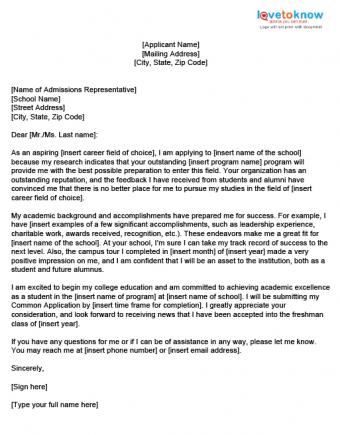
How to Write an Application Letter for Admission Into a University: College reputation and degree is in the palm of your hand. It is a rise or fall of your professional future. It is important that you choose the best college that suits your degree and academic record that you have.
When you write a letter or personal statement as part of applying for graduate or professional school, you make your case as much by the way you write as by what you say. Here are some qualities to aim for.
Table of Contents
Tips for writing an application request letter for admission
Be focussed : Take your cue first from the prompts given in the application form; also research the program widely, looking for hints about its values and identity. What is the main stated question (e.g., why you will be a good researcher or lawyer, what experience you can bring to the program, whether you can stand the pressure)? If the prompt is very general (or lacking), choose an overall point you want to make: that you are a proven achiever, that you thrive on challenges, that you have something special to contribute to the profession. . . . Don’t just write about law or medicine or anthropology: write about yourself as a lawyer, physician or anthropologist.
Be coherent : Being “together” is a quality of writing as well as of character. A clearly organized letter can create a picture of a clear-minded and sensible person. You might want to write from an outline or a diagram of main points. At least check the topic sentences of each paragraph in your finished piece to see if they make a logical sequence. Ask a tough-minded friend to give her impression.
Be interpretive : You need to make an impression concisely, so don’t use your letter just to repeat the facts set out in other parts of the application. Provide explicit answers for the question that arises in the mind of any reader looking at a hundred or more similar documents: “So what?” Use nouns and adjectives that name qualities (outgoing, curiosity, confident) and verbs that show action (coordinated, investigated, tried). Make an effort to find the exact right words to suit the evidence you are offering.
Be specific : There’s no point making claims unless you can back them up. Refer to the fact lists in other parts of your application (“as my academic record shows”), but offer enough examples so that your letter can stand on its own. Say that they are just instances, not your whole proof (“An incident from last summer is an example….”). The concrete language you use for these specific references will also balance the generalizing words of your interpretive points.
Be personal : Your letter substitutes for an interview. In effect, the readers have asked you to tell stories, mention details, expand on facts. So mention things you might not have put into the rest of the application—your ethnic background or political interests, even, if they’re relevant to your academic interests. Don’t be afraid to mention problems or weaknesses if you can show how you overcame them and what you learned from the experience. Use I rather than evasive phrases like “this writer” or “was experienced by me.” A stylistic tip: to avoid monotony, start some sentences with a subordinate clause such as “While I scrubbed floors” or “Because of my difficulties”—then go on to I did or I learned.
Options for Organizing an Admissions Letter
Judge by the clues on the application form and by the nature of the profession or discipline what kind of logical structure you could use to tie your points together into a coherent whole. You may see indications you are expected to demonstrate your personality, or be self-analytical, or enter into discussions in the discipline. You will probably use one or more of these standard expository patterns.
Narrative: A chronological order is easy to organize. It progresses from a beginning to an end, and you can divide up the middle into manageable sections. But beware of overworked openings like “I have always wanted to be a dentist,” and of excessive detail. Select relevant and interesting stories and make sure that the readers know why you are telling them.
Analytic: To deal with the central question why you are a good match for the program, give an overall answer about yourself and then discuss the elements that contribute to your engagement with the discipline. Discuss your interests in terms of key issues and theories in your discipline. To balance the dryness of this approach, break into memorable stories at times, using specific details, and use verbs to put yourself into action. Show what you intend to do after you have completed the program.
Technical: To indicate your research or professional interests, show your involvement with a specific issue. Don’t just outline the topic you want to work on; write about your summer research job or independent-study project, or even your program on student radio or your volunteer experience. Outline specific undergraduate projects as examples. Emphasize what you learned from these activities, and indicate how your studies will extend that learning.
- Common prompts include things like, “Outline your qualifications for this position” or “In writing, explain how this position would affect your career goals.” Sometimes, the prompt will be as short as, “Tell us something interesting about yourself.”
- If there is no prompt, but you still feel the need to introduce your application with a letter, it’s usually best to keep it as short as possible. Explain what you’re applying for, why you’re applying, and thank the contact for their consideration. That’s it.
- Often, college prompts will ask you to describe a time you struggled, or a time you overcame some obstacle. Write about something unique, a time that you actually failed and dealt with the consequences.
- The board will get thousands–literally, thousands–of letters about someone’s first mission trip, and letters about the time someone’s sports team was beaten, then overcame the odds, and won again. Avoid these topics.
- Be specific. If you’re writing to a college board, don’t say, “I want to go to this college because I need a degree.” That’s obvious. What do you want to do with it? Why? If you’re applying to a business, don’t say, “I just need a job.” That’s obvious. Why this specific job?
- Don’t include stuff that’s also on your resume. Your application letter is your one chance in an application to stand out. Listing off the number from your GPA and the boring list of achievements from your resume isn’t the best way to do that. The purpose of the letter is to get a sense of who you are, not a list of accomplishments. Don’t use the letter to describe the list of schools you’ve attended, your GPAs, and a list of extra-curricular activities, unless it relates to some anecdote in the letter. [7]
- If you’re applying to schools, what do you like about the school? What faculty are you interested in? Why this school, instead of another?
- Be sure to explain how you see yourself fitting into the campus—that’s what will really make you an ideal candidate for a school.
Application Request Letter for Admission Templates
When a student identifies a school they would like to enroll, they need to write a request for admission. Check out the application request letter for admission template and sample letters for guidance.
_____________
Date (date on which letter is written)
________________
Sub:_________________________________________
Dear _________________,
I hereby write to express my interest in the ____________ course at your university. I recently completed my degree in ____________ and I believe this course will complement my previous education. Your institution has a good reputation of combining class and practical based learning and this has motivated me to request for admission.
I am a quick learner and determined in my academics, this is evident from the ____________ enclosed herewith for your consideration. Taking this course is the stepping stone to achieve my career plans to work as a ____________. Additionally, I will acquire the knowledge and skills that I can practice in the work environment.
I wish to request the admission form, course details, and the fee structure for the course. Please send me the documents on my email ____________. Please give me an opportunity to pursue this course in your school and I assure you I will do my best.
I will highly appreciate a positive response.
Thank you.
Yours Sincerely,
(__________________)
The applications letter for university admission is one of the important documents that are required when applying for colleges. It should describe the applicant’s reasons for choosing the host school, his background, experiences, interests, and educational goals.
College Application Letters: Cover Letters & Letters of Continued Interest
College application letters.
College application cover letters support your college applications, college resume, and college application essay prompts. In combination with the other elements of your college applications, particularly your college entrance essay, college application letters help establish your “why.” In short, a college application letter is a cover letter for your college applications that describes your background, skills, and interest in the school. When looking at college application cover letter examples, pay attention to the values that they express. College application letters and college entrance essays are similar in that they are exercises in personal branding. When reading college application cover letter examples, pay attention to the messages they convey.
If you’re wondering how to write a college application letter, CollegeAdvisor.com has advisors who can walk you through every part of the process. If your goal is to get into top colleges, CollegeAdvisor.com can help. We’ll analyze examples of college application letters and discuss the letter of continued interest to help you craft successful applications.
In this guide, we’ll break down the different kinds of college application letters you may encounter when completing your college applications. We’ll discuss the college application letter and the letter of continued interest, as well as teacher recommendation letters.
If you want to read college application cover letter samples, you’ve come to the right place!
What is a college application letter?
To learn how to write a college application letter, you must first understand its purpose. Do this by checking out college application cover letter examples. College application letters and college resumes serve as introductions for your college applications. Unlike college application essay prompts, there are no specific questions to answer in your cover letter. Instead, include the essential elements of university application letters: your background, what makes you unique, and your reasons for wanting to attend that particular college. In short, what makes you, you .
As you’ll see when reading example college application letters, college application cover letters are not all that different from what you would write in a cover letter when applying for a job or graduate school. The purpose of college application cover letters, college entrance essays, and college resumes is to persuade colleges that you are the strongest candidate for admissions.
College application cover letters are not the time to be shy, but they’re not the time to be pretentious either. When reading college application cover letter examples, you’ll see that there’s a fine line. Your tone matters. In your university application letters, show your experiences and accomplishments while portraying character traits that colleges value. To get into top colleges, find a balance between being proud of your accomplishments and being humble.
College application letters – Who requires them?
Unlike college entrance essays, college application letters are required by very few colleges. However, the skills you’ll develop by writing university application letters will serve you well as you approach your college application essay prompts. When researching college application examples, you’ll notice that there are optional materials to submit. If you’re serious about your college applications, submit university application letters to show your interest.
College application cover letters are particularly effective if the college does not have college application essay prompts that ask you to explain why you want to attend the school and/or why you want to study your major. They are even more strongly recommended when applying to colleges that don’t have any supplemental essays. You’ll see many college application cover letter examples that focus primarily on academics, but you can include so much more.
Though university application letters are rarely required, they provide an ideal way to introduce yourself. After all, you’ll notice when reading college application cover letter samples that the goal is to help the admissions committee get to know you as a person. You are more than just your grades and scores.
If you want to get into top colleges that don’t allow you to submit a college resume or don’t provide interviews, you need to take extra steps to earn acceptance. Often, you can repurpose content from college application essay prompts that ask why you want to study your major! The college application essay format differs from that of a college application letter, but they serve a very similar purpose.
Test your knowledge about other aspects of the college admissions process in our quiz below!
What is a letter of continued interest?
A letter of continued interest (LOCI) is a letter you send to a college when you are deferred or placed on the waitlist. So, not everyone will need to write a college application letter of continued interest.
Your letter of continued interest has three primary goals:
- Reaffirm your interest in the school.
- Provide additional context for your application.
- Discuss accomplishments on your college resume that have occurred since you submitted your application.
In this guide on how to write a college application letter, we discuss all forms of college application letters in detail. We’ll expand on the above goals to explain the strategies for writing effective letters.
Explaining teacher recommendation letters
In addition to submitting a college application cover letter and, potentially, a letter of continued interest, your application will also include recommendation letters . These letters enhance your college application entrance essay and build on answers to supplemental college application essay prompts.
Due to the shift away from standardized testing, other parts of your college applications are inevitably getting more attention in the evaluation process. When assessing your college applications, admissions committees will often rely on letters from your teachers and counselor in place of interviews.
When reading sample college application letters of recommendation, you’ll observe that some are better than others. But, it can be a bit harder to find example teacher recommendations than it is to find college application cover letter examples. To ensure high-quality letters, create a plan well in advance of your senior year. You’ll want to ask teachers to write your recommendations who know you best beyond your grades. The strongest sample college application letters of recommendation speak to both your personal and academic strengths.
College application sample recommendation letters with the biggest impact typically come from teachers from your core junior year courses – math, science, English, and social studies. If there’s a teacher from your junior year who taught you during your sophomore or senior year too, even better! Teachers who know you through multiple environments – clubs, classes, sports, or other areas – can often do the best job speaking to your growth and achievement over time.
Choose teachers who know you best
Ultimately, the most effective sample college application letters of recommendation are written by the teachers who know you best. Pay attention to the college application requirements for each school on your list. Note when reading example college application letters of recommendation who the intended audience is. Some schools require math or science teachers for STEM and business majors , while others require English or social studies teachers for humanities majors .
For example, when looking at college application sample requirements, MIT writes “One recommendation should be from a math or science teacher, and one should be from a humanities, social science, or language teacher.” Caltech also requires one math or science teacher evaluation and one humanities or social sciences teacher evaluation.
Some applicants are tempted to send more letters than the college applications require. However, aim for quality over quantity. If you want to ask another teacher to write a recommendation letter for you, ask yourself what perspective they will bring to your college applications that isn’t already covered in your college entrance essay or other recommendation letters.
Don’t hesitate to provide materials to help your teachers and guidance counselor write their letters of recommendation for you. In fact, you should! When reading college application sample letters of recommendation, you’ll note that they are specific and provide examples where possible. Some teachers will even have you fill out a standard form to gather information from you. So, by having additional information already prepared, you are helping them tremendously.
Here are some materials you can provide to help your recommendations augment your college applications:
- College entrance essay
- College resume or a list of your extracurricular activities and awards
- Responses to college application essay prompts.
- A sample college application letter that you’re sending to one of your colleges.
- A few paragraphs about why you want to study your major or pursue your intended career.
- Key elements of the course you took with them, such as a favorite project or unit.
When preparing materials to give to teachers, read the instructions given to recommenders by MIT. Even if you aren’t applying to MIT, the information can still be helpful to know. By understanding the process of writing recommendation letters on the teacher’s side, you can see what information will help them write a strong letter for you.
Don’t wait until you’re submitting your college applications to ask your teachers for recommendations. Some teachers limit the number that they will write, and you want them to have plenty of time to write a quality recommendation. To make sure you have the best recommendations , ask teachers late in your junior year or early in your senior year.
The College Application Letter
As we’ve mentioned, a college application letter is a cover letter for your college applications. It describes your background, skills, and interest in the school. It’s different from both the college application essay format and the letter of continued interest. When reviewing college application samples, you’ll see that your cover letter works together with your college resume and college entrance essay to help admissions officers get to know you.
Below, we’ll discuss how to write a college application letter and walk through a sample college application letter. But remember, you want your letter to be original! Don’t feel limited by what’s in any examples of college application letters.
Do all schools require a college application letter?
No — few schools actually require college application letters. However, learning to write a strong college application letter can help you in other aspects of the college admissions process. Reading college application cover letter examples can also help you learn how to write for the admissions committee audience.
One of the ways to learn how to write a college application letter is to read sample college application letters. For instance, the same skills that help you write a strong and concise college application letter will help you in the college essay format, too.
The college application letter – What should I include?
So, you know the purpose of college application letters, but what should you include in them? Reading college application cover letter samples can help you determine this. While the college application essay format lends itself to focusing on one topic or story, college application cover letter examples highlight the importance of covering several different topics.
College application letters should contain the following elements:
1. school name and address.
You college application letter should follow formal letter formatting guidelines, which include writing the full name of the college or university you are applying to in the upper left hand corner of the letter. Try to be as specific as possible with the address you choose to use.
2. Salutation
A standard salutation is suitable for your college application letter. However, it is a great idea to do your research and use the full name of the admissions officer assigned to your region.
3. Introduction
The best examples of college application letters open strong. Thank the admissions committee for reviewing your application, and introduce yourself. Do you have a unique connection to the school? Can you hook the reader in some way to make them want to keep reading?
4. Explanation of academic interests
Your primary purpose in college is to earn a degree, so notice that in example college application letters most of the space is often devoted to discussing academic plans. Include your intended major and career path, as well as interdisciplinary interests.
5. Discussion of extracurricular interests
The college application essay format may be a place for you to discuss extracurricular involvement, so use this space to elaborate or discuss additional interests. These could be connected to your academic plans, but they don’t have to be.
6. Conclusion
Express your interest in the school! Impactful example college application letters have a clear and brief conclusion that reaffirms your desire to attend and enthusiasm for the opportunity to join the next class of undergraduates. Point to specific classes, professors, programs, organizations, and aspects of the college that pique your interest. No one is going to hold you to your plan, but colleges want to see that you have one.
8. Complimentary Close
Lastly, every good college application letter should include an expression of gratitude alongside your close and your signature.
In the example of a college application letter above, there are a few key details to highlight. The letter is essentially a five-paragraph essay, with one paragraph for each of the five elements. This differs significantly from the college application essay format. In this college application example, the college application letter has clear and distinct sections, and this is very common in college application cover letter samples.
Depending on your interests and plans, you could take a more integrated approach. You’ll read some examples of college application letters that center around a theme or broad plan rather than separated into individual paragraphs.
This sample college application letter is a narrative. The applicant’s goal is to tell her story to the admissions committee. The best sample college application letters paint a picture for the reader and draw the reader into the storyline. Though it can feel like being vivid and descriptive is a waste of your space, “showing instead of telling makes for stronger college applications.
How to format your college application letter?
When reading sample college application letters, you’ll observe that they are formatted very similarly to professional cover letters. Your university application letters should be one page single-spaced. The heading should also be consistent across college application letters.
- Your full address
- The date you will send the letter
- The admission officer’s name
- The college name
- The college address
Then, open your letter with a salutation. Many examples of college application letters open with “Dear” and are addressed to the admission officer. If you cannot find your regional admissions officer, it is fine to address the letter to the admissions office as was done in the sample college application letter above. Once you write the body of your letter, don’t forget your closing salutation – “Sincerely,” and then your name.
Once you read several sample college application letters, you’ll understand the best practices. After writing a university application letter for one school, you don’t need to start from scratch for additional schools. Adapt what you have to fit the next college’s context and your specific interests on their campus.
Being concise is key. Your university application letter should not be redundant. If it exceeds one page, see where information you mention is repeated elsewhere in your application. In your cover letter, focus on the content that makes you as original and unique as possible. Most importantly, don’t forget to proofread your university application letters!
Can a college application letter help me with other parts of my application?
Think of the college application cover letter as the glue that holds your college applications together. When writing it, think about it as your opportunity to show your best self. After brainstorming the content, you’ll be better equipped to craft your candidate profile into a cohesive narrative and articulate why you want to attend the college.
Though many parts of your college applications will be out of your control by the time you reach your senior fall, the college application cover letter is one that you can control. Use it to elevate your college applications, show interest in your top schools , and make yourself stand out among other applicants!
The Letter of Continued Interest
Another form of college application letter is a letter of continued interest . In sample college application letters of continued interest, you’ll see that the primary purpose is to reaffirm your candidacy for a spot in the next incoming class of undergraduates.
Though it can feel like a waiting game, the waitlist should not be passive. As soon as you are waitlisted or deferred, begin crafting a letter of continued interest. The best college application sample LOCIs are submitted promptly. Put in the effort to show you’re serious about attending.
College application example LOCIs should focus on recent updates. Likely, a lot has happened since you submitted your application, particularly if you applied by the early deadlines. Strong college application sample LOCIs convey accomplishments and experiences that either add to previously mentioned ones or provide another dimension to your application.
Letter of continued interest – When and where to submit?
Learn as much as you can by reading college application example LOCIs, but know that each school’s process for when and how to submit them is different. Additionally, the process may vary based on whether you were deferred to the regular decision round of admissions or waitlisted after the regular decision round. It’s important to follow each university’s directions.
Many schools will request that you upload your letter of continued interest to a portal. Some will request that you email it to an address – typically the admissions office. Others won’t allow you to submit any additional materials. If you’re in doubt, call or email the admissions office and ask.
What to include in your letter of continued interest?
You’ll notice common trends when reading college application sample LOCIs. Effective college application example LOCIs convey a tone of sincerity, gratitude, and enthusiasm for an opportunity to attend. A strong sample college application letter of continued interest includes four elements.
First, reaffirm your interest in attending the school if offered the chance to matriculate. Then, discuss relevant developments to your application, such as additional extracurricular accolades and continued academic successes. Sometimes, you’ll see a sample college application letter of continued interest that mentions how a student improved a lower mid-year grade or discusses a new leadership role.
When reading a sample college application letter of continued interest, remember that colleges are looking for reasons to admit you, so don’t be shy! Offer to answer any questions they have and provide additional info in the conclusion of your letter.
It’s important to back up your claims with supporting evidence. Strong college application sample LOCIs provide examples and specific details, just as you would in a cover letter or essay. Be vivid and descriptive as you share your story!
However, college application example LOCIs that include overly emotional appeals or merely complement the university are unlikely to be effective. Your letter of continued interest should be all about you. Though it can be difficult to realize this when reading college application example LOCIs, recognize that the content of your letter should fit within the context of the rest of your application.
The many types of college application letters – Final Thoughts
In this guide, we covered several types of letters associated with your college process – college application cover letters, teacher recommendation letters, and letters of continued interest. Reading sample college application letters, whether they are college application cover letter samples or LOCIs, can help you do your best work. But, remember that every applicant’s college application process is unique.
Our final tips for writing college application letters:
- Proofread. College application letters with typos or grammatical errors reflect poorly on your effort and candidacy. Use a polished and professional tone in everything you write for your college applications.
- Be yourself. Though this goal can get lost in the requirements, scores, and grades, you should focus on helping the colleges on your list get to know who you are .
- Follow the requirements. Each college has their own requirements for how they want you to submit materials. Pay close attention to the details for each college as you go through the admissions process.
CollegeAdvisor.com can help guide you through every step of the college application process. Check out our blog , webinars , or register with CollegeAdvisor.com today. Good luck!
This guide to college application letters and letters of continued interest was written by Caroline Marapese, Notre Dame ‘22. At CollegeAdvisor, we have built our reputation by providing comprehensive information that offers real assistance to students. If you want to get help with your college applications from CollegeAdvisor.com Admissions Experts , click here to schedule a free meeting with one of our Admissions Specialists. During your meeting, our team will discuss your profile and help you find targeted ways to increase your admissions odds at top schools. We’ll also answer any questions and discuss how CollegeAdvisor.com can support you in the college application process.
Personalized and effective college advising for high school students.
- Advisor Application
- Popular Colleges
- Privacy Policy and Cookie Notice
- Student Login
- California Privacy Notice
- Terms and Conditions
- Your Privacy Choices
By using the College Advisor site and/or working with College Advisor, you agree to our updated Terms and Conditions and Privacy Policy , including an arbitration clause that covers any disputes relating to our policies and your use of our products and services.
Sample Letter Of Interest For University Admission: Free & Effective
This article will provide a detailed guide to crafting a letter that stands out, along with three unique templates to get you started. I will also share tips from my personal experiences to help you write a letter that truly reflects your passion and qualifications.
Key Takeaways
- Purpose : Understand the role of a letter of interest in the university admission process.
- Structure : Learn the essential components of a well-crafted letter.
- Tips : Gain insights from personal experiences to enhance your letter.
- Templates : Access three unique templates to guide your writing.
The Importance of a Letter of Interest
A letter of interest serves several purposes:
- Personal Connection : It allows you to create a personal connection with the admissions committee.
- Highlight Achievements : You can highlight achievements and experiences that may not be evident from your academic records alone.
- Demonstrate Fit : It provides an opportunity to explain why you are a good fit for the program and how the program aligns with your career goals.
Structure of a Letter of Interest
A well-structured letter of interest typically includes the following sections:
- Introduction : Introduce yourself and state the purpose of your letter.
- Academic Background : Summarize your academic achievements and relevant experiences.
- Interest and Fit : Explain why you are interested in the program and how it fits your career aspirations.
- Conclusion : Reiterate your enthusiasm and express your hope for a positive response.
Template 1: Traditional Approach
[Your Name] [Your Address] [City, State, Zip Code] [Email Address] [Phone Number] [Date]
[Admissions Committee] [University Name] [University Address] [City, State, Zip Code]
Trending Now: Find Out Why!
Dear Members of the Admissions Committee,
I am writing to express my strong interest in the [Program Name] at [University Name]. With a robust academic background and a deep passion for [Field of Study], I am eager to contribute to and grow within your esteemed program.
During my undergraduate studies at [Previous University], I excelled in [Major/Relevant Courses], achieving [GPA/Notable Awards]. My involvement in [Extracurricular Activities/Research Projects] has further solidified my dedication to [Field of Study].
The [Program Name] at [University Name] is particularly appealing to me because of [Specific Program Features]. I am confident that the knowledge and skills I will gain from your program will be instrumental in achieving my career goal of [Career Goal].
Thank you for considering my application. I look forward to the opportunity to contribute to and learn from the diverse and dynamic community at [University Name].
Sincerely, [Your Name]
Template 2: Personal Story Approach
From a young age, I have been fascinated by [Field of Study], a passion that was sparked by [Personal Anecdote or Experience]. This fascination has driven me to pursue an education and career in [Field of Study], leading me to apply for the [Program Name] at [University Name].
At [Previous University], I had the opportunity to engage in [Relevant Experience], where I [Describe Experience and Achievements]. These experiences have not only honed my skills but have also reinforced my commitment to [Field of Study].
I am particularly drawn to [University Name] because of [Specific Program Features]. I believe that the [Program Name] will provide me with the advanced knowledge and hands-on experience necessary to [Career Aspiration].
I am excited about the possibility of joining the [University Name] community and contributing to its tradition of excellence. Thank you for considering my application.
Warm regards, [Your Name]
Template 3: Future Vision Approach
I am writing to express my keen interest in the [Program Name] at [University Name], a program I believe will play a crucial role in achieving my vision for the future. With a background in [Relevant Field] and a passion for [Specific Interest], I am eager to further my education and make significant contributions to [Field of Study].
My academic journey at [Previous University] has been marked by [Achievements], particularly in [Relevant Subjects or Projects]. These experiences have equipped me with a solid foundation and a determination to advance my knowledge in [Field of Study].
The innovative curriculum and esteemed faculty at [University Name] are key reasons why I am drawn to your program. I am particularly excited about [Specific Program Features] and how they align with my goal of [Career Goal].
I am enthusiastic about the opportunity to join the [University Name] community and look forward to contributing to and benefiting from the program. Thank you for your consideration.
Best regards, [Your Name]
Tips from Personal Experience
Having written numerous successful letters of interest, here are some personal tips to enhance your letter:
- Be Authentic : Your genuine enthusiasm and interest should shine through.
- Research Thoroughly : Demonstrate your knowledge of the program and how it aligns with your goals.
- Highlight Unique Experiences : Share specific experiences that make you a unique candidate.
- Proofread Meticulously : Ensure your letter is free from errors and clearly structured.
Personal Anecdote: My Journey
When I was applying for my master’s program, I vividly remember the importance of tailoring each letter of interest to the specific university. For instance, I applied to a program known for its cutting-edge research in renewable energy.
In my letter, I highlighted my undergraduate research project on solar energy, which not only showcased my relevant experience but also demonstrated my commitment to the field. This personal touch, I believe, was a key factor in my acceptance.
Final Thoughts
Writing a compelling letter of interest for university admission requires time, effort, and a genuine reflection of your passion and qualifications. By following the structure outlined in this guide, utilizing the provided templates, and incorporating the tips from personal experience, you can create a letter that stands out to admissions committees.
Frequently Asked Questions (FAQs)
Q: what is a letter of interest for university admission .
Answer : A Letter of Interest for University Admission, often referred to as a Statement of Purpose or a Cover Letter, is a personal document submitted as part of your university application.
It outlines your academic and professional aspirations, explains why you are interested in a specific program and university, and highlights your relevant experiences and achievements.
This letter allows the admissions committee to understand your motivation, suitability for the program, and potential contributions to their academic community.
Q: How long should my letter of interest be?
Answer : Typically, a letter of interest should be concise and to the point, ideally not exceeding one page. It’s important to be clear and succinct, focusing on the most relevant details of your academic and extracurricular achievements and how they align with the program you are applying to. Avoid unnecessary details or overly complex language to ensure your letter is impactful and easy to read.
Q: Should I mention specific faculty or research projects in my letter of interest?
Answer : Yes, mentioning specific faculty members or research projects can be beneficial, especially if their work directly relates to your academic interests and career goals.
It shows that you have done your research and are genuinely interested in the specific opportunities offered by the university. However, make sure your references are relevant and demonstrate a clear connection to your aspirations.
Q: Can I use the same letter of interest for multiple university applications?
Answer : While it might be tempting to use the same letter for multiple applications, it’s not advisable. Each university and program has its own unique qualities and requirements.
Tailoring your letter to each specific institution shows that you have taken the time to understand what each program offers and how it aligns with your goals. A personalized letter can significantly increase your chances of making a strong impression.
Q: What are common mistakes to avoid in a letter of interest?
Answer : Common mistakes include being too vague or generic, failing to align your interests with the program, making grammatical errors, exceeding the recommended length, and not following the university’s specific guidelines.
Avoiding these mistakes is crucial for creating an effective letter. It’s also important to maintain a professional tone while allowing your personality to shine through.
Q: How important is the letter of interest in the admissions process?
Answer : The letter of interest is a critical component of your application. It’s your opportunity to speak directly to the admissions committee and provide context to your academic records and extracurricular activities.
A well-written letter can set you apart from other candidates by showcasing your unique perspective, motivation, and fit for the program. Therefore, investing time and effort in crafting a compelling letter is essential.
Related Articles
Sample letter of withdrawal of enrollment: free & effective, school transfer letter sample: free & effective, college admission letter example: free & effective, letter of withdrawal from college due to personal problems: free & effective, appeal letter for university rejection sample: free & effective, assignment extension request letter example: free & effective, leave a comment cancel reply.
Your email address will not be published. Required fields are marked *
Writing Cover Letters for University Applications [2023 Guide]
Applying to university can be a daunting experience, especially when it comes to crafting the perfect cover letter for your application. A well-written cover letter can be the deciding factor between getting accepted into your dream program or receiving a rejection letter. In this guide, we will explore the importance of a strong cover letter, its purpose, format, content, and provide tips and examples to help you craft a compelling cover letter for your university application.
A cover letter for a university application is an essential document that can make or break your chances of getting admitted to your dream program. The importance of a strong cover letter in the application process cannot be understated, as it serves to introduce you, showcase your achievements, and demonstrate your passion for the chosen program or course.
In this article, we will cover:
- The purpose of a cover letter for university applications
- The format and structure of a cover letter
- The content and elements of an effective cover letter
- Tips for writing a compelling cover letter
- Common cover letter mistakes to avoid
- Sample cover letters for university applications
By following the advice and guidance provided in this article, you will be well-equipped to create a cover letter that stands out from the competition and increases your chances of admission. So, let's dive in and learn how to craft the perfect cover letter for your university application!
Purpose of a Cover Letter for University Applications
The primary purpose of a cover letter is to introduce the applicant, showcase their achievements, and demonstrate their passion for the chosen program or course. A cover letter complements other application materials, such as your resume and transcripts, by highlighting your unique qualities and strengths that may not be evident in those documents.
An effective cover letter can also demonstrate your motivation and commitment to the program, which can influence the admissions committee's decision. For example, MIT's Career Advising & Professional Development office explains that a well-crafted cover letter can help set you apart from other applicants by providing context and a personal touch to your application.
Format and Structure of a Cover Letter
A proper format and structure are crucial for creating a professional and effective cover letter for a university application. A standard cover letter typically includes:
- Header (with your contact information and the date)
- Salutation (addressing the recipient)
- Introduction (capturing the reader's attention)
- Body (highlighting your qualifications, achievements, and passion)
- Conclusion (leaving a lasting impression)
- Complimentary close (e.g., "Sincerely," followed by your name)
Proper formatting, such as using an appropriate font, font size, and margin settings, is essential for creating a polished and professional appearance. Keep your language clear and concise, and make sure to proofread and edit your letter to ensure it is error-free.
Content and Elements of a Cover Letter
A successful cover letter for a university application should contain specific elements that demonstrate the applicant's qualifications, achievements, and passion for the program. These elements include:
- Addressing the letter to the appropriate recipient
- Crafting an engaging introduction that captures the reader's attention
- Including essential elements in the body of the letter, such as academic interests, extracurricular activities, and relevant experiences
- Writing a compelling conclusion that leaves a lasting impression
Tailoring the content to the specific university or program is crucial, as demonstrated by Seattle Pacific University's Career Services . They advise that telling stories about your skills and experiences that are relevant to the specific program can help make your cover letter more effective.
Tips for Writing an Effective Cover Letter
Following certain tips and best practices can significantly improve the quality and impact of a cover letter for a university application:
- Research the university and program before writing the letter to better understand their values and expectations.
- Showcase your unique qualities and strengths by providing specific examples and details.
- Use strong action verbs and avoid clichés or overused phrases, as suggested by Freesumes .
- Seek feedback from teachers, counselors, or peers to ensure your cover letter is polished and compelling.
- Revise and refine your letter until it accurately represents your passion and qualifications for the program.
Common Cover Letter Mistakes to Avoid
Avoiding common cover letter mistakes is essential for creating a strong and effective university application:
- Address the letter to the correct recipient to show your attention to detail and professionalism.
- Avoid using generic or overly broad language, which can make your letter less impactful.
- Submit a well-formatted and professional-looking letter to convey your seriousness and commitment.
- Refrain from including irrelevant or excessive information that distracts from your main strengths.
- Proofread and edit your letter to eliminate typos, grammatical errors, and other mistakes that can undermine its impact.
Sample Cover Letters for University Applications
Examining sample cover letters can provide valuable insights and inspiration for crafting a successful university application. We recommend:
- Analyzing high-quality sample cover letters for various university programs or courses
- Identifying the strengths and weaknesses of each sample
- Adapting the samples to your specific situation and application
- Using the samples as a starting point for creating your unique cover letter
- Remembering to tailor your letter to the specific university or program
With proper research, planning, and execution, a well-crafted cover letter can significantly enhance a university application and increase the chances of admission. By applying the tips and guidance provided in this article, you will be well-prepared to create a compelling cover letter that showcases your passion, achievements, and qualifications for your dream program.
As a final piece of advice, remember that persistence and dedication are key to success in the university application process. Keep refining your cover letter and learning from feedback until you have a polished and impactful document that truly represents you. Good luck on your university application journey!

How to Write an Application Letter to Study at a University

How do I Write an Application Letter to Study at a University?
According to Indiana University, a university application letter, also called a personal statement, serves three important purposes. The application letter serves to introduce yourself, outline your goals, past experiences and qualifications and display your writing skills. The university you are applying to might supply a specific topic, such as your greatest accomplishment or challenges you faced and overcame, or you might write a general letter saying why the university should consider your application. Regardless of the topic, the process of writing the letter is the same.
Read the instructions the university supplies for writing the application letter. Make sure you understand the topic or questions you must answer in the letter. According to Purdue University, the most common mistake applicants make is not taking the time to understand what the question is asking. In addition, look at specific writing requirements, such as length and formatting guidelines, and the time line for completing and submitting the letter.
Gather the information you need to complete the letter. Examples of supporting documentation you might find helpful include grade transcripts and a current resume that includes descriptions, names and dates of extracurricular activities, past jobs, internships or volunteer positions you held in the past or currently hold.
Write a few notes to yourself that you can refer to when writing the application letter. Purdue University provides examples of questions to consider that include defining how and why you developed an interest in your intended field of study and an outline of your career goals. Also consider skills and personal characteristics you possess that relate to, and improve your chance for success in your field of study, a description of obstacles you overcame to get where you are now and reasons why the admissions committee should consider your application.
Create an outline for your application letter. According to the University of Toronto, a good application letter is organized, focused and specific. Creating an outline can provide structure for your letter, help you identify the main points your letter will cover and serve as a checklist to ensure you include the supporting documentation required for evidence.
Write a first draft using the format your school requires. According to Indiana University, most application letters and personal statements are between 250 and 500 words and follow a format that includes an introduction, body and conclusion. In the introduction, mention the degree or field of study for which you are applying and include a short personal statement that, for example, describes a family member or experience that influenced your career decision. The body of your letter should address the topic and answer all required questions. The conclusion ties together the information you provided in your letter and restates your interest in the program.
Edit the content and structure of your letter. Start by reading the letter aloud and having another person do the same. Make sure your letter addresses the topic or questions and then spell and grammar check your letter.
Write the final draft and complete another spell and grammar check before you submit it.
Related Articles

How to Write the Objective in a CV for PhD Admissions

How to Write an Effective Letter of Complaint About a College

How to Write a Scholarship Letter

How to Write a Masters Degree Objective

How to Improve a Resume for Graduate School

How to Write a Letter of Protest

Does APA Style Recommend Using the Present Tense?

How to Write a Letter of Interest for Graduate Programs
- Berkeley: "Personal Statement"
- Univesity of Toronto: "Effective Admissions Letters"; Margaret Procter
Based in Green Bay, Wisc., Jackie Lohrey has been writing professionally since 2009. In addition to writing web content and training manuals for small business clients and nonprofit organizations, including ERA Realtors and the Bay Area Humane Society, Lohrey also works as a finance data analyst for a global business outsourcing company.
Tips for Writing an Effective Application Essay
Find the right college for you.
Writing an essay for college admission gives you a chance to use your authentic voice and show your personality. It's an excellent opportunity to personalize your application beyond your academic credentials, and a well-written essay can have a positive influence come decision time.
Want to know how to draft an essay for your college application ? Here are some tips to keep in mind when writing.
Tips for Essay Writing
A typical college application essay, also known as a personal statement, is 400-600 words. Although that may seem short, writing about yourself can be challenging. It's not something you want to rush or put off at the last moment. Think of it as a critical piece of the application process. Follow these tips to write an impactful essay that can work in your favor.
1. Start Early.
Few people write well under pressure. Try to complete your first draft a few weeks before you have to turn it in. Many advisers recommend starting as early as the summer before your senior year in high school. That way, you have ample time to think about the prompt and craft the best personal statement possible.
You don't have to work on your essay every day, but you'll want to give yourself time to revise and edit. You may discover that you want to change your topic or think of a better way to frame it. Either way, the sooner you start, the better.
2. Understand the Prompt and Instructions.
Before you begin the writing process, take time to understand what the college wants from you. The worst thing you can do is skim through the instructions and submit a piece that doesn't even fit the bare minimum requirements or address the essay topic. Look at the prompt, consider the required word count, and note any unique details each school wants.
3. Create a Strong Opener.
Students seeking help for their application essays often have trouble getting things started. It's a challenging writing process. Finding the right words to start can be the hardest part.
Spending more time working on your opener is always a good idea. The opening sentence sets the stage for the rest of your piece. The introductory paragraph is what piques the interest of the reader, and it can immediately set your essay apart from the others.
4. Stay on Topic.
One of the most important things to remember is to keep to the essay topic. If you're applying to 10 or more colleges, it's easy to veer off course with so many application essays.
A common mistake many students make is trying to fit previously written essays into the mold of another college's requirements. This seems like a time-saving way to avoid writing new pieces entirely, but it often backfires. The result is usually a final piece that's generic, unfocused, or confusing. Always write a new essay for every application, no matter how long it takes.
5. Think About Your Response.
Don't try to guess what the admissions officials want to read. Your essay will be easier to write─and more exciting to read─if you’re genuinely enthusiastic about your subject. Here’s an example: If all your friends are writing application essays about covid-19, it may be a good idea to avoid that topic, unless during the pandemic you had a vivid, life-changing experience you're burning to share. Whatever topic you choose, avoid canned responses. Be creative.
6. Focus on You.
Essay prompts typically give you plenty of latitude, but panel members expect you to focus on a subject that is personal (although not overly intimate) and particular to you. Admissions counselors say the best essays help them learn something about the candidate that they would never know from reading the rest of the application.
7. Stay True to Your Voice.
Use your usual vocabulary. Avoid fancy language you wouldn't use in real life. Imagine yourself reading this essay aloud to a classroom full of people who have never met you. Keep a confident tone. Be wary of words and phrases that undercut that tone.
8. Be Specific and Factual.
Capitalize on real-life experiences. Your essay may give you the time and space to explain why a particular achievement meant so much to you. But resist the urge to exaggerate and embellish. Admissions counselors read thousands of essays each year. They can easily spot a fake.
9. Edit and Proofread.
When you finish the final draft, run it through the spell checker on your computer. Then don’t read your essay for a few days. You'll be more apt to spot typos and awkward grammar when you reread it. After that, ask a teacher, parent, or college student (preferably an English or communications major) to give it a quick read. While you're at it, double-check your word count.
Writing essays for college admission can be daunting, but it doesn't have to be. A well-crafted essay could be the deciding factor─in your favor. Keep these tips in mind, and you'll have no problem creating memorable pieces for every application.
What is the format of a college application essay?
Generally, essays for college admission follow a simple format that includes an opening paragraph, a lengthier body section, and a closing paragraph. You don't need to include a title, which will only take up extra space. Keep in mind that the exact format can vary from one college application to the next. Read the instructions and prompt for more guidance.
Most online applications will include a text box for your essay. If you're attaching it as a document, however, be sure to use a standard, 12-point font and use 1.5-spaced or double-spaced lines, unless the application specifies different font and spacing.
How do you start an essay?
The goal here is to use an attention grabber. Think of it as a way to reel the reader in and interest an admissions officer in what you have to say. There's no trick on how to start a college application essay. The best way you can approach this task is to flex your creative muscles and think outside the box.
You can start with openers such as relevant quotes, exciting anecdotes, or questions. Either way, the first sentence should be unique and intrigue the reader.
What should an essay include?
Every application essay you write should include details about yourself and past experiences. It's another opportunity to make yourself look like a fantastic applicant. Leverage your experiences. Tell a riveting story that fulfills the prompt.
What shouldn’t be included in an essay?
When writing a college application essay, it's usually best to avoid overly personal details and controversial topics. Although these topics might make for an intriguing essay, they can be tricky to express well. If you’re unsure if a topic is appropriate for your essay, check with your school counselor. An essay for college admission shouldn't include a list of achievements or academic accolades either. Your essay isn’t meant to be a rehashing of information the admissions panel can find elsewhere in your application.
How can you make your essay personal and interesting?
The best way to make your essay interesting is to write about something genuinely important to you. That could be an experience that changed your life or a valuable lesson that had an enormous impact on you. Whatever the case, speak from the heart, and be honest.
Is it OK to discuss mental health in an essay?
Mental health struggles can create challenges you must overcome during your education and could be an opportunity for you to show how you’ve handled challenges and overcome obstacles. If you’re considering writing your essay for college admission on this topic, consider talking to your school counselor or with an English teacher on how to frame the essay.
Related Articles

Academic Cover Letters
What is this handout about.
The long list of application materials required for many academic teaching jobs can be daunting. This handout will help you tackle one of the most important components: the cover letter or letter of interest. Here you will learn about writing and revising cover letters for academic teaching jobs in the United States of America.
What is an academic cover letter?
An academic cover letter describes your experiences and interest as a candidate for a specific position. It introduces you to the hiring committee and demonstrates how your academic background fits with the description of the position.
What do cover letters for academic teaching jobs typically contain?
At their most basic level, academic cover letters accomplish three things: one, they express your interest in the job; two, they provide a brief synopsis of your research and teaching; and three, they summarize your past experiences and achievements to illustrate your competence for the job. For early-career scholars, cover letters are typically no more than two pages (up to four pages for senior scholars). Occasionally, a third page may make sense for an early-career scholar if the application does not require a separate teaching statement and/or research statement. Digital versions of cover letters often contain hyperlinks to your CV or portfolio page. For some fields, cover letters may also include examples of your work, including music, popular articles, and other multimedia related to your research, service, or teaching available online. Typically, letters appear on departmental or university letterhead and include your signature. Above all, a strong cover letter presents your accomplishments and your familiarity with the institution and with the position.
How should I prepare to write my academic cover letter?
Like all writing, composing a cover letter is a process. The process may be as short as a few hours or as long as several weeks, but at the end the letter should present you as a strong candidate for the job. The following section has tips and questions for thinking through each stage of this writing process. You don’t need to answer all of these questions to write the letter; they are meant to help you brainstorm ideas.
Before you begin writing your cover letter, consider researching the institution, the department, and the student population. Incorporating all three aspects in your letter will help convey your interest in the position.
Get to know the institution. When crafting your cover letter, be aware of the type of institution to which you are applying. Knowing how the institution presents itself can help you tailor your letter and make it more specific.
- Where is the institution located?
- Is it on a quarter-system or semester-system?
- What type of institution is it? Is it an R1? Is it an R2? Is it a liberal arts college? Is it an HBCU? Is it a community college? A private high school?
- What is the institution’s culture? Is it teaching-focused or research-focused? Does it privilege experiential learning? Does it value faculty involvement outside the classroom? Is it affiliated with a specific religious tradition?
- Does it have any specific institutional commitments?
- How does the institution advocate for involvement in its local community?
- What are the professional development opportunities for new and junior faculty?
Learn about the department. Knowing the specific culture and needs of the department can help you reach your audience: the department members who will be reading your documents and vetting you as a candidate.
- Who is on the search committee? Who is the search committee chair?
- What is the official name of the department?
- Which different subfields make up the department?
- Is it a dual appointment or a position in a dual department?
- How does the department participate in specific types of student outreach?
- Does the department have graduate students? Does it offer a terminal Master’s degree, Ph.D., or both? How large are the cohorts? How are they funded?
- Does the department encourage or engage in interdisciplinary work?
- Does the majority of the department favor certain theoretical or methodological approaches?
- Does the department have partnerships with local institutions? If so, which ones?
- Is the department attempting to fill a specific vacancy, or is it an entirely new position?
- What are the typical course offerings in the department? Which courses might you be expected to teach? What courses might you be able to provide that are not currently available?
Consider the students. The search committee will often consider how you approach instructing and mentoring the student body. Sometimes committees will even reserve a position for a student or solicit student feedback on a candidate:
- What populations constitute the majority of the undergraduate population?
- Have there been any shifts in the student population recently?
- Do students largely come from in-state or out-of-state?
- Is there an international student population? If so, from which countries?
- Is the university recruiting students from traditionally underrepresented populations?
- Are students particularly active on campus? If so, how?
Many answers to these questions can be found both in the job description and on the institution’s website. If possible, consider contacting someone you know at the institution to ask about the culture directly. You can also use the institution’s course catalog, recruitment materials, alumni magazine, and other materials to get answers to these questions. The key is to understand the sort of institution to which you are applying, its immediate needs, and its future trajectory.
Remember, there is a resource that can help you with all three aspects—people. Reach out to your advisor, committee members, faculty mentors, and other contacts for insight into the prospective department’s culture and faculty. They might even help you revise your letter based on their expertise. Think of your job search as an opportunity to cultivate these relationships.
After you have done some initial research, think about how your experiences have prepared you for the job and identify the ones that seem the most relevant. Consider your previous research, internships, graduate teaching, and summer experiences. Here are some topics and questions to get you started thinking about what you might include.
Research Experiences. Consider how your research has prepared you for an academic career. Since the letter is a relatively short document, select examples of your research that really highlight who you are as a scholar, the direction you see your work going, and how your scholarship will contribute to the institution’s research community.
- What are your current research interests?
- What topics would you like to examine in the future?
- How have you pursued those research interests?
- Have you traveled for your research?
- Have you published any of your research? Have you presented it at a conference, symposium, or elsewhere?
- Have you worked or collaborated with scholars at different institutions on projects? If so, what did these collaborations produce?
- Have you made your research accessible to your local community?
- Have you received funding or merit-based fellowships for your research?
- What other research contributions have you made? This may include opinion articles, book chapters, or participating as a journal reviewer.
- How do your research interests relate to those of other faculty in the department or fill a gap?
Teaching Experience. Think about any teaching experience you may have. Perhaps you led recitations as a teaching assistant, taught your own course, or guest lectured. Pick a few experiences to discuss in your letter that demonstrate something about your teaching style or your interest in teaching.
- What courses are you interested in teaching for the department? What courses have you taught that discussed similar topics or themes?
- What new courses can you imagine offering the department that align with their aim and mission?
- Have you used specific strategies that were helpful in your instruction?
- What sort of resources do you typically use in the classroom?
- Do you have anecdotes that demonstrate your teaching style?
- What is your teaching philosophy?
- When have you successfully navigated a difficult concept or topic in the classroom, and what did you learn?
- What other opportunities could you provide to students?
Internships/Summer/Other Experiences. Brainstorm a list of any conferences, colloquiums, and workshops you have attended, as well as any ways you have served your department, university, or local community. This section will highlight how you participate in your university and scholarly community. Here are some examples of things you might discuss:
- Professional development opportunities you may have pursued over the summer or during your studies
- International travel for research or presentations
- Any research you’ve done in a non-academic setting
- Presentations at conferences
- Participation in symposia, reading groups, working groups, etc.
- Internships in which you may have implemented your research or practical skills related to your discipline
- Participation in community engagement projects
- Participation in or leadership of any scholarly and/or university organizations
In answering these questions, create a list of the experiences that you think best reflect you as a scholar and teacher. In choosing which experiences to highlight, consider your audience and what they would find valuable or relevant. Taking the time to really think about your reader will help you present yourself as an applicant well-qualified for the position.
Writing a draft
Remember that the job letter is an opportunity to introduce yourself and your accomplishments and to communicate why you would be a good fit for the position. Typically, search committees will want to know whether you are a capable job candidate, familiar with the institution, and a great future addition to the department’s faculty. As such, be aware of how the letter’s structure and content reflect your preparedness for the position.
The structure of your cover letter should reflect the typical standards for letter writing in the country in which the position is located (the list below reflects the standards for US letter writing). This usually includes a salutation, body, and closing, as well as proper contact information. If you are affiliated with a department, institution, or organization, the letter should be on letterhead.
- Use a simple, readable font in a standard size, such as 10-12pt. Some examples of fonts that may be conventional in your field include Arial, Garamond, Times New Roman, and Verdana, among other similar fonts.
- Do not indent paragraphs.
- Separate all paragraphs by a line and justify them to the left.
- Make sure that any included hyperlinks work.
- Include your signature in the closing.
Before you send in your letter, make sure you proofread and look for formatting mistakes. You’ll read more about proofreading and revising later in this handout!
The second most important aspect of your letter is its content. Since the letter is the first chance to provide an in-depth introduction, it should expand on who you are as a scholar and possible faculty member. Below are some elements to consider including when composing your letter.
Identify the position you are applying to and introduce yourself. Traditionally, the first sentence of a job letter includes the full name of the position and where you discovered the job posting. This is also the place to introduce yourself and describe why you are applying for this position. Since the goal of a job letter is to persuade the search committee to include you on the list of candidates for further review, you may want to include an initial claim as to why you are a strong candidate for the position. Some questions you might consider:
- What is your current status (ABD, assistant professor, post-doc, etc.)?
- If you are ABD, have you defended your dissertation? If not, when will you defend?
- Why are you interested in this position?
- Why are you a strong candidate for this position?
Describe your research experience and interests. For research-centered positions, such as positions at R1 or other types of research-centered universities, include information about your research experience and current work early in the letter. For many applicants, current work will be the dissertation project. If this is the case, some suggest calling your “dissertation research” your “current project” or “work,” as this may help you present yourself as an emerging scholar rather than a graduate student. Some questions about your research that you might consider:
- What research experiences have you had?
- What does your current project investigate?
- What are some of the important methods you applied?
- Have you collaborated with others in your research?
- Have you acquired specific skills that will be useful for the future?
- Have you received special funding? If so, what kind?
- Has your research received any accolades or rewards?
- What does your current project contribute to the field?
- Where have you presented your research?
- Have you published your research? If so, where? Or are you working on publishing your work?
- How does your current project fit the job description?
Present your plans for future research. This section presents your research agenda and usually includes a description of your plans for future projects and research publications. Detailing your future research demonstrates to the search committee that you’ve thought about a research trajectory and can work independently. If you are applying to a teaching-intensive position, you may want to minimize this section and/or consider including a sentence or two on how this research connects to undergraduate and/or graduate research opportunities. Some questions to get you started:
- What is your next research project/s?
- How does this connect to your current and past work?
- What major theories/methods will you use?
- How will this project contribute to the field?
- Where do you see your specialty area or subfield going in the next ten years and how does your research contribute to or reflect this?
- Will you be collaborating with anyone? If so, with whom?
- How will this future project encourage academic discourse?
- Do you already have funding? If so, from whom? If not, what plans do you have for obtaining funding?
- How does your future research expand upon the department’s strengths while simultaneously diversifying the university’s research portfolio? (For example, does your future research involve emerging research fields, state-of-the-art technologies, or novel applications?)
Describe your teaching experience and highlight teaching strategies. This section allows you to describe your teaching philosophy and how you apply this philosophy in your classroom. Start by briefly addressing your teaching goals and values. Here, you can provide specific examples of your teaching methods by describing activities and projects you assign students. Try to link your teaching and research together. For example, if you research the rise of feminism in the 19th century, consider how you bring either the methodology or the content of your research into the classroom. For a teaching-centered institution, such as a small liberal arts college or community college, you may want to emphasize your teaching more than your research. If you do not have any teaching experience, you could describe a training, mentoring, or coaching situation that was similar to teaching and how you would apply what you learned in a classroom.
- What is your teaching philosophy? How is your philosophy a good fit for the department in which you are applying to work?
- What sort of teaching strategies do you use in the classroom?
- What is your teaching style? Do you lecture? Do you emphasize discussion? Do you use specific forms of interactive learning?
- What courses have you taught?
- What departmental courses are you prepared to teach?
- Will you be able to fill in any gaps in the departmental course offerings?
- What important teaching and/or mentoring experiences have you had?
- How would you describe yourself in the classroom?
- What type of feedback have you gotten from students?
- Have you received any awards or recognition for your teaching?
Talk about your service work. Service is often an important component of an academic job description. This can include things like serving on committees or funding panels, providing reviews, and doing community outreach. The cover letter gives you an opportunity to explain how you have involved yourself in university life outside the classroom. For instance, you could include descriptions of volunteer work, participation in initiatives, or your role in professional organizations. This section should demonstrate ways in which you have served your department, university, and/or scholarly community. Here are some additional examples you could discuss:
- Participating in graduate student or junior faculty governance
- Sitting on committees, departmental or university-wide
- Partnerships with other university offices or departments
- Participating in community-partnerships
- Participating in public scholarship initiatives
- Founding or participating in any university initiatives or programs
- Creating extra-curricular resources or presentations
Present yourself as a future faculty member. This section demonstrates who you will be as a colleague. It gives you the opportunity to explain how you will collaborate with faculty members with similar interests; take part in departmental and/or institution wide initiatives or centers; and participate in departmental service. This shows your familiarity with the role of faculty outside the classroom and your ability to add to the departmental and/or institutional strengths or fill in any gaps.
- What excites you about this job?
- What faculty would you like to collaborate with and why? (This answer may be slightly tricky. See the section on name dropping below.)
- Are there any partnerships in the university or outside of it that you wish to participate in?
- Are there any centers associated with the university or in the community that you want to be involved in?
- Are there faculty initiatives that you are passionate about?
- Do you have experience collaborating across various departments or within your own department?
- In what areas will you be able to contribute?
- Why would you make an excellent addition to the faculty at this institution?
Compose a strong closing. This short section should acknowledge that you have sent in all other application documents and include a brief thank you for the reader’s time and/or consideration. It should also state your willingness to forward additional materials and indicate what you would like to see as next steps (e.g., a statement that you look forward to speaking with the search committee). End with a professional closing such as “Sincerely” or “Kind Regards” followed by your full name.
If you are finding it difficult to write the different sections of your cover letter, consider composing the other academic job application documents (the research statement, teaching philosophy, and diversity statement) first and then summarizing them in your job letter.
Different kinds of letters may be required for different types of jobs. For example, some jobs may focus on research. In this case, emphasize your research experiences and current project/s. Other jobs may be more focused on teaching. In this case, highlight your teaching background and skills. Below are two models for how you could change your letter’s organization based on the job description and the institution. The models offer a guide for you to consider how changing the order of information and the amount of space dedicated to a particular topic changes the emphasis of the letter.
Research-Based Position Job Letter Example:
| Date: Month Day, Year Search Committee Chair’s First and Last Name, Graduate Degree Dear Dr./Mr./Ms. Search Committee Chair’s last name and/or Search Committee Members: Paragraph 1 [3-5 Sentences]: Identify the position you are applying for. Introduce yourself to the committee and your research interests. Connect your interests to the department and describe what makes you interested in becoming part of this departmental community. Paragraph 2 [3-5 Sentences]: Briefly explain your research to date. Consider mentioning your research questions, methods, key findings, as well as where and when you published and/or presented this work. Paragraph 3 [4-5 Sentences]: Elaborate on your current research project. Consider mentioning your most prestigious funding awards for this project. Explain your key findings in more detail. Paragraph 4 [3-5 Sentences]: Introduce your future research plans and goals. Point out the intellectual merit and/or broader impacts of this future work. Paragraph 5 [3-5 Sentences]: Briefly discuss your teaching experience and strategies. Provide examples of teaching strategies or an anecdote highlighting your teaching effectiveness. You may also want to introduce your philosophy on diversity in an academic setting. Paragraph 6 [2-3 Sentences]: Make a connection between your work and the department to which you are applying. Include how you will participate in the intellectual life of the department both inside and outside the classroom. Provide concrete examples of how you will be a hard-working and collaborative colleague. Paragraph 7 [1-2 Sentences]: A thank you for the search committee’s time and consideration. Sincerely, Your Name |
Teaching-Based Position Job Letter Example:
| Date: Month Day, Year Search Committee Chair’s First and Last Name, Graduate Degree Dear Dr./Mr./Ms. Search Committee Chair’s last name and/or Search Committee Members: Paragraph 1 [3-5 Sentences]: Identify the position you are applying for. Introduce yourself to the committee and your research interests. Connect your interests to the department and describe what makes you interested in becoming part of this departmental community. Paragraph 2 [3-5 Sentences]: Briefly discuss your teaching experience and pedagogical commitments. Provide examples of teaching strategies or an anecdote highlighting your teaching effectiveness. You may also want to introduce your philosophy on diversity in an academic setting. Paragraph 3 [3-4 Sentences]: Provide a discussion of how you involved yourself with students or the broader university community outside of the traditional classroom setting. Discuss how those interactions influenced your teaching. Paragraph 4 [2-3 Sentences]: Briefly explain your current research interests to date and how it relates to your teaching. State your research questions, methods, and key findings or arguments. Point out the intellectual merit and/or broader impacts of this future work. Paragraph 5 [3-5 Sentences]: Highlight when and where your research was published and/or presented this work or any forthcoming publications. Mention any prestigious funding or awards. Introduce your future research plans and goals. Paragraph 6 [2-3 Sentences]: Make a connection between your work and the department to which you are applying. Include how you will participate in the intellectual life of the department both inside and outside the classroom. Provide concrete examples of how you will be a hard-working and collaborative colleague. Paragraph 7 [1-2 Sentences]: A thank you for the search committee’s time and consideration. Sincerely, Your Name |
Remember your first draft does not have to be your last. Try to get feedback from different readers, especially if it is one of your first applications. It is not uncommon to go through several stages of revisions. Check out the Writing Center’s handout on editing and proofreading and video on proofreading to help with this last stage of writing.
Potential pitfalls
Using the word dissertation. Some search committee members may see the word “dissertation” as a red flag that an applicant is too focused on their role as a graduate student rather than as a prospective faculty member. It may be advantageous, then, to describe your dissertation as current research, a current research project, current work, or some other phrase that demonstrates you are aware that your dissertation is the beginning of a larger scholarly career.
Too much jargon. While you may be writing to a specific department, people on the search committee might be unfamiliar with the details of your subfield. In fact, many committees have at least one member from outside their department. Use terminology that can easily be understood by non-experts. If you want to use a specific term that is crucial to your research, then you should define it. Aim for clarity for your reader, which may mean simplification in lieu of complete precision.
Overselling yourself. While your job letter should sell you as a great candidate, saying so (e.g., “I’m the ideal candidate”) in your letter may come off to some search committee members as presumptuous. Remember that although you have an idea about the type of colleague a department is searching for, ultimately you do not know exactly what they want. Try to avoid phrases or sentences where you state you are the ideal or the only candidate right for the position.
Paying too much attention to the job description. Job descriptions are the result of a lot of debate and compromise. If you have skills or research interests outside the job description, consider including them in your letter. It may be that your extra research interests; your outside skills; and/or your extracurricular involvements make you an attractive candidate. For example, if you are a Latin Americanist who also happens to be well-versed in the Spanish Revolution, it could be worth mentioning the expanse of your research interests because a department might find you could fill in other gaps in the curriculum or add an additional or complementary perspective to the department.
Improper sendoff. The closing of your letter is just as important as the beginning. The end of the letter should reflect the professionalism of the document. There should be a thank-you and the word sincerely or a formal equivalent. Remember, it is the very last place in your letter where you present yourself as a capable future colleague.
Small oversights. Make sure to proofread your letter not just for grammar but also for content. For example, if you use material from another letter, make sure you do not include the names of another school, department, or unassociated faculty! Or, if the school is in Chicago, make sure you do not accidentally reference it as located in the Twin Cities.
Name dropping. You rarely know the internal politics of the department or institution to which you are applying. So be cautious about the names you insert in your cover letters. You do not want to unintentionally insert yourself into a departmental squabble or add fire to an interdepartmental conflict. Instead, focus on the actions you will undertake and the initiatives you are passionate about.
Works consulted
We consulted these works while writing this handout. This is not a comprehensive list of resources on the handout’s topic, and we encourage you to do your own research to find additional publications. Please do not use this list as a model for the format of your own reference list, as it may not match the citation style you are using. For guidance on formatting citations, please see the UNC Libraries citation tutorial . We revise these tips periodically and welcome feedback.
Ball, Cheryl E. 2013. “Understanding Cover Letters.” Inside Higher Ed , November 3, 2013. https://www.insidehighered.com/advice/2013/11/04/essay-cover-letter-academic-jobs .
Borchardt, John. 2014. “Writing a Winning Cover Letter.” Science Magazine , August 6, 2014. https://www.sciencemag.org/careers/2014/08/writing-winning-cover-letter# .
Helmreich, William. 2013. “Your First Academic Job.” Inside Higher Ed , June 17, 2013. https://www.insidehighered.com/advice/2013/06/17/essay-how-land-first-academic-job .
Kelsky, Karen. 2013. “How To Write a Journal Article Submission Cover Letter.” The Professor Is In (blog), April 26, 2013. https://theprofessorisin.com/2013/04/26/how-to-write-a-journal-article-submission-cover-letter/ .
Tomaska, Lubomir, and Josef Nosek. 2008. “Ten Simple Rules for Writing a Cover Letter to Accompany a Job Application for an Academic Position.” PLoS Computational Biology 14(5). https://doi.org/10.1371/journal.pcbi.1006132 .
You may reproduce it for non-commercial use if you use the entire handout and attribute the source: The Writing Center, University of North Carolina at Chapel Hill
Make a Gift
Guide On How To Write A Cover Letter For A University
Link Copied
Share on Facebook
Share on Twitter
Share on LinkedIn

Cover It Up
It's the time of year again; you have made a list of your selected colleges and will apply to them. You are about to apply, but one hurdle remains in your path; the dreaded cover letter. Many students still are unsure of how to write a good cover letter for a university. In this blog, we will tell you how to write a great cover letter for a university. We will discuss the basic template, tips, and things to remember while writing a university application letter. So let us not waste any time and dive straight into it.
What is a cover letter for a university, and why is it important?
Many of us thought of this question when we first encountered the need for a cover letter when applying for universities. A cover letter for a university is basically a one-page application that you submit alongside your CV or resume when applying to a university or college. Many universities ask for a cover letter nowadays since it provides the admissions officer with further detail on how your skill set aligns with the university, what you can bring to the institution and why you want a seat. It also shows the admissions officer your passion and suitability for the course. In addition, a university application letter is more personal than a resume and builds a relationship with the officer.
How to write a cover letter for a university?
Since we have discussed why a university application letter is important, let us now see how to write one. The structure and text volume of a cover letter for a university is determined by its five major features. In most circumstances, a university application letter should be no more than one page long and no more than 300 words long. However, those words must be carefully picked and stick to a well-defined structure. The five major features of a cover letter for a university are:
The officer will see the header first, which is precisely where you can wow them. The header is the only place of a university application letter where you can have some design choices instead of the entire letter being in black text boxes. It will help your letter look as good as it reads. The header usually includes your name , occupation , address , phone number and email .
2. Greeting
The greeting line of a university application letter, also known as a salutation, is where you say your greetings. In a university application letter, don't go too inventive. A simple "Hey" is obviously ineffective. Try to learn the name of the individual to whom you should address your university application letter. People enjoy reading their names , demonstrating your attention to detail and interest in this officer, showing that you've gone out of your way to determine who is processing applications!
3. Introduction
The first paragraph of your cover letter for a university introduction should include your prestigious alma mater ( the school or college you have attended ). Another possibility is that you have experience in your field. Lead with your abilities, and aim to produce a paragraph that makes the admissions officer want to keep reading.
Ace your cover letter along with exploring your perfect student accommodation!
Book through amber today!
The heart of your pitch should be in the body of your cover letter for a university. Given the one-page limit, you have a lot of work to perform in a limited time. In this section, you must mention your top qualifications for the course you wish to apply for. Also, attempt to include the name of the university you're applying to and explain why you want to study there. Remind the admissions officer that you aren't merely sending out study applications to random colleges but want to study at this one.
5. Conclusion
A call to action (CTA) should be included at the end of your cover letter for a university, in which you urge that the admissions officers take some action as a result of your letter. You can state you're looking forward to hearing back, that you'd be happy to follow up with a phone call, or that you'd be honoured to be invited to an interview, either in person or remotely. Your desire to receive a response should indicate to the officer that you are serious about attending this university. You don't want to come across as desperate or overconfident, but you want to express your genuine desire.
If you need more in-depth understanding on how to write your cover letter, our ultimate guide to writing a cover letter will surely help you out!

Documents you will need while submitting your university application letter?
You will need to submit a few documents while submitting your cover letter for a university! The documents include the following:
- A CV/Resume
- Previous academic transcripts
- Portfolio (if required)
- A personal statement
You need to submit these basic documents, but it would be best if you verified the required documents on the university site! As you know, you have to submit your CV or resume alongside your cover letter. Many students still face problems while creating a good resume, don't worry; we will show you how to create your first resume !
Tips on writing your cover letter for a university
There are a few tips that can help you make a great cover letter for a university that can wow the admissions officer:
- Try to sound more human in your letter.
- Beware of the cliches almost everyone uses, so you need to think "outside the box" for this one.
- Keep an eye on your tone and ensure it's friendly , professional , and confident , but never arrogant or condescending.
- Keep your cover letter brief ; keep it point to point so the reader doesn't get bored reading it.
- It's a good idea to divide your introduction into the past, present, and future portions to stay organised while talking about yourself.
- Prove everything you say in your cover letter for a university by keeping the tone friendly and not arrogant!
- Don't just list everything you have achieved since it is already in your CV! Try to mention what new things you would achieve!
University application letter format
Your university application letter must say the appropriate things and look the right way. Choose the appropriate layout and design for your cover letter, and don't waste your golden prose on a poorly designed letter that sounds wonderful but looks horrible. You must use a legible font – nothing grand or unusual. You should use a font size of 10 to 12 points, which is large enough to read but not so large that it looks like you're creating a kid's story. Use 1-inch margins on your letter's top, bottom, right, and left sides. You must include a space between paragraphs that are not indented and keep all paragraphs to a decent length.
Things to keep in mind when writing a cover letter for a university
There are a few things to keep when writing your cover letter; these include the likes of spelling mistakes, grammar, poorly designed cover letters and much more. Here are a few things to remember:
- Words are wasted. Irrelevant information, clichés, and fluff will clutter your page with unnecessary language. Use the limited space you have to write in your own words what makes you a good candidate.
- One of the most typical mistakes students make is wasting their cover letter by transforming their resume into paragraph form . This repetition does not help the admissions officer assess your qualifications or persuade them that you are enthusiastic about the chance.
- A solid cover letter might be improved by including facts about the university that you've learnt about. Learn about the university's culture and goals , and tailor your cover letter to reflect how you would be a good fit.
- A cover letter is not the place to give bad information about your qualifications. An interview allows the admissions officer to learn about your weaknesses. Concentrate on your strengths !
These were the ways to create a good cover letter for a university. It will take you a bit of time and practice to perfect your cover letter. Once you submit your application, you might get called upon for a university interview. If the interview is going to scare you, then don't worry our blog about university interview questions will help you run that scare away. If you are going to apply to universities in the Uk, we can help you do exactly that. Our blog on applying to universities in the UK will do that.
Frequently Asked Questions
How long should a university application letter be, how do you end a cover letter for university, does a cover letter for a university improve your chances, can you be too confident in a university application letter, does a university application letter have to be perfect.
Your ideal student home & a flight ticket awaits
Follow us on :

Related Posts
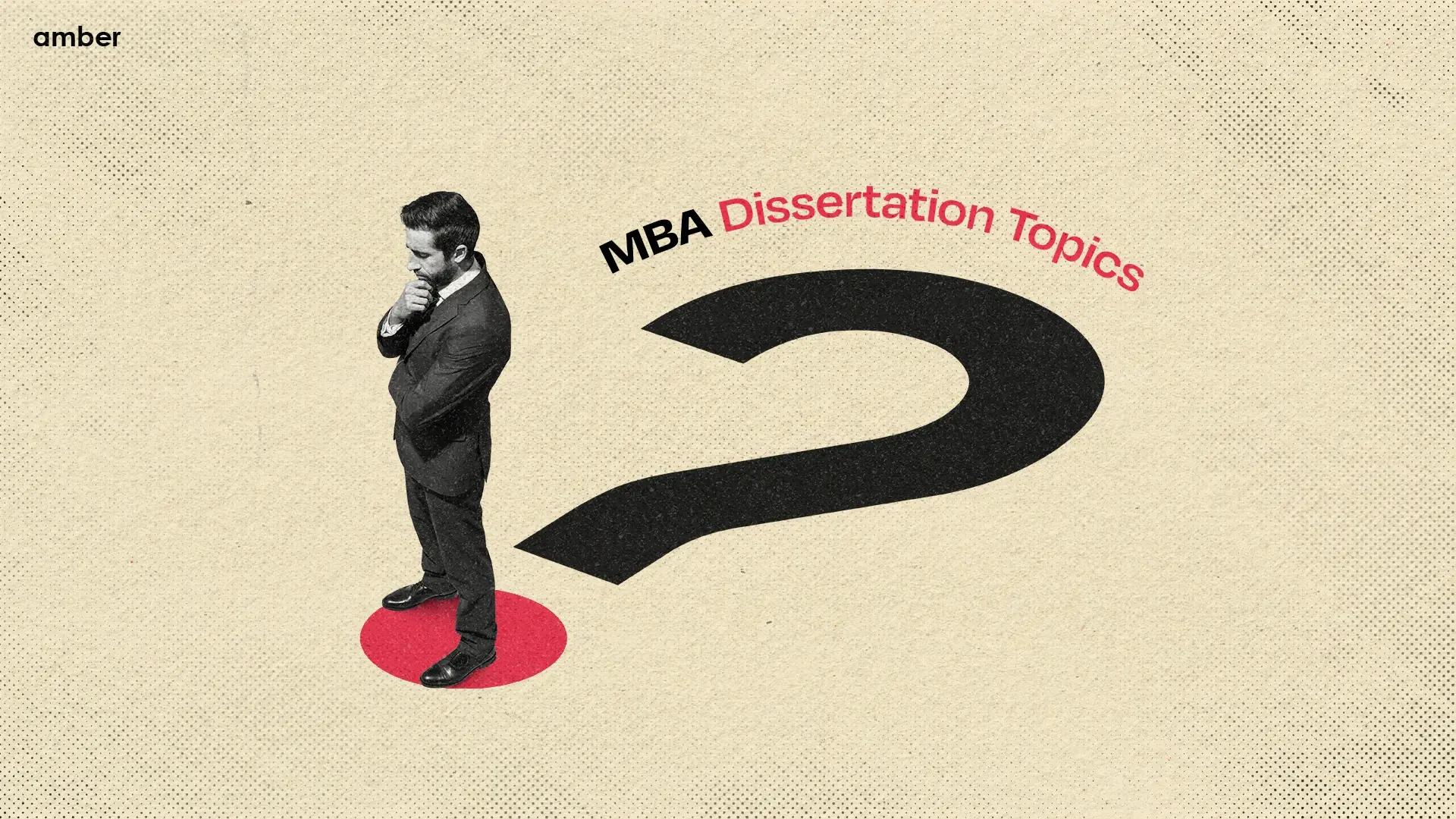
200+ Subject-Wise MBA Dissertation Topics to Check Out This Year
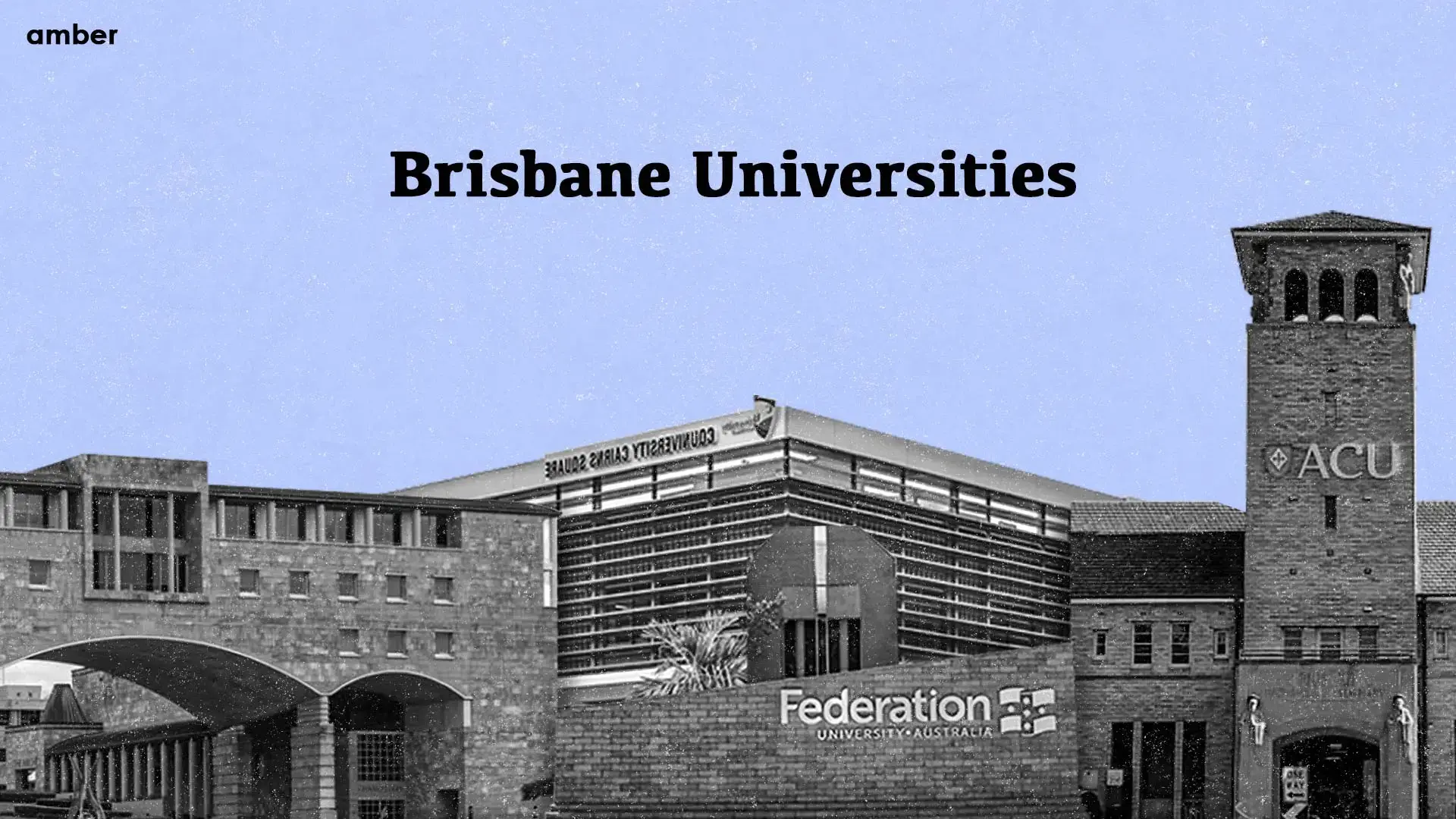
10 Best Universities in Brisbane

Hardest Universities In Ireland With Low Acceptance Rate 2024

amber © 2024. All rights reserved.
4.8/5 on Trustpilot
Rated as "Excellent" • 4800+ Reviews by students
Rated as "Excellent" • 4800+ Reviews by Students
WTO / Applications / Free College Admission Application Letter Templates
Free College Admission Application Letter Templates
A college admissions application letter is a formal letter that an aspiring student submits to a college along with other pertinent documents to get admission into that college.
Given that the college receives numerous applications, your letter is the perfect opportunity to explain what makes you stand out from other applicants. The application letter works as a tool to enhance your admissions process and speed up your chances of joining your dream institution. Your letter should capture important and specific details about why you are a perfect fit for the particular school.
It should outline the strengths you possess both as a young person and as a student. This means highlighting notable accomplishments, including achievements in a co-curricular activity, if you think you could benefit the school from that perspective. Practically, some schools can pick you because they believe you can earn them immense recognition due to your athletic prowess.
Your letter is significant as it solidifies your entire admissions application. It can boost your chance of securing a place at your dream college. This is because the personal information you provide, such as former leadership positions and exceptional academic excellence, can potentially portray you as a stronger applicant as compared to other applicants.
Free Templates
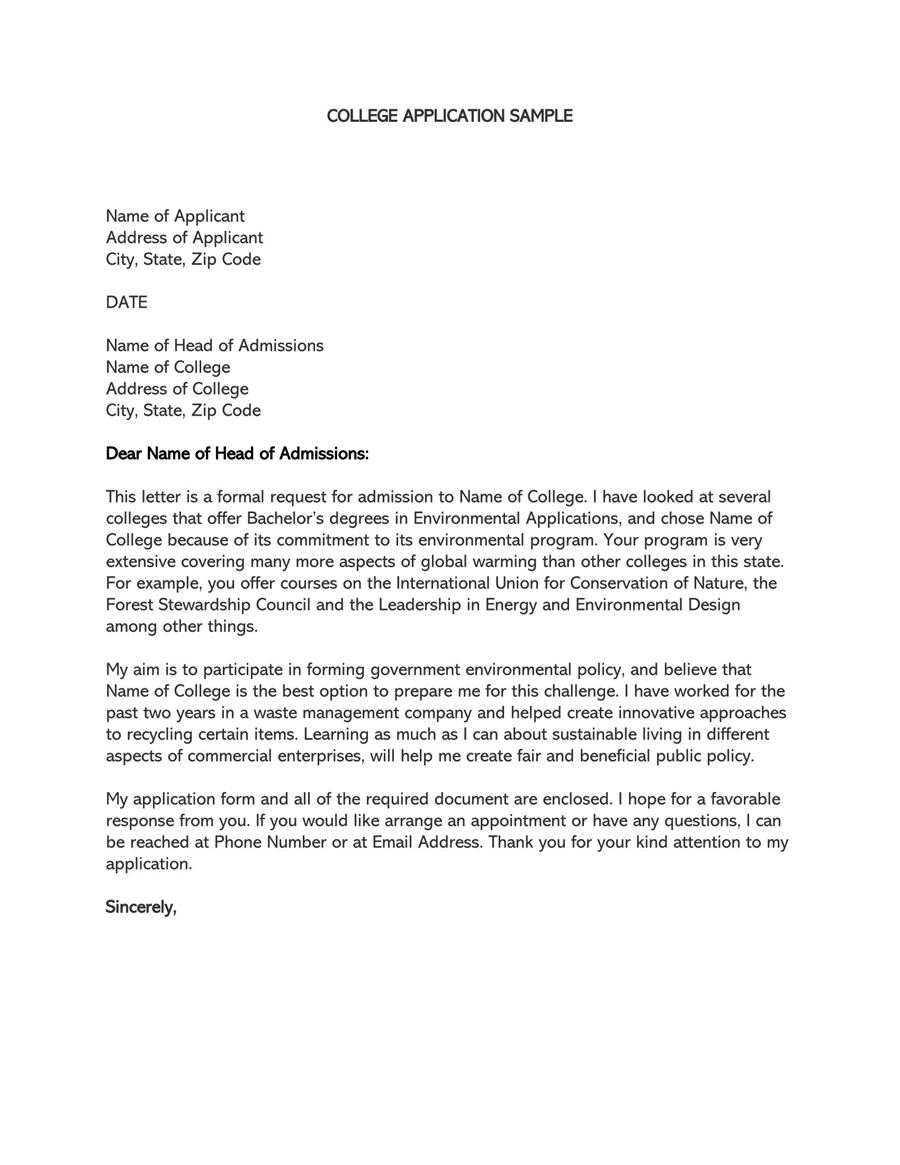
Writing a College Admission Application Letter
With the huge number of admissions applications your dream college receives, your letter should be well-written and capture the most unique qualities that could give you an edge over other applicants.
The following is the ultimate guide for writing a professional letter, assuming you have already taken your time to conduct enough research:
Write down your personal information
Identify yourself at the beginning of your admissions letter. This means writing down your full name and address. Use the conventionally accepted address format, whereby you indicate the street address, state, city, and zip code. This way, the admissions officers reading your letter will have an idea of who you are as they proceed to read your letter.
Include the date
After writing your name and address, indicate the date of sending the letter. Use a professional format, such as “November 15, 20xx.” Keep in mind that using a casual format could compromise the professionalism of your letter.
Write details of the college
Address the letter by using the standard, formal format as shown below. Remember to address the admission officer as discovered earlier during your research.
Name of admission officer, Name of college Street address City, state, zip code
Include a salutation
The admissions application letter is a formal correspondence, which means you must address the reader formally and try to avoid adding some sort of language such as To whom it may concern, Hi, Hello, or Good Morning. The best approach is to use the full name of the admission officer. If you do not know the name of the officer assigned to your region, conduct some research.
Dear Mr. White,
State your intent for applying to the school
State the reason for writing the letter and express your genuine interest in the program you are applying for. Indicate the program you would like to pursue and explain why you want to study at that institution. Think about the school’s unique qualities that set it apart from other colleges.
Give reasons why you are applying to their college
Now this is the opportunity to offer a personalised explanation about why you want to join their college. In one or two paragraphs, explain how this institution can contribute to driving your career goals and dreams forward. Be sure to relate how the distinctive strengths of the college could help shape your future. For instance, if you are a football player and the institution runs a nationally strong football team, let this be one of your major points.

Write a conclusion
When it comes to finalizing the letter, express your interest without getting too demanding or needy and conclude it with a positive tone. Inform the administration that you have submitted all required documents and that you are available to provide any other additional information or clarifications. Conclude by thanking the admission officers for sparing time to review your application and expressing your keenness to receive a positive response.
Include a sign-off
Sign your letter with a formal sign-off and add your full name.
College Admission Application Letter Template
[Your Name]
[Your Address]
[City, State, Zip Code]
[Your Email Address]
[Your Phone Number]
[Admissions Office]
[College or University Name]
[College or University Address]
Dear Admissions Committee,
I am honored to submit my application for the [specific program or degree] at [College or University Name] for the upcoming [semester or year]. My high school journey has been characterized by a commitment to academic excellence, a passion for [relevant academic field or extracurricular activity], and a dedication to personal growth and development. It is with great anticipation that I seek to bring my enthusiasm and dedication to an institution that champions [broad values or principles, such as academic integrity, innovation, or community].
During my time at [Your High School Name], I have engaged deeply with [specific subjects or activities], which has not only enriched my understanding but also sharpened my desire to explore these areas further in a collegiate setting. My academic achievements include maintaining a GPA of [Your GPA] while actively participating in [extracurricular activities or clubs], highlighting my ability to balance rigorous coursework with extracurricular commitments.
My involvement in [specific projects or community service] has taught me [key lessons or skills], reinforcing my belief in the importance of [value or principle relevant to the college’s ethos]. These experiences have shaped my worldview and fueled my ambition to contribute to a vibrant academic community.
Enclosed with this letter, you will find my application form, high school transcripts, [any other required documents], and letters of recommendation. I am prepared to provide any further information needed to support my application.
As I envision my future at [College or University Name], I am excited about the prospect of joining a community that embraces [aspect of the college’s mission or values]. I am eager to engage with the diverse and dynamic student body, participate in [specific programs or activities offered by the college], and contribute to the campus community through my passion for [your field of interest or a particular activity].
Thank you for considering my application. I am enthusiastic about the opportunity to learn, grow, and contribute to the esteemed community at [College or University Name]. I look forward to the possibility of discussing my application with you further.
Sample College Application Letter
I am writing to express my enthusiastic application for admission to the Bachelor of Science in Environmental Science program at Dream University for the Fall semester of 20XX. My passion for environmental stewardship, combined with my academic achievements and community involvement, has prepared me for the rigorous and rewarding path that Dream University offers.
Throughout my high school career at Green Valley High, I have maintained a cumulative GPA of 3.8, demonstrating my commitment to academic excellence. My coursework in biology, chemistry, and environmental studies has not only strengthened my scientific foundation but has also ignited my interest in sustainable environmental solutions. I was honored to receive the Green Innovator Award in my junior year for leading a community project that successfully implemented a local recycling program, reducing waste by 30% in its first year.
In addition to my academic pursuits, I have actively participated in the Environmental Club, serving as its president in my senior year. Under my leadership, we launched a school-wide initiative to reduce energy consumption, which included installing energy-efficient lighting and promoting a carpooling system among students and faculty. These experiences have taught me the importance of leadership, teamwork, and community engagement in addressing environmental challenges.
Dream University’s reputation for excellence in environmental science, coupled with its commitment to sustainability, aligns perfectly with my academic interests and career aspirations. The opportunity to work with faculty members who are at the forefront of environmental research and to have access to state-of-the-art facilities is incredibly exciting to me. I am particularly drawn to the hands-on research opportunities and internships that Dream University offers, which I believe are essential for applying theoretical knowledge to real-world environmental issues.
Enclosed with this letter, you will find my application form, high school transcripts, SAT scores, letters of recommendation, and a personal essay that further details my passion for environmental science. I am confident that my background and aspirations make me a well-suited candidate for the Environmental Science program at Dream University.
Thank you for considering my application. I am eager to contribute to and learn from the vibrant academic community at Dream University. I look forward to the opportunity to further discuss my application and how I can contribute to the university’s mission of fostering environmental innovation and sustainability.
Elena Rodriguez
Key Takeaways
The application letter for admission to the Bachelor of Science in Environmental Science program effectively presents the candidate’s qualifications and enthusiasm for the university. Here’s why it’s an effective sample:
Personalized Introduction: The applicant addresses the admissions committee directly, establishing a personal connection and demonstrating genuine interest in the program.
Academic and Extracurricular Achievements: The letter highlights the candidate’s strong academic record and relevant coursework, showcasing their preparedness for the program. Their leadership roles and community involvement in environmental initiatives demonstrate a well-rounded skill set beyond academics.
Alignment with University Values: The applicant thoroughly researched the university’s program and emphasizes how its reputation and values resonate with their academic interests and career goals. This alignment with the university’s mission enhances the candidate’s suitability for admission.
Supporting Documentation: Mentioning the inclusion of required documents with the letter shows the candidate’s organization and attention to detail, providing a complete application package.
Enthusiastic Conclusion: The letter closes with a strong expression of gratitude and eagerness to contribute to the university’s academic community, leaving a positive impression on the admissions committee.
Overall, this application letter effectively communicates the candidate’s qualifications, passion for environmental science, and suitability for the program, making it a strong sample for aspiring applicants.
Admission Application Letter Writing Tips
Given the high level of competition for limited slots, you can increase your chances of joining the college by writing an outstanding letter. From conducting research to ensuring timely submission of the letter, here are key tips to help write an excellent letter:
Research and self-reflect
Visit the college’s website and try to find some of the qualities they prefer in students. Also, you can talk to someone who has attended the school before you. Using the information you gain from your research, tailor your letter in a way that shows that the school’s mission and vision statement correlate with you as a character and as a future professional.
Emphasize your uniqueness
The uniqueness of students is a key factor, so you should try to mention your abilities and skills that make you the most suitable applicant for the college. For instance, you may want to explain how you are an exceptional player if that means something to the particular college you are writing to.
Be concise and to the point
Colleges receive numerous applications and spend a lot of time going through them. In this context, avoid writing an unnecessarily long letter. Instead, make it brief and to the point. One way to maintain the acceptable and recommended length is to only write the information you think is essential. Also, avoid repeating details that are already covered in your documents.
Be specific
Colleges love to pick students who write to them with genuine intentions. For this reason, let the administration know that you believe it is only their college that can offer the best quality education and college life that you want to explore. Think about the specific reason that built your interest in the college and capitalize on it. This could be anything, from nationwide recognition in a game that you play to an excellent ranking for your program of interest.
Make sure to go through your admissions application letter several times to correct any grammatical and spelling mistakes. Ensure that your letter has good readability so that the reader can see your professionalism and attention to detail. If it helps, have a friend go through your letter to see what they feel about it. While polishing your letter, keep in mind that submitting a letter containing careless mistakes could ruin your chance of securing a life-changing opportunity.
Submit the letter before the deadline
Colleges tend to be strict on timeliness to ensure the smooth flow of their selection procedures. Many colleges do not even consider going through admissions applications sent in late. In this context, be sure to follow up on the dates announced by your preferred institution to ensure that your letter reaches them before time runs out.
Final Words
A well-written admissions application letter can increase your chances of joining the institution of your dreams. Remember that a good writing process starts with adequate research. When writing the letter, be keen to capture how the school’s culture, mission, vision, and strengths relate well with your qualities and strengths as a student. Write about your achievements in the community and your former schools. Always remember to keep it professional, concise, and one page long. Consider using a customizable template to make sure you have included all the essential information in your application letter.
About This Article

Was this helpful?
Great! Tell us more about your experience
Not up to par help us fix it, keep reading.

Education , Reports
30 free book report templates for grade 1 to 6.

Applications , Education

43 Printable Division Worksheets (for Grade 4-6) | Word, PDF

12 Free Class Schedule Templates

35 Free Course Syllabus Templates (Editable) – Word | PDF

11 Best College Application Essay Examples (Format Guide)

64 Free Cornell Note Templates (Note Taking Explained)

10 Free School Report Card Templates (Editable)

Applications , Forms
55 blank rental application forms – templates – editable.

Business , Education , Planners
30 free storyboard templates – examples.

Charts , Education
20 printable periodic tables – editable – word, pdf.

12 Perfect Examples of Salutatorian Speech
Thank you for your feedback.
Your Voice, Our Progress. Your feedback matters a lot to us.
The Uni Guide has a fresh new look
- Teacher training
- Bangor University
- Birmingham City University
- Sheffield Hallam University
- University of Aberdeen
- University of East Anglia
- University of Hull
- University of Kent
- University of Reading
- A-level choices
- GCSE choices and university
- Choosing a course
- Making firm and insurance choices
- University open days
- Top questions to ask at a university open day
- Ucas Extra explained
- Understanding conditional offers
- University offers: what they mean and what to do next
- Getting the most from Ucas university fairs
- What do I need to get into Oxbridge?
- What to do if you don’t get an offer from your first choice university
- What you need to know about getting a university scholarship, grant or bursary
- AS and A-levels explained
- Is a higher or degree apprenticeship right for you?
- Universities
By Ryan Lunn (Content executive, The Uni Guide) | 21 September 2023 | 7 min read
How to write your university application
Deadlines, fees, references and personal statements – here’s everything you need to know about submitting your university application for 2024 entry, with expert tips from universities and Ucas.
Share this page
Email & print.

What’s the deadline for submitting your university application?
Can you still apply to university if you miss the 31 january deadline , is there a fee for submitting a university application, what will the university application involve, tips from university admissions experts for filling out your ucas application, when will you hear back from universities with their decisions, can you apply directly to a university without involving ucas , you may want to look at these..., 6 steps you need to take to apply to university.
Find out more about choosing a university and course, writing your application and personal statement
Ucas deadlines and key application dates
Get organised with our calendar of the key dates and deadlines in the Ucas application process for students beginning studies in September 2024.
How to write an excellent personal statement in 10 steps
Help and advice on putting your application together
Related to this article
Search the uni guide, find further advice or search for information on a course or university.
- Search Advice
- Search courses &/or universities
The Uni Guide and The Student Room are both part of The Student Room Group.
Promoted universities
- Durham University
- Lancaster University
- University of Glasgow
- University of the Arts London
- University of Southampton
- Swansea University
- Aston University, Birmingham
- Ulster University
- Cardiff University
Browse expert advice
- Oxbridge applications
- Ucas application
- Personal statements
- Ucas deadline 2024 countdown
- Clearing and results day
- Preparing for university
- Student accommodation
- Student life
- Student finance
- Advice for parents
About this site
- Cookie policy
- List of universities and colleges
- Privacy notice
- Terms and conditions
- Where we get our info
Who we work with
- Your account settings
Ad privacy settings
Popular tools and features
- A-level Explorer
- Course search

Connect with us
- PRO Courses Guides New Tech Help Pro Expert Videos About wikiHow Pro Upgrade Sign In
- EDIT Edit this Article
- EXPLORE Tech Help Pro About Us Random Article Quizzes Request a New Article Community Dashboard This Or That Game Happiness Hub Popular Categories Arts and Entertainment Artwork Books Movies Computers and Electronics Computers Phone Skills Technology Hacks Health Men's Health Mental Health Women's Health Relationships Dating Love Relationship Issues Hobbies and Crafts Crafts Drawing Games Education & Communication Communication Skills Personal Development Studying Personal Care and Style Fashion Hair Care Personal Hygiene Youth Personal Care School Stuff Dating All Categories Arts and Entertainment Finance and Business Home and Garden Relationship Quizzes Cars & Other Vehicles Food and Entertaining Personal Care and Style Sports and Fitness Computers and Electronics Health Pets and Animals Travel Education & Communication Hobbies and Crafts Philosophy and Religion Work World Family Life Holidays and Traditions Relationships Youth
- Browse Articles
- Learn Something New
- Quizzes Hot
- Happiness Hub
- This Or That Game
- Train Your Brain
- Explore More
- Support wikiHow
- About wikiHow
- Log in / Sign up
- Job Application Documents
- Cover Letters
How to Write an Application Letter
Last Updated: May 6, 2024 Fact Checked
This article was co-authored by Alexander Ruiz, M.Ed. . Alexander Ruiz is an Educational Consultant and the Educational Director of Link Educational Institute, a tutoring business based in Claremont, California that provides customizable educational plans, subject and test prep tutoring, and college application consulting. With over a decade and a half of experience in the education industry, Alexander coaches students to increase their self-awareness and emotional intelligence while achieving skills and the goal of achieving skills and higher education. He holds a BA in Psychology from Florida International University and an MA in Education from Georgia Southern University. There are 7 references cited in this article, which can be found at the bottom of the page. This article has been fact-checked, ensuring the accuracy of any cited facts and confirming the authority of its sources. This article has been viewed 176,563 times.
Application letters are typically written to accompany school or job applications. The purpose of the letter is to introduce yourself to the decision committee, and to outline your qualifications in a specific way. It can be the only time other than an interview that you have a chance to really stand out in an application, so it's important to get it right. You can learn what to include in your letter, how to style it, and how to format it to give yourself the best chance.
Application Letter Templates

Writing a Job Application

- A good example would be: "I'm writing to apply for the Chimney Sweep position advertised in Rolling Stone. I think my experience in the heating industry makes me uniquely qualified for this position. Please find my application materials and a brief description of my qualifications below."
- Don't write your name until the signature. It'll be in the header and in the sign-off, so there's no reason to put it in the body of the letter itself.

- Be specific. Who are you? Where do you come from? What's your story? These details are important. HR screeners read hundreds of these.
- Describe your ambitions. Where do you want to go? How will this opportunity help you get there?
- What skills and experiences make you the right fit? Be as specific as possible and avoid vague language. It's better to describe a time you solved a specific problem at your last job than to just write, "I'm a good problem solver at work."

- Tailor it to the business. If you're applying to work at a record store, you need to talk about music. If you're applying to work at a tech company that writes, "Tell us something totally rad about yourself!" it's probably ok to be a little more informal.

- Don't over-promise. Telling someone that you can guarantee that you'll be able to turn around their sales figures in six months or less is a good way to get fired in six months.

- Any kind of job requires this type of research. If you apply to a restaurant, you need to be familiar with the menu and the kind of customers the restaurant attracts. Consider eating there a few times before you apply.
- Don't show you're familiar by criticizing a business and telling them what you can do better. Not the time to offer a harsh criticism of a business plan that you don't really know anything about.
Writing a School Application

- Common prompts include things like, "Outline your qualifications for this position" or "In writing, explain how this position would affect your career goals." Sometimes, the prompt will be as short as, "Tell us something interesting about yourself."
- If there is no prompt, but you still feel the need to introduce your application with a letter, it's usually best to keep it as short as possible. Explain what you're applying for, why you're applying, and thank the contact for their consideration. That's it.

- Often, college prompts will ask you to describe a time you struggled, or a time you overcame some obstacle. Write about something unique, a time that you actually failed and dealt with the consequences.
- The board will get thousands–literally, thousands–of letters about someone's first mission trip, and letters about the time someone's sports team was beaten, then overcame the odds, and won again. Avoid these topics.

- Be specific. If you're writing to a college board, don't say, "I want to go to this college because I need a degree." That's obvious. What do you want to do with it? Why? If you're applying to a business, don't say, "I just need a job." That's obvious. Why this specific job?

- If you're applying to schools, what do you like about the school? What faculty are you interested in? Why this school, instead of another?
Formatting Application Letters

- If you don't get a word-count guideline, just focus on making one or two good points about yourself, and keeping it at that. No need to drone on four several pages.

- Instead of a salutation, write, "Letter of Application" at the top left corner of the page, or put it in the header on the left side at the top.
- If you do have a contact, address it to them, making sure the name is spelled correctly. Then space down and start the body of the letter. [10] X Research source

- Sometimes, it's appropriate to type your name, then print out the letter and sign it in pen. That can be a nice touch.

- Mailing address
- Telephone and/or fax number
Expert Q&A

- Remember to be formal at all times. Do not use abbreviations anywhere. Thanks Helpful 0 Not Helpful 1

You Might Also Like

- ↑ https://www.indeed.com/career-advice/finding-a-job/how-to-write-an-application-letter
- ↑ https://owl.purdue.edu/owl/subject_specific_writing/professional_technical_writing/tone_in_business_writing.html
- ↑ Alexander Ruiz, M.Ed.. Educational Consultant. Expert Interview. 18 June 2020.
- ↑ https://advice.writing.utoronto.ca/types-of-writing/admission-letters/
- ↑ https://wts.indiana.edu/writing-guides/personal-statements-and-application-letters.html
- ↑ https://owl.purdue.edu/owl/job_search_writing/job_search_letters/cover_letters_1_quick_tips/quick_formatting_tips.html
- ↑ https://writing.wisc.edu/handbook/assignments/coverletters/
About This Article

To format an application letter, start by including your name and contact details in the document header. When choosing a greeting, only use one if you know the person's name your writing to. Otherwise, give the document a title, like "Letter of application" at the top of the page. For the body of the letter, aim to write no more than 1 page of single-spaced paragraphs using a standard font. Finally, conclude your letter with a formal greeting like "Sincerely yours." For tips on how to write a job application letter, read on! Did this summary help you? Yes No
- Send fan mail to authors
Did this article help you?

Featured Articles

Trending Articles

Watch Articles

- Terms of Use
- Privacy Policy
- Do Not Sell or Share My Info
- Not Selling Info
Get all the best how-tos!
Sign up for wikiHow's weekly email newsletter
Carey Business School blog
- Request Info
Jul 17, 2024
Admissions tips: How to write a graduate admissions essay
An admissions essay is a standard part of the admissions application. To help, we’ve curated our top tips on how to write a standout graduate admissions essay.

- Share via Email
Everyone has a unique narrative, and we firmly believe that your qualifications go beyond what can be captured on your resume. But the question is, how will you distinguish yourself from the competition when applying to Johns Hopkins Carey Business School?
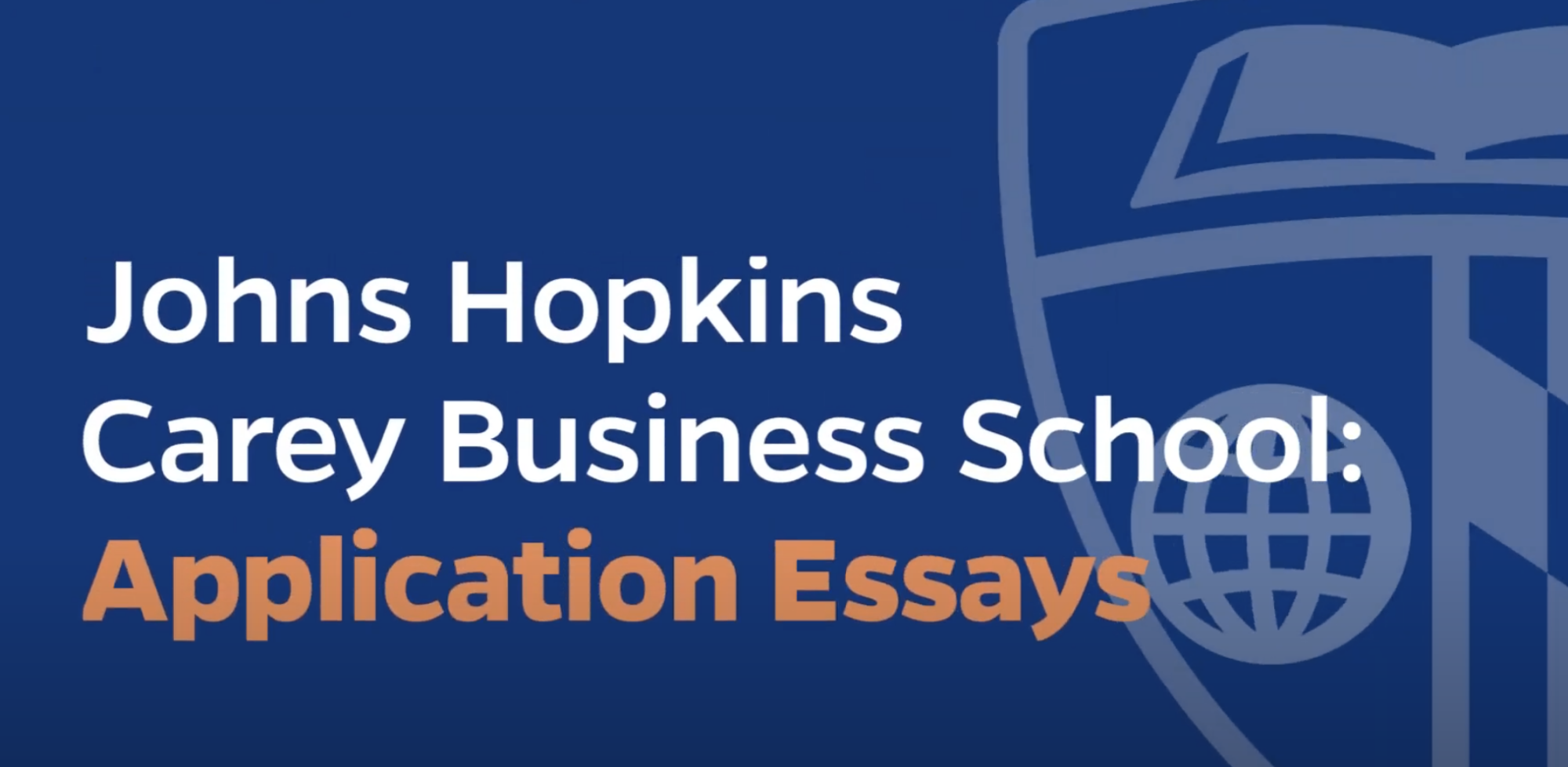
What to consider when writing a graduate school application essay The essay portion of the application is your opportunity to broaden our admissions team’s understanding of your abilities beyond what they can see on your transcript and resume. Writing an essay is your chance to share your unique strengths, personal history, journey of growth, and any additional qualities that show you are a strong candidate.
Preparing to write your essay Prior to starting your essay, read all prompts carefully. Take a moment to reflect on your reasons for pursuing a graduate business degree. It may be beneficial to have a pen and notepad at your disposal for this reflective exercise. Think about your personal journey and pinpoint pivotal moments in your growth and learning, then take note of how those moments have shaped you and your experiences, and how they could help guide you through your business school journey. Be sure to also use the correct formatting and avoid adding lists and bullet points to your essays.
Outline your thoughts Once you have a solid understanding of how to convey your personal journey within the context of the essay prompts, the next step is to construct an outline. As you shape the direction and flow of your essay, always keep your audience in mind. Our admissions team reviews thousands of application essays, so it’s crucial to find a creative hook that will make your story stand out.
Don’t overthink As you begin to write your first draft, allow your ideas to flow freely. Don’t fixate on grammar or finding the perfect words at this stage–simply capture your thoughts on paper. You can refine your essay in the second draft.
Step away After finishing your first draft, set it aside for a day or two before returning to edit it. Revisiting your work with a fresh outlook allows for a new perspective. During this second review, tackle the details of grammar, punctuation, and vocabulary. You might find it helpful to read your essay in reverse order to catch any typos.
Ask for feedback Once you feel your essay is in good shape, it’s highly recommended that you share your draft with an advisor, professor, trusted colleague, friend, or even your recommender. Gaining insights from a trustworthy source can enhance the quality of your essay and assist in identifying any typos or minor adjustments. While editing is an important step, it should not cut out your authentic voice and tone. When identifying a proofreader, make sure to find someone who knows your authentic voice and tone and can edit your paper while still preserving your natural voice and tone.
Finalize and submit You’re almost done! Before finalizing your essay submission, do one last review. Run a spell check and read your essay out loud to yourself. This approach can help you pinpoint areas that might require clarification or fine-tuning. As you review your final draft, be sure that you thoroughly addressed the question on the application.
Keep in mind that the essay portion of the application is your chance to set yourself apart Admissions team members want to hear your authentic voice, with a style that sounds natural and genuine. By sharing your authentic self, and your transformative experiences, passions, goals, and voice, you can leave a lasting impression.
Best of luck with the rest of your application journey!
Upcoming Carey application deadlines
The Fall 2025 Full-time MBA application is now open. Applications for all other Fall 2025 programs will open this fall. Please visit our upcoming deadlines webpage to view all application, decision, and deposit deadlines.
Full-time MBA Fall 2025: Early action application deadline
September 11, 2024
Part-time programs Spring 2025: Round 1 application deadline
October 9, 2024
Full-time MBA Fall 2025: Round 1 application deadline
October 23, 2024
Are you seeking one-on-one college counseling and/or essay support? Limited spots are now available. Click here to learn more.
How to Write a Cover Letter – Template and 9 Expert Tips
July 19, 2024

If you’re applying for a job, you’ll most likely need to prepare a polished résumé, to practice common interview questions , to request recommendations and references , and to write a cover letter. There are many types of cover letters out there. These include the application cover letter, the prospecting cover letter, and the career change cover letter. In this article, we’ll discuss the most common: the application cover letter, which is what you’ll need when trying to secure a new job (usually for a currently open position). Below, we’ll recommend how to write a cover letter (including how to end a cover letter) and provide a cover letter template to help you get started!
If you like our template and tips you may also want to view our 3 Great Cover Letter Examples for Any Job .
While we can provide a cover letter template to serve as a skeleton for your writing, you’ll need to flesh out your work with important details that are relevant to you, your experiences, and the prospective job at hand. As you begin drafting these details, it’s important to remember a few essential moves that are crucial as you learn how to write a cover letter:
1) Do your research
Before you send a cover letter to an employer, it’s imperative that you have a thorough understanding of the position you’re applying for , the job’s expectations and requirements, your future role within the hierarchy of the workplace, and the overall company culture. Knowledge of these items will help you determine which of your relevant skills and accolades you should include in your letter, the person or people to whom you should address your writing, and the tone and style of your cover letter. It will also help you decide what to leave out of your cover letter. Remember to only stick to items that are relevant to the position at hand!
2) Make particular connections
Use specificity when listing your accomplishments and describing your goals. Just as importantly, describe how you as a candidate are uniquely positioned to fill this position successfully. For instance, a general and less-connected sentence might say, “I have strong leadership skills.” But a detailed, job-specific sentence might be, “As a project manager for Waterscapes, I oversaw a team of twelve employees working on the development and implementation of River Clean Up 2024, which reduced plastic waste in our local water systems by 27%. This experience will inform my future work with your company as an Assistant Director of Eco-Initiatives.”
Think of each sentence as an opportunity to illustrate potential links between your previous work and your future career. Just like answering a “ tell me about yourself ” question in an interview, this is a moment to describe your past, present, and now your future in your hoped-for job.
How to Write a Cover Letter – Cover Letter Template (Continued)
3) add well-considered details.
Does your prospective job’s company have a strong online presence? Does your future employer have a LinkedIn profile that lists publications, affiliations, or specific awards and accolades? Do you have a personal connection with your employer or someone important at the company? If so, now is the time to utilize some of your social capital and make mention of these items. Doing so adds a personal touch and makes your cover letter more memorable. It also demonstrates your willingness to research and promote the company’s culture.
For instance, if you’re applying for a position at a language-learning app company and their motto is, “Communication for All,” this specific phrase could be used as you describe your passion for making language-learning accessible, regardless of the student’s background or income.
4) Be professional
Depending on the job for which you’re applying, your overall cover letter tone may vary. If you’re applying for a job as a copywriter for a quirky astrology start-up, you might be able to include fun details about horoscopes in your cover letter. If, on the other hand, it’s a position for a tenure-track professor job at a top research university, your tone will be much more formal and will include particulars about your contributions to the field.
Regardless of the job, you should always utilize a professional font (no Comic Sans!) and clear letterhead for readability to convey your seriousness about the position. You should also always try to convey sincerity in your writing. Additionally, make sure your reader knows you really want this job and will do your best at it if you’re hired.
5) Be confident!
Now is not the time to focus on your professional faults or limitations. Now is the time to promote yourself with abandon. Focus on your relevant work experience, your strengths, your accolades, and your willingness to learn and grow in this new job.
6) Brainstorm and draft
Do not rush your cover letter! This is a professional genre of communication that signifies your intentions to advance your career. It should be treated as a formal record of your employment history. As such, spend time cultivating your writing and trimming it so that it is rich, informative, candid and attractive.
Drafting also includes editing details like spelling and grammar checks – it has long been established that simple errors and problems with writing organization can cause employers to not take your work seriously. [i] Other small details can indicate your level of seriousness about yourself and this work. [ii] For instance, if you have a personal email address like “ [email protected] , you may want to think of creating and using a separate email address that is a little more professional, like “ [email protected] .”
7) Be direct
At all points in your cover letter, it’s essential to start with the punchline. Studies have demonstrated that readers and listeners often retain the first sentence of a paragraph or presentation before their attention starts to wane. [iii] As such, beginning with your main point and following with examples to support that point is the best way to grab your reader’s attention and ensure they fully absorb your meaning.
8) Pay attention to length
How long should a cover letter be? In most cases, a cover letter should not exceed one page of single-spaced writing (about 250 to 400 words, max). Remember that your prospective employer may be reading dozens of cover letters. He or she will probably not have the time nor inclination to read an unnecessarily long cover letter.
9) Finish on a promising note
As you consider how to end a cover letter, it’s important to focus on positivity and continuing dialogue with your prospective employer. Gesture toward future communication with closings like, “I look forward to your response,” or “I look forward to sharing more with you about my previous experience and qualifications for this position.”
Is it okay for me to use this cover letter template?
As you sit down to brainstorm how to write a cover letter, you may be wondering: How can I be original if I’m using a template? Aren’t I just copying what someone else has written? In short, the answer is: you can definitely use a cover letter template because templates are simply great starting points! You aren’t copying the content of the cover letter template. Rather, you are using the frame of the cover letter template to create your own original writing.
Templates are generative, meaning they are simply a beginning or prompt for your own writing and ideas to grow and flourish. Templates help you make writing moves you might not have otherwise considered. In the case of a cover letter template, using a model can be inspirational, helping you remember important details about your résumé and other job-related skills you may have forgotten. Finally, templates can combat writer’s block and help you organize your ideas into a coherent cover letter. Ultimately, “the aim of templates is not to stifle critical thinking but to…be direct about the key rhetorical moves” necessary for a piece of writing. [iv]
Below, you’ll find a cover letter template to get you started. Good luck!
Cover Letter Template
[ Your name ]
[ Your phone number ]
[E mail address ]
[ Optional: Your mailing address – you usually only need to include this if it’s a printed cover letter or if the employer will not be contacting you via email or phone. ]
Dear [ specific title and name of application recipient ],
As a [ your professional title ] with [ number ] years’ experience in [ field ], I am applying for the position of [ job title ]. To this position, I would bring [ highlight the 1-3 most important ways you will bring your specific skills to this job to benefit, develop, and serve the company or employer ].
[Body Paragraph 1: Using the skills you mention at the beginning of the letter, find 1-2 relevant, concrete examples from your previous work experiences to demonstrate how you’ll be a good fit for this new job ].
Because of [ skill or experience listed in first paragraph ], I can facilitate [ your company ] with [ specific requirement listed in the job description ]. Furthermore, my previous work with [ specific skill ] can additionally help [ specific job requirement ].
[Body Paragraph 2: Using the skills or experiences mentioned at the beginning of the letter, demonstrate how your current work will make you a good candidate for this job .]
In my current position as [ job title ] at [ current place of work ], I [ list specific responsibility with detail ] and am eager to continue to grow professionally at [ your company ] with [ similar work that will be required at this new job ]. At [ your company ], [ insert specific detail about the company culture, job requirements, or general news about the company ], I am eager to use my current skills as a [ insert your experience ] to help expand this work.
[Body Paragraph 3: Using the skills and experiences mentioned at the beginning of the letter, demonstrate how you hope to grow as a worker in this new position ].
I have always seen myself as a [ particular job title or responsibility ] and to be afforded the opportunity to do so at a company as prestigious as [ company name ], will let me develop [ specific professional skills ] while promoting the company’s mission to [ include part of the company’s mission ].
I am available to answer any questions you may have about my résumé or previous work experiences. Please don’t hesitate to reach out. Thank you so much for your time and consideration. I look forward to your response.
[ Your Name ]
How to Write a Cover Letter with Template – Works Cited
- [i] McDowell, Earl E. “Perceptions of the Ideal Cover Letter and Ideal Resume,” Journal of Technical Writing and Communication. Volume 17, Issue 2, April 1987.
- [ii] Martin-Lacroux, Christelle, and Alain Lacroux. “Do Employers Forgive Bad Spelling in Resumes?” Business and Professional Communication Quarterly, Volume 80, Issue 3. 26 October 2016.
- [iii] Garner, Joanna K. and Michael P. Alley. “How the design of presentation slides affects audience comprehension: A case for the assertion-evidence approach,” International Journal of Engineering Education . Vol. 29, Issue 6, 2013.
- [iv] Graff, Gerard, and Cathy Birkenstein. They Say / I Say: The Moves That Matter in Academic Writing . W.W. Norton & Company, New York, 2006.
How to Write a Cover Letter with Template – Additional Resources
- How to Send a Condolence Message for a Coworker (with Samples)
- 25 High Paying Work from Home Jobs
- How to Tell Your Boss You’re Quitting
- How to Answer “Tell Me About Yourself” with Examples
- Resignation Letter Samples
- 25 Job Interview Questions and Answers

Jamie Smith
For the past decade, Jamie has taught writing and English literature at several universities, including Boston College, the University of Pittsburgh, and Carnegie Mellon University. She earned a Ph.D. in English from Carnegie Mellon, where she currently teaches courses and conducts research on composition, public writing, and British literature.
- 2-Year Colleges
- Application Strategies
- Best Colleges by Major
- Best Colleges by State
- Big Picture
- Career & Personality Assessment
- College Essay
- College Search/Knowledge
- College Success
- Costs & Financial Aid
- Data Visualizations
- Dental School Admissions
- Extracurricular Activities
- Graduate School Admissions
- High School Success
- High Schools
- Homeschool Resources
- Law School Admissions
- Medical School Admissions
- Navigating the Admissions Process
- Online Learning
- Outdoor Adventure
- Private High School Spotlight
- Research Programs
- Summer Program Spotlight
- Summer Programs
- Teacher Tools
- Test Prep Provider Spotlight

“Innovative and invaluable…use this book as your college lifeline.”
— Lynn O'Shaughnessy
Nationally Recognized College Expert
College Planning in Your Inbox
Join our information-packed monthly newsletter.
I am a... Student Student Parent Counselor Educator Other First Name Last Name Email Address Zip Code Area of Interest Business Computer Science Engineering Fine/Performing Arts Humanities Mathematics STEM Pre-Med Psychology Social Studies/Sciences Submit

- List Of Scholarships
- Study Abroad Guide
- Internships
- Summer School
- Exchange Program
How To Write a Motivation Letter For Scholarship Application (+Sample)
When it comes to applying for a scholarship, a well-crafted motivation letter can make all the difference in setting you apart from other applicants. This letter gives you the opportunity to showcase your unique qualities, aspirations, and determination to pursue higher education. In this article, we will guide you through the process of writing an impactful motivation letter that increases your chances of securing that coveted scholarship.
Table of Contents
1. understand the purpose.
Before you begin writing your motivation letter, it’s crucial to understand its purpose. The main goal of this letter is to express your genuine interest in the scholarship and explain why you are the ideal candidate for it. Scholarship providers receive numerous applications, so your letter should stand out by highlighting your strengths and demonstrating how you align with the scholarship’s values.
To understand the purpose fully, familiarize yourself with the scholarship’s mission and vision. Research the organization or institution offering the scholarship and learn about its commitment to supporting education and its specific selection criteria. The more you know about the scholarship provider, the better you can tailor your letter to address their objectives.
2. Research the Scholarship Provider
Take the time to research the organization or institution offering the scholarship. Understanding their values, mission, and specific criteria for selecting candidates will help you tailor your letter to align with their expectations. Look for any past recipients of the scholarship and learn about their journeys. This will provide you with insights into the type of candidates the scholarship committee favors.
Additionally, research any recent projects or initiatives the scholarship provider has been involved in. If they have a particular focus, such as promoting sustainability or diversity, try to connect your own values and experiences to these themes in your letter. Demonstrating that you share common goals and values will enhance your chances of being selected.
3. Start with a Captivating Introduction
Grab the reader’s attention from the very beginning with a compelling introduction. You can use a personal anecdote, a relevant quote, or a powerful statement that reflects your passion for education and your chosen field of study. Consider sharing a brief story about an experience that ignited your interest in your field of study and how it has influenced your career goals.
The introduction is your chance to make a memorable first impression. Avoid clichéd openings and instead, be authentic and unique. Show your enthusiasm for the scholarship and the opportunity to further your education. This is your chance to capture the reader’s interest and make them eager to continue reading.
4. Showcase Your Achievements
In this section, outline your academic achievements and any notable accomplishments in extracurricular activities. Provide evidence of your dedication to personal and academic growth. Mention any awards, honors, or scholarships you have received in the past. If you have participated in projects or research relevant to your field, highlight those as well.
Be sure to use specific examples to support your claims. If you have received any academic recognition, provide details about the criteria for earning the award and the significance of the accomplishment. When discussing extracurricular activities, focus on the skills and qualities you have developed through those experiences that make you a strong candidate for the scholarship.
Also Check: How to Write a Research Proposal for Graduate Students: A Comprehensive Guide
5. Emphasize Your Goals and Aspirations
Share your long-term career goals and aspirations. Explain how the scholarship will play a pivotal role in helping you achieve these ambitions and make a positive impact in your chosen field. Be specific about your plans and how you envision contributing to society or your community with the knowledge and skills you gain from your studies.
When discussing your goals, connect them to your field of study and the scholarship’s objectives. Showcase how your academic pursuits align with the scholarship provider’s mission and how you can contribute to their vision through your future endeavors. The more you can demonstrate that your goals are in line with theirs, the more compelling your application will be.
6. Connect with Your Field of Study
Demonstrate a profound interest in your chosen field of study. Discuss how your passion for the subject developed and how the scholarship will enable you to contribute to the advancement of knowledge in that area. You can mention any relevant coursework you have completed or specific areas of research that intrigue you.
Highlight any experiences or projects related to your field that have inspired you or deepened your understanding. If you have participated in internships, workshops, or conferences, explain how these experiences have shaped your academic journey and reinforced your commitment to your chosen area of study.
7. Express Gratitude
Express sincere gratitude for the opportunity to apply for the scholarship. Show appreciation for the organization’s commitment to supporting students like you in achieving their dreams. A sense of humility and thankfulness can leave a positive impression on the scholarship committee.
In your expression of gratitude, be specific about what the scholarship means to you and how it would impact your life and academic pursuits. Acknowledge the investment the scholarship provider is making in your future and assure them of your dedication to making the most of the opportunity.
Also Check: How to Write a Conclusion for a Research Paper (+Example)
8. Be Authentic and Personal
Be authentic and let your personality shine through the letter. Avoid using clichés or generic phrases that may dilute the impact of your message. Instead, speak from the heart and let your individuality come across. Share personal stories or experiences that have shaped your character and influenced your decision to pursue higher education.
While maintaining a professional tone, don’t be afraid to inject some personality into your writing. Let the reader get a sense of who you are beyond your academic achievements. Show your passion, values, and unique perspective, as this will help the scholarship committee connect with you on a deeper level.
9. Keep it Concise
While you want to provide enough information to impress the reader, keep your motivation letter concise and focused. A well-structured and to-the-point letter is more likely to leave a lasting impression. Avoid unnecessary details or repeating information already present in your application.
Use clear and concise language to convey your points effectively. Avoid lengthy explanations or excessive use of adjectives. Get straight to the point while ensuring your letter flows logically and maintains a cohesive narrative.
10. Edit and Proofread
Never underestimate the importance of editing and proofreading. Spelling errors and grammatical mistakes can detract from your otherwise outstanding letter. Take the time to review your writing meticulously. It’s helpful to have someone else review your letter as well, as fresh eyes can catch errors you might have missed.
Read your motivation letter multiple times, checking for clarity, coherence, and overall impact. Make sure the tone and language are appropriate for a formal letter. Look for any areas that could be strengthened or clarified, and be willing to make revisions to enhance the quality of your writing.
11. Seek Feedback
Before submitting your motivation letter, seek feedback from teachers, mentors, or friends. Their insights can help you refine your letter and address any areas that might need improvement. Ask for feedback on the clarity of your message, the strength of your arguments, and your overall tone and persuasiveness.
Consider forming a small review group of trusted individuals who can provide constructive criticism. Be open to feedback and be prepared to make changes based on the suggestions you receive. Utilize this process to ensure that your motivation letter is polished and impactful.
12. Emphasize Your Unique Selling Points
Highlight what makes you stand out from other applicants. Showcase your unique strengths, experiences, and perspectives that will enrich the academic community. Think about the qualities and experiences that make you distinct and showcase them confidently in your letter.
Discuss any challenges you have overcome and how they have contributed to your personal growth and resilience. Reflect on the lessons you’ve learned from these experiences and how they have shaped your character. Your ability to overcome obstacles and demonstrate determination will impress the scholarship committee.
Also Check: How To Send Emails To Professors For Acceptance Letters (+Example)
13. Conclusion
In conclusion, reiterate your appreciation for the opportunity to apply for the scholarship. Summarize the key points you have discussed in your motivation letter, emphasizing your passion for your field of study and your commitment to making a difference in the world through education.
End on a strong and positive note, expressing your hope to be considered for the scholarship and your excitement at the prospect of contributing to the scholarship provider’s vision. Leave the reader with a lasting impression of your enthusiasm and potential.
Motivation Letter For Scholarship Sample
Dear Scholarship Committee,
I am writing to express my sincere interest in the [Name of Scholarship] offered by [Scholarship Provider]. As a dedicated and ambitious student with a passion for [Your Field of Study], I am eager to seize this opportunity to further my education and achieve my academic and career goals.
Since my early years of education, I have been captivated by the intricacies of [Your Field of Study]. I firmly believe that pursuing higher education in this field will allow me to make significant contributions to society and address real-world challenges. However, I am aware that financial constraints can pose significant barriers to accessing quality education. Therefore, I am applying for this scholarship with the hope that it will serve as a stepping stone to realizing my full potential.
Throughout my academic journey, I have consistently maintained high academic performance, which is reflected in my [GPA or other academic achievements]. Beyond the classroom, I have actively participated in various extracurricular activities and volunteer work. These experiences have taught me valuable lessons in teamwork, leadership, and problem-solving, which I believe are essential qualities for success in any field.
One particular experience that profoundly influenced my career aspirations was my involvement in [Briefly describe a relevant project, internship, or community service activity]. This experience not only deepened my knowledge in [Your Field of Study] but also heightened my determination to pursue advanced studies in this area. I am eager to contribute my skills and knowledge to ongoing research and initiatives aimed at addressing pressing challenges in [Your Field of Study].
I am also passionate about using my academic pursuits to give back to the community. Upon completing my studies, I aspire to work on projects that promote sustainability and social justice. I am committed to utilizing my education to make a meaningful and positive impact on the lives of others.
Receiving the [Name of Scholarship] would be a tremendous honor and a pivotal moment in my academic journey. The financial support provided by this scholarship would not only alleviate my financial burden but also provide me with the resources necessary to excel in my studies and actively engage in extracurricular and research activities.
I assure you that if awarded this scholarship, I will approach my studies with the utmost dedication and diligence. I will seize every opportunity to learn, grow, and contribute to the academic community. Moreover, I will remain committed to upholding the values and principles that [Scholarship Provider] represents.
In closing, I am sincerely grateful for your consideration of my application. I am confident that, with this scholarship, I can unlock my full potential and pursue my dreams of making a positive impact in [Your Field of Study]. Thank you for your time and attention.
Yours sincerely,
[Your Name]
Also Check: How to Email a Professor Regarding Research: A Comprehensive Guide
1. What is the ideal length for a motivation letter?
The ideal length for a motivation letter is typically one to two pages. Keep it concise while ensuring you cover all essential points. Avoid writing an excessively long letter that might lose the reader’s interest.
2. Can I use a generic template for all scholarship applications?
Using a generic template is not recommended. Tailor each motivation letter to the specific scholarship and its requirements. Address the specific criteria and objectives of each scholarship to show your genuine interest.
3. Should I mention my financial needs in the letter?
If the scholarship considers financial needs, it’s appropriate to mention them briefly, focusing on how the scholarship will alleviate your financial burden. However, do not solely focus on financial needs; instead, emphasize your academic achievements and potential contributions.
4. Can I include achievements outside of academics?
Yes, showcasing achievements in extracurricular activities, community service, and leadership roles can strengthen your application. Highlight how these experiences have shaped your character and prepared you for success in your chosen field.
5. Is it necessary to address the letter to a specific person?
If possible, address the letter to the scholarship committee or the person in charge of the selection process. It adds a personal touch to your application and shows that you have taken the time to research the scholarship provider.
6. How should I structure my motivation letter?
Start with a captivating introduction, followed by sections highlighting your achievements, goals, and connection to your field of study. Express gratitude in a separate section, and conclude with a strong closing that summarizes your key points.
7. Can I use creative formatting in my letter?
While it’s essential to make your letter stand out, avoid excessive and distracting formatting. Stick to a professional font, standard margins, and clear headings. The content of your letter should be the primary focus.
8. Is it acceptable to mention other scholarships I am applying for?
Yes, you can briefly mention other scholarships you are applying for, but avoid making it the central focus of your motivation letter. Instead, concentrate on why this particular scholarship is meaningful to you and how it aligns with your academic and career aspirations.
9. Should I include my GPA and test scores?
If the scholarship requires you to provide academic achievements, include them in your letter or in the application form as specified. However, focus on showcasing your achievements beyond just grades and scores. Highlight your unique qualities and potential contributions to the scholarship provider’s mission.
10. Can I submit additional materials with my motivation letter?
Check the scholarship guidelines to see if additional materials, such as recommendation letters or a portfolio, are allowed. Only submit supplementary materials if they add value to your application and provide further evidence of your qualifications.
Please Subscribe to Our Telegram Channel And WhatsApp Channel To Get The Latest Scholarship Updates.
Please Check Out Our LinkedIn Company Page And LinkedIn Group And Get All the Latest Scholarships Updates.
Also Check: How to Write a Scholarship Letter of Recommendation (+Sample)
Type your email…
Related Articles
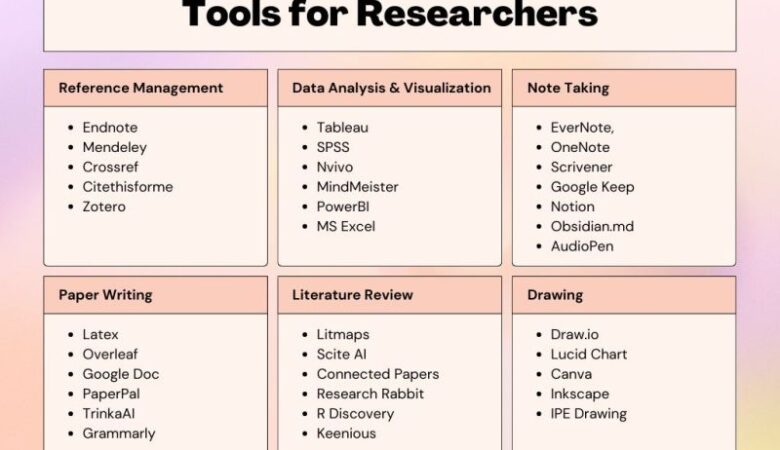
Best AI Tools For Research Paper Writing 2024
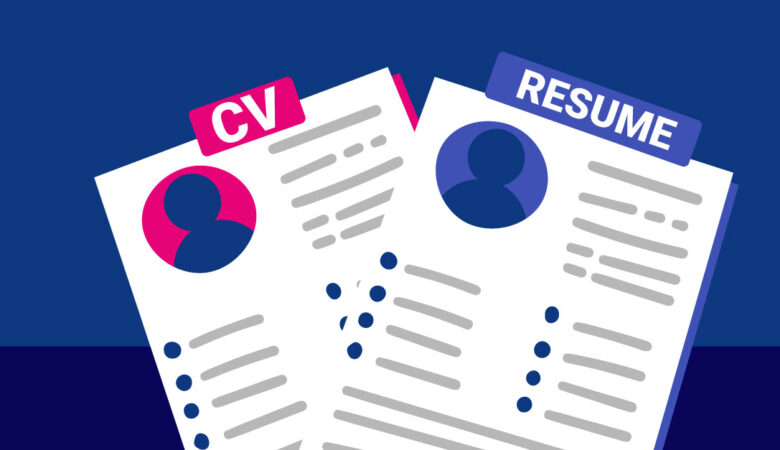
Resumes vs. CVs: What’s the Difference and Which One Should You Use?
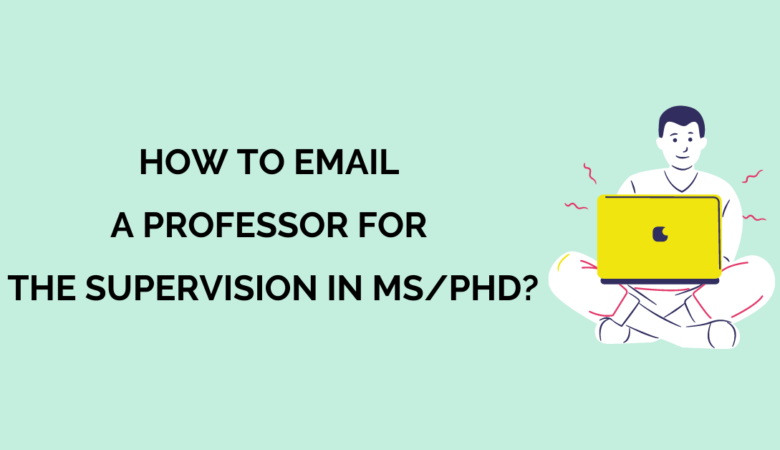
How To Write an Impressive Email To Professor For the Supervision in MS/PhD
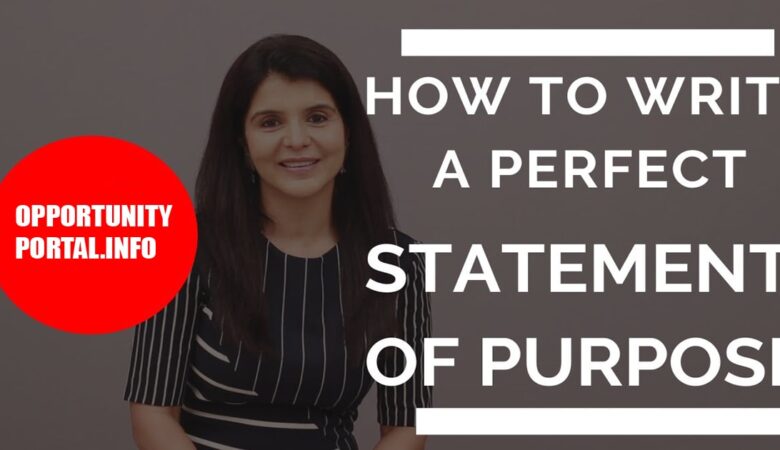
How To Write Statement of Purpose For Scholarships | Format & Winning Tips
[email protected]
I appreciate your extra ordinary support to give us wonderful guidance upon furthering our education through scholarships
Dear Professor,
Hope you are in good health and doing well. I am Syed Naseer Hussain shah from Pakistan. Recently, I have completed my M.Phil degree in Biochemistry with specialization in the field of drugs designing (Biological and Hypoglycemic effects of a poly herbal Extract on Alloxanized Diabetic Rats. (X = Insulin,liver Markers enzymes , LDH,HDL. ) and PHE Drug properties).
I am a keen learner and have sound basic concept in theoretical Biochemistry/Medicinal Chemistry, during this research period I have learnt Biological and Hypoglycemic effects of a polyherbal Extract on Alloxanized Diabetic Rats and drugs designing , which will surely help me in future studies. I have also attended National and International Conferences as given in My CV. My one research articles have published in an impact factor journals in American chemical scientific society(ACS) OMEGA and second is under review.
I have studied your profile and research interests very deeply. Based on my academic background and M. Phil degree (in Biochemistry/Medicinel chemistry ), I strongly believe that I can also get a place in your lab to do the research work of Doctorate degree under your kind supervision, which would be a great honor for me. I am ready to work under your kind supervision in the research project. I want myself to be there whether alone or in a group.
I would like to make a humble request to provide me a chance to prove my skills by accepting me as your Ph.D. candidate and supervise my doctorate degree.
I want to apply for A* Star scholarship program. I am expecting that I would meet your “acceptance letter”, then it will be easy for me to get the scholarship and I won’t have any funding problems over there.
I hope you will respond positively. I am attaching my CV. Please have a look on it. I hope you would find me as a humble and obedient candidate.
Thanks, in anticipation.
Best Regards
Syed Naseer Hussain shah
M.Phil (Biochemistry) Cell No +92-3435751640. Whatsapp No.+92342-6545699. Email. [email protected]
How I can apply for PhD program For Physics for 2023
Where we get email of professor?
Leave a Reply Cancel reply
Your email address will not be published. Required fields are marked *
Save my name, email, and website in this browser for the next time I comment.
Notify me of follow-up comments by email.
Notify me of new posts by email.
Subscribe to Blog via Email
Enter your email address to subscribe to this blog and receive notifications of new posts by email.
Email Address
Recent Posts
- University of Passau Scholarship In Germany 2025 (Funded)
- Universitas Sebelas Maret Scholarships 2025 In Indonesia (Fully Funded)
- Singapore International Graduate Award (SINGA) 2025 (Fully Funded)
Popular Posts
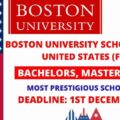
Boston University Scholarships In USA 2025 (Funded)

University of Miami Stamps Scholarship In USA 2024 (Fully Funded)
- University Navigation University Navigation
- Search Search Button
Gonzaga Home
- Student Life
College & Schools
- College of Arts & Sciences
- Center for Lifelong Learning
- Online Graduate Programs
- School of Business Administration
- School of Education
- School of Engineering & Applied Science
- School of Law
- School of Leadership Studies
- School of Health Sciences
- Future Students
- Current Students
- Military & Veterans
- Parents & Families
- Faculty & Staff
- Our Community
- Basketball Fans

- Search Button
- Toggle Menu
Collections
Publications, first-year admission writing prompts and requirements.

Fall is quickly approaching, so it’s time for first-year students to start filling out the Common Application if you plan to apply for Fall 2025 admission! The Common App is a fantastic resource that allows students to fill out one application that is then sent to all the schools they select. The Common App will ask you to complete a few different aspects, including an essay between 250 and 650 words. There are a few different prompts which you can choose from:
Some students have a background, identity, interest, or talent that is so meaningful they believe their application would be incomplete without it. If this sounds like you, then share your story.
The lessons we take from obstacles we encounter can be fundamental to later success. Recount a time when you faced a challenge, setback, or failure. How did it affect you, and what did you learn from the experience?
Reflect on a time when you questioned or challenged a belief or idea. What prompted your thinking? What was the outcome?
Reflect on something that someone has done for you that has made you happy or thankful in a surprising way. How has this gratitude affected or motivated you?
Discuss an accomplishment, event, or realization that sparked a period of personal growth and a new understanding of yourself or others.
Describe a topic, idea, or concept you find so engaging that it makes you lose all track of time. Why does it captivate you? What or who do you turn to when you want to learn more?
Share an essay on any topic of your choice. It can be one you've already written, one that responds to a different prompt, or one of your own design.
In addition to your Common App essay, many colleges and universities, including Gonzaga, require an additional supplemental question. For Gonzaga’s question, we do not require this to be the same length as your essay. This is a short answer question instead. Your response should be between five to ten sentences with a limit of 300 words. The two prompts for you to choose from are:
- A Gonzaga education promotes dedication to human dignity, social justice, diversity, global engagement, solidarity with the vulnerable, and environmental stewardship. Reflecting on these values, how have you shown your commitment to standing for and with others in your actions?
- Gonzaga’s Presidential Speaker’s Series invites leaders from around the world (such as LTC Olga Custodio, America's first Latina military pilot or Cotopaxi founder Davis Smith) to share their work and passions with the GU community. If you were able to invite any living person to come and speak to the GU community, who would it be? Why would you want to invite them?
When completing your essay and supplemental question, be sure to check for correct spelling, punctuation, and grammar. It’s easy to miss the little things when you are the one writing. I encourage students to have another person read their writing before submitting to catch any errors that they may have missed. When our admission staff review your application, we are looking for solid writing skills to demonstrate your learning in your many years of English and writing classes. You do not need to write a novel, but do submit your best work!
Good luck as you complete your application reach out to your admission counselor if you have any questions or concerns..

Fresh Graduate Cover Letter
Cover letter maker.

Applying for your first job or internship after graduation can be challenging, especially when you have little to no experience in the workforce. A well-crafted cover letter can significantly increase your chances of landing that dream job. This article will guide you on how to write an effective fresh graduate cover letter, provide examples, and offer practical tips to help you stand out from the competition.
What is a Fresh Graduate Cover Letter?
A Fresh Graduate Cover Letter is a document accompanying a resume, specifically written by recent graduates seeking their first job or internship opportunity. This letter focuses on their academic achievements, internship experience, coursework, and relevant skills that align with the job’s requirements.
What is the Best Example of a Fresh Graduate Cover Letter?
The best cover letter example of a fresh graduate seamlessly merges academic accomplishments, relevant skills, and any internships or volunteer work to demonstrate a candidate’s potential to succeed in the targeted role. The key is to focus on transferable skills and highlight how you can contribute to the company.
Dear Hiring Manager,
I am excited to apply for the junior analyst position at XYZ Company, as advertised on your careers page. As a recent Business Administration graduate from ABC University, I am eager to apply my academic knowledge in a practical setting.
During my time at ABC University, I majored in Finance and completed an internship with DEF Firm. I worked directly under the senior analyst and assisted with data analysis and presentation. This experience, combined with my academic background, makes me a strong candidate for this position.
I am confident that my passion for data analysis and strong analytical skills would allow me to make a significant contribution to the XYZ team. Thank you for considering my application. I look forward to the opportunity to discuss how I can contribute to your team.
Yours Sincerely, [Your Name]
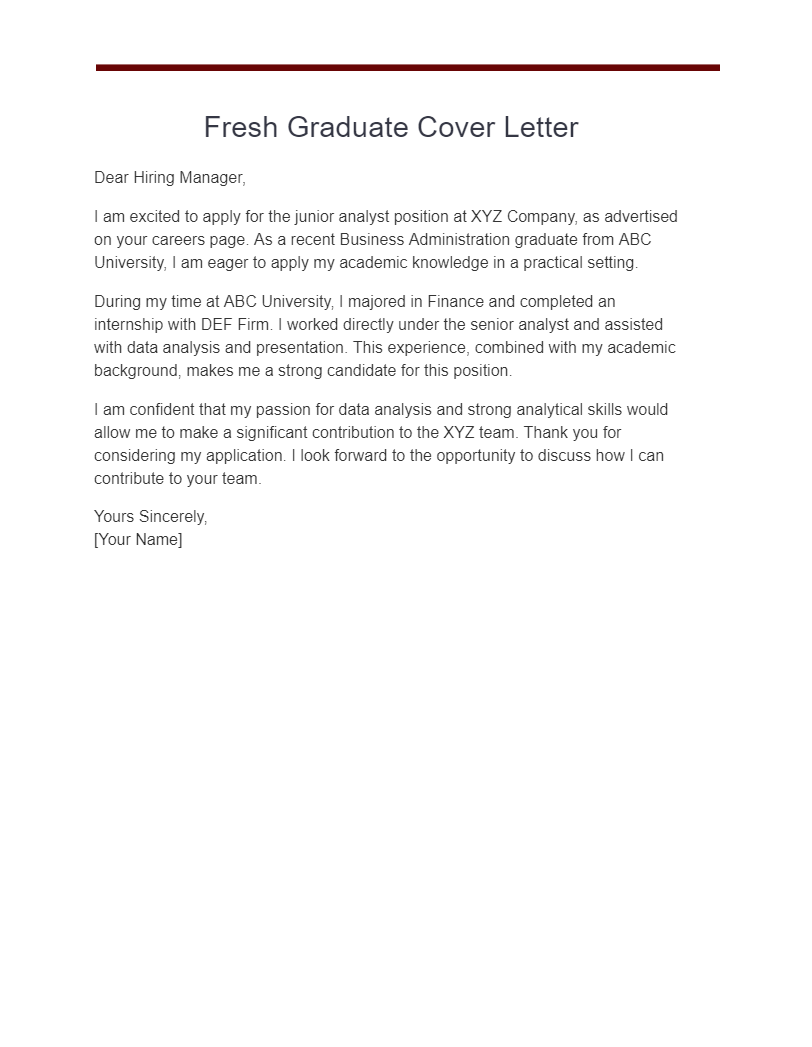
Size: 27 KB
Free Fresh Graduate Cover Letters – Copy & Paste
We understand that writing a cover letter can be daunting, especially when you’re fresh out of college. Here are some free templates to guide you. You can copy, paste, and customize them to suit your specific circumstances and the job you’re applying for.
Fresh Graduate Cover Letter with No Experience Example
Writing a cover letter with no work experience can be a challenge, but it’s certainly not impossible. In such a case, your aim should be to highlight your academic achievements, volunteer work, internships, and transferable skills. The example below is a guide on how to write a compelling cover letter even with no work experience:
Dear [Hiring Manager’s Name],
I am writing to apply for the [Job Title] position at [Company Name], as advertised on [Job Advertisement Source]. As a recent graduate from [Your University] with a degree in [Your Degree], I am eager to start my career in [Industry Name] with an innovative company such as yours.
During my time at university, I [talk about a project or accomplishment]. Additionally, I developed strong [mention specific skills] skills, which I believe are highly applicable to the role of [Job Title].
I am excited about the opportunity to bring my unique blend of skills and experience to your esteemed company and am confident in my ability to become a productive member of your team.
Thank you for considering my application.
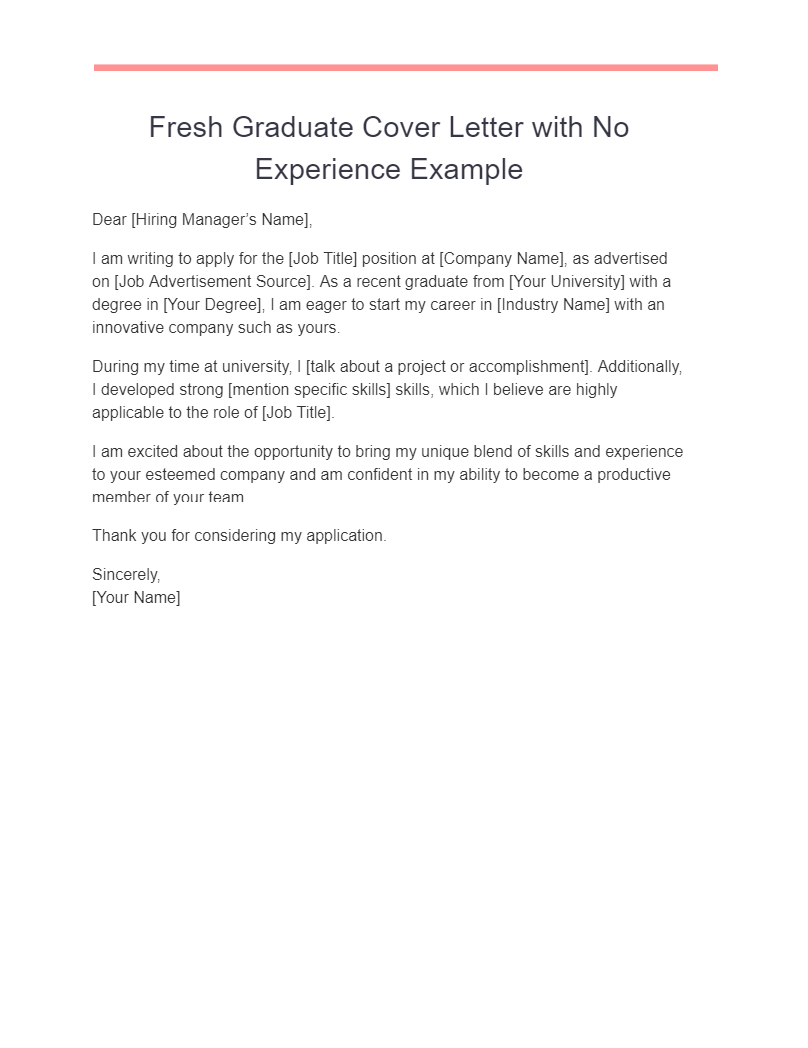
Size: 26 KB
How to Use: Use this template as a guide. Remember to personalize it with your own details, and add specific accomplishments and skills that align with the job description. Tailoring your cover letter to each job application will show the hiring manager that you’re genuinely interested in the position and the company.
Fresh Graduate Cover Letter for Job Application Examples
Crafting an effective cover letter for job application as a fresh graduate for a specific job application requires highlighting your academic achievements, relevant coursework, internships, or projects related to the job. Here is an example to guide you:
I am writing to apply for the [Job Title] position at [Company Name] as advertised on [Job Advertisement Source]. As a recent graduate from [University Name] with a degree in [Degree Name], I believe I am well-equipped to contribute effectively to your team.
In my final year project, I worked on [describe the project and your role briefly]. This experience gave me hands-on exposure to [mention relevant skills or knowledge that are pertinent to the job]. I am eager to apply this knowledge and grow further at [Company Name].
Thank you for considering my application. I look forward to the possibility of discussing my application with you further.
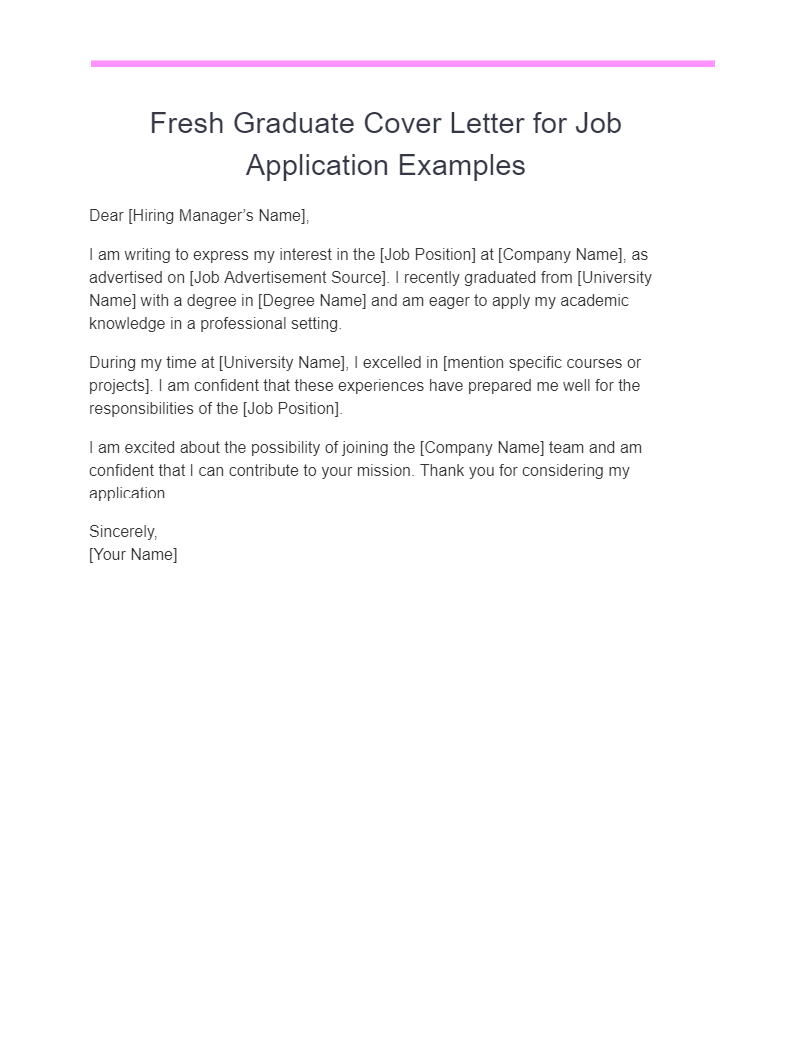
How to Use: Remember to replace the placeholders with your information and tailor the content to match the job requirements and the company’s culture.
Fresh Engineering Graduate Cover Letter Example
As a fresh engineering graduate, your cover letter should highlight technical skills, academic projects, and engineering internships. Here’s an example:
I’m writing to apply for the [Job Title] position at [Company Name], as advertised on [Job Advertisement Source]. I recently graduated from [University Name] with a Bachelor’s degree in [Engineering Discipline].
During my time at university, I worked on a project [describe the project and your role], which helped me develop practical skills in [mention specific engineering skills]. In addition, my internship at [Company Name] allowed me to gain hands-on experience in the field.
I am eager to contribute my energy, dedication, and technical skills to your esteemed company. Thank you for considering my application.
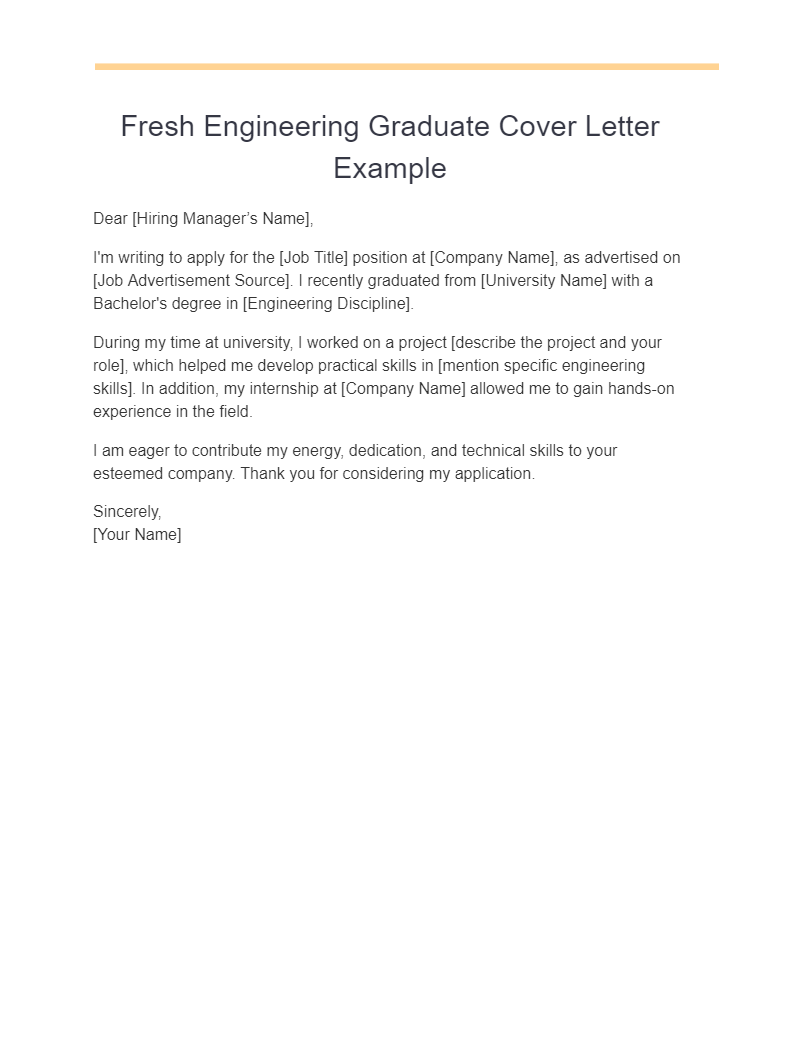
How to Use: Adapt this engineering cover letter to fit your own experiences and achievements. Be sure to highlight engineering projects or internships that align with the job you’re applying for.
Fresh Medical Graduate Cover Letter Example
A cover letter for a fresh medical graduate should focus on clinical experiences, internships, and your passion for medicine. Here’s a suitable example:
I am writing to express my interest in the [Job Title] position at [Company Name], as advertised on [Job Advertisement Source]. As a recent graduate from [University Name] with a [Degree Name], I am eager to begin my career at your respected institution.
During my clinical rotations at [Hospital/Clinic Name], I gained hands-on experience in [specific medical skills]. My experience, coupled with my passion for helping others, makes me a strong candidate for this position.
I look forward to the opportunity to provide compassionate and dedicated care to your patients. Thank you for considering my application.
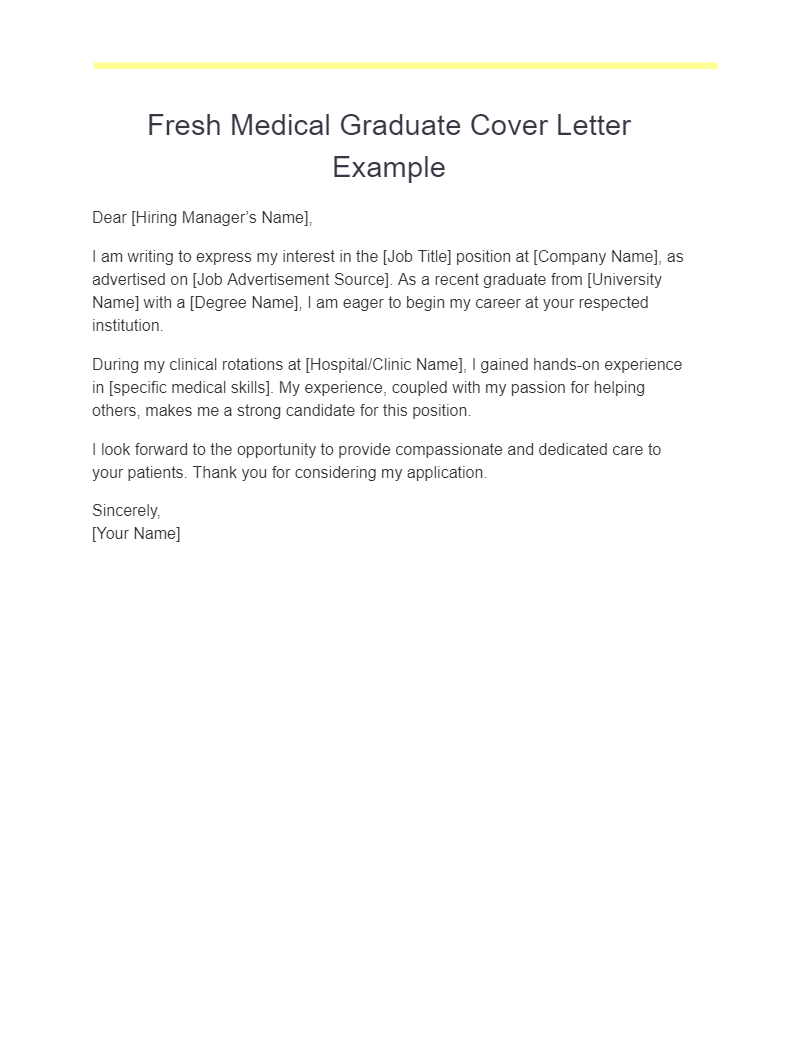
How to Use: Modify this example by inserting your details, the hiring manager’s name, and specific skills or experiences relevant to the job.
Fresh Architect Graduate Cover Letter Example
A fresh architect graduate cover letter should showcase your design skills, technical knowledge, and any relevant projects or internships you’ve completed. Here’s an example:
I’m applying for the [Job Title] position at [Company Name], which I saw listed on [Job Advertisement Source]. I have recently graduated from [University Name] with a Bachelor’s degree in Architecture.
In my final year, I was part of a project [describe the project and your role]. This experience allowed me to develop my design and technical skills in [mention specific skills].
I am excited about the opportunity to contribute to [Company Name] and to grow as a professional. Thank you for considering my application.
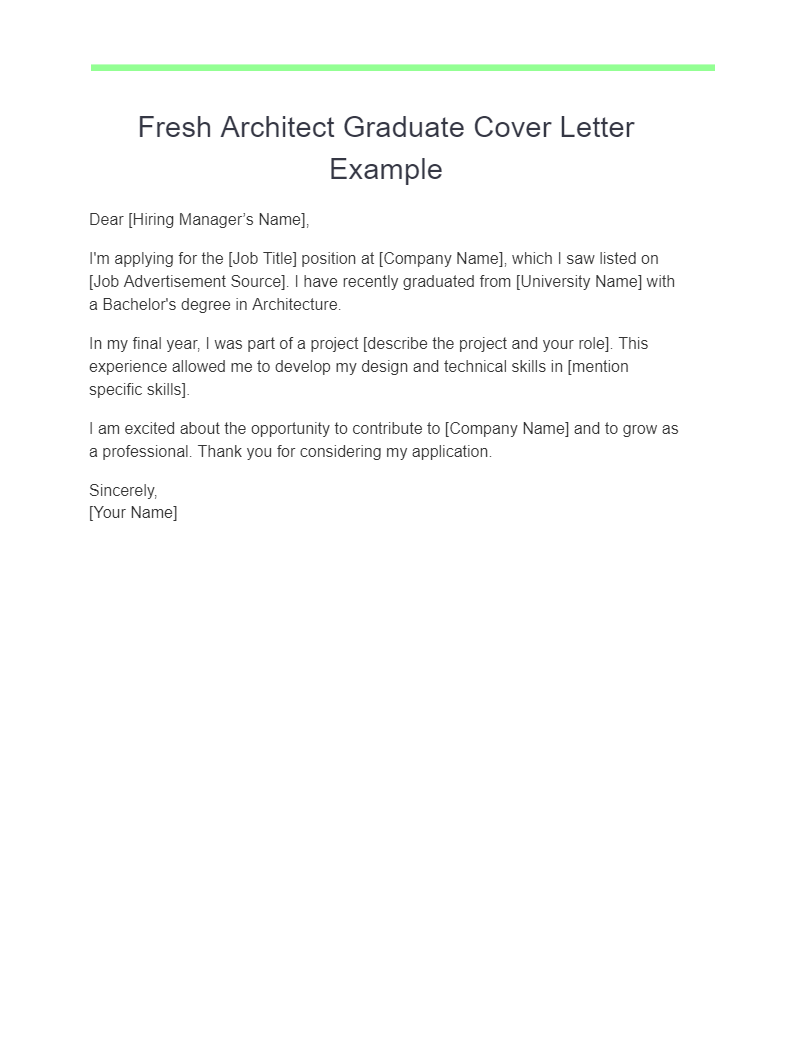
Size: 188 KB
How to Use: Personalize this template by including your specific experiences, skills, and academic achievements related to the field of architecture.
Fresh Graduate Cover Letter for Customer Service Example
As a fresh graduate applying for a customer service position, your cover letter should highlight your communication skills, problem-solving abilities, and any customer service or sales-related experience. Here’s a sample:
I am writing to apply for the [Job Title] position at [Company Name] as advertised on [Job Advertisement Source]. I recently graduated from [University Name] with a degree in [Degree Name], and I believe my skills and experiences align with your needs.
During my part-time role at [Previous Company Name], I developed strong customer service skills and a solution-focused mindset. I also learned to handle customer complaints and maintain a positive customer experience.
I am excited about the possibility of bringing my unique blend of skills and experience to [Company Name]. Thank you for considering my application.
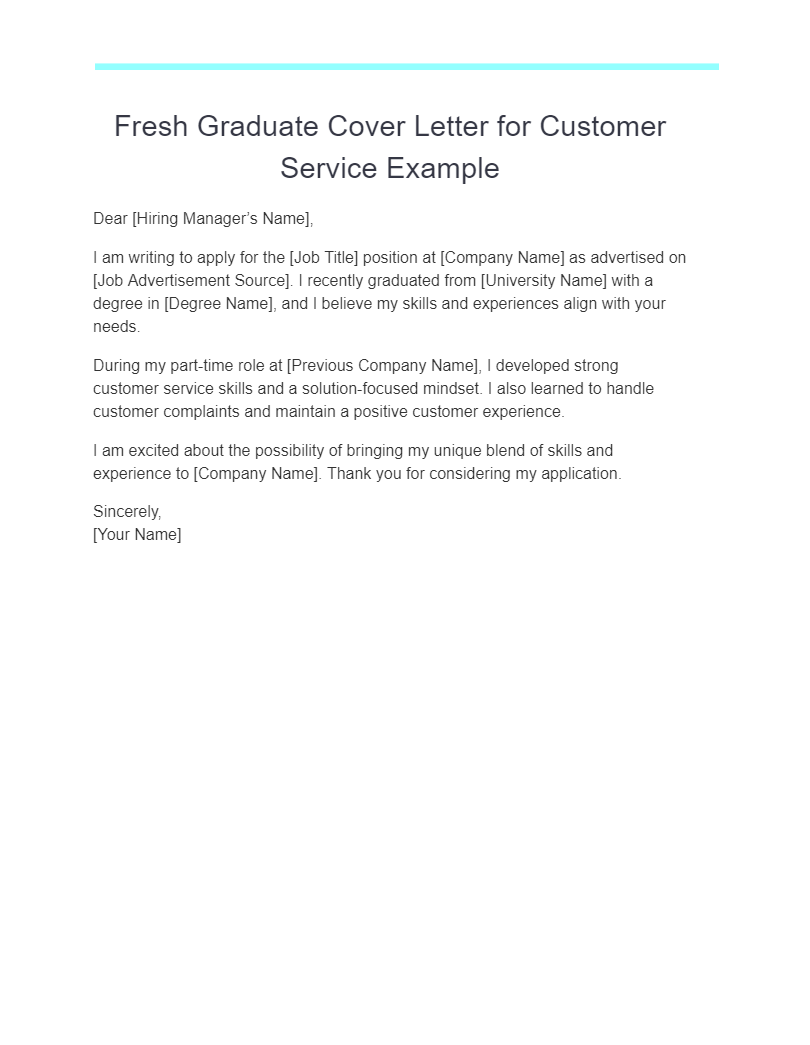
How to Use: Modify this customer service cover letter to include your own experiences, especially any roles or projects where you have demonstrated strong customer service skills.
Fresh Graduate Cover Letter for Internship Example
When applying for an internship as a fresh graduate, your cover letter should highlight your eagerness to learn, relevant coursework, and any academic or extracurricular achievements. Here’s a sample:
Dear [Hiring Manager’s Name],
I’m excited to apply for the internship position at [Company Name] which I discovered on [Job Advertisement Source]. As a recent graduate from [University Name] with a degree in [Degree Name], I’m eager to apply my knowledge in a practical setting.
During my university career, I excelled in [mention specific courses or projects], which I believe will be beneficial for this role. My professors commended my [mention specific skills or attributes], and I’m confident these will be valuable in this internship.
Thank you for considering my application. I am looking forward to the possibility of contributing to [Company Name].
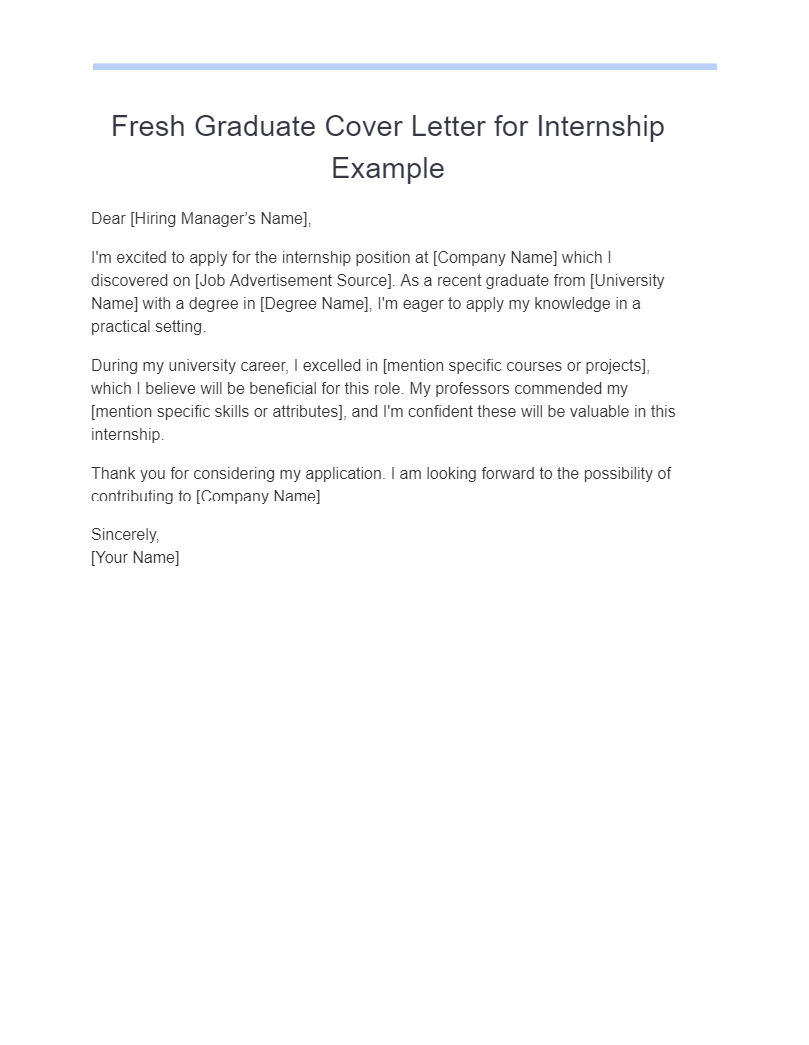
How to Use: Modify this template by including your specific academic and extracurricular achievements. Highlight skills and experiences that align with the internship role.
Fresh Graduate Cover Letter for Bank Teller Example
A fresh graduate cover letter for a bank teller position should showcase your attention to detail, mathematical skills, and any relevant internships or part-time roles. Here’s a sample:
I am writing to apply for the Bank Teller position at [Company Name] that I saw advertised on [Job Advertisement Source]. I recently graduated from [University Name] with a degree in [Degree Name], and I am eager to apply my skills in the banking industry.
During my time at university, I took several courses in banking and finance, which have given me a solid understanding of banking principles. I also completed an internship at [Internship Company Name], where I developed strong customer service skills.
I am excited about the possibility of bringing my dedication and strong work ethic to [Company Name]. Thank you for considering my application.
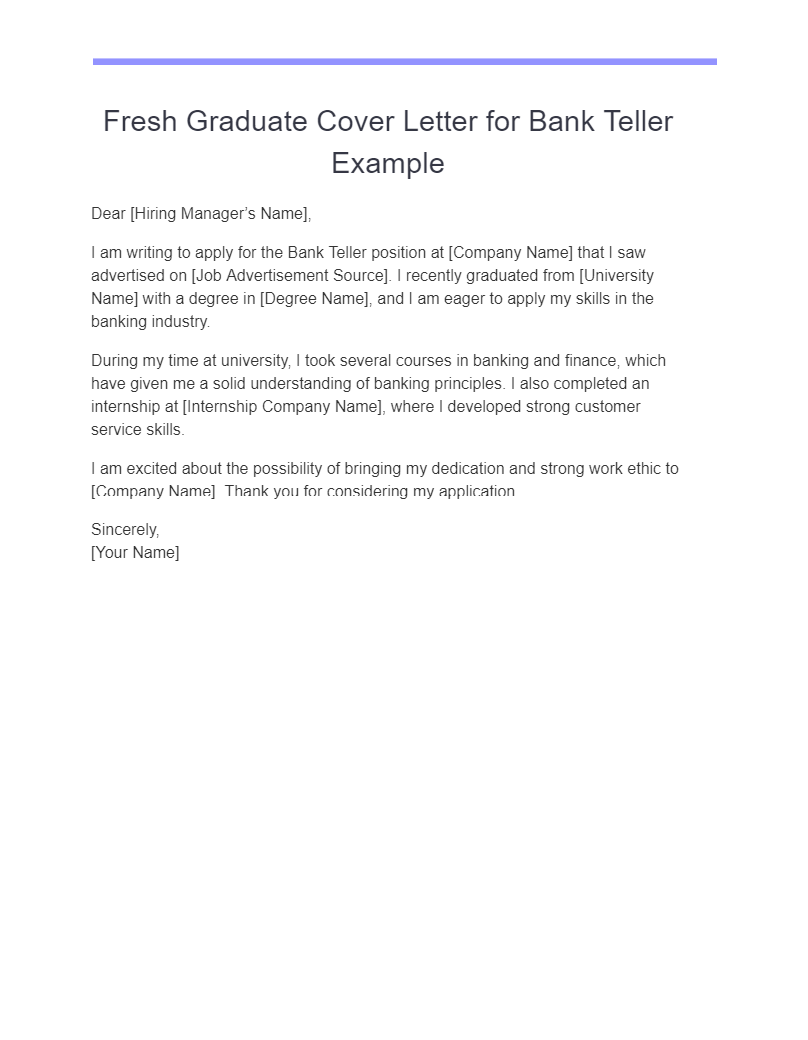
How to Use: Personalize this template by including your specific experiences, especially any roles or projects where you have demonstrated relevant skills.
Fresh Graduate Cover Letter for Finance Management Example
Applying for a position in finance management as a fresh graduate necessitates a cover letter that highlights analytical skills, attention to detail, and knowledge of financial principles. Consider this example:
I am excited to apply for the Finance Management trainee position at [Company Name] that I learned about from [Job Advertisement Source]. As a recent graduate from [University Name] with a degree in [Degree Name], I am eager to bring my financial acumen to your team.
My coursework in corporate finance, investment strategies, and business valuation, along with my proficiency in Excel, makes me a strong candidate for this position. During my internship at [Internship Company Name], I gained hands-on experience in financial reporting and analysis.
I am confident that I can contribute to [Company Name]’s goals and look forward to potentially joining your team. Thank you for considering my application.
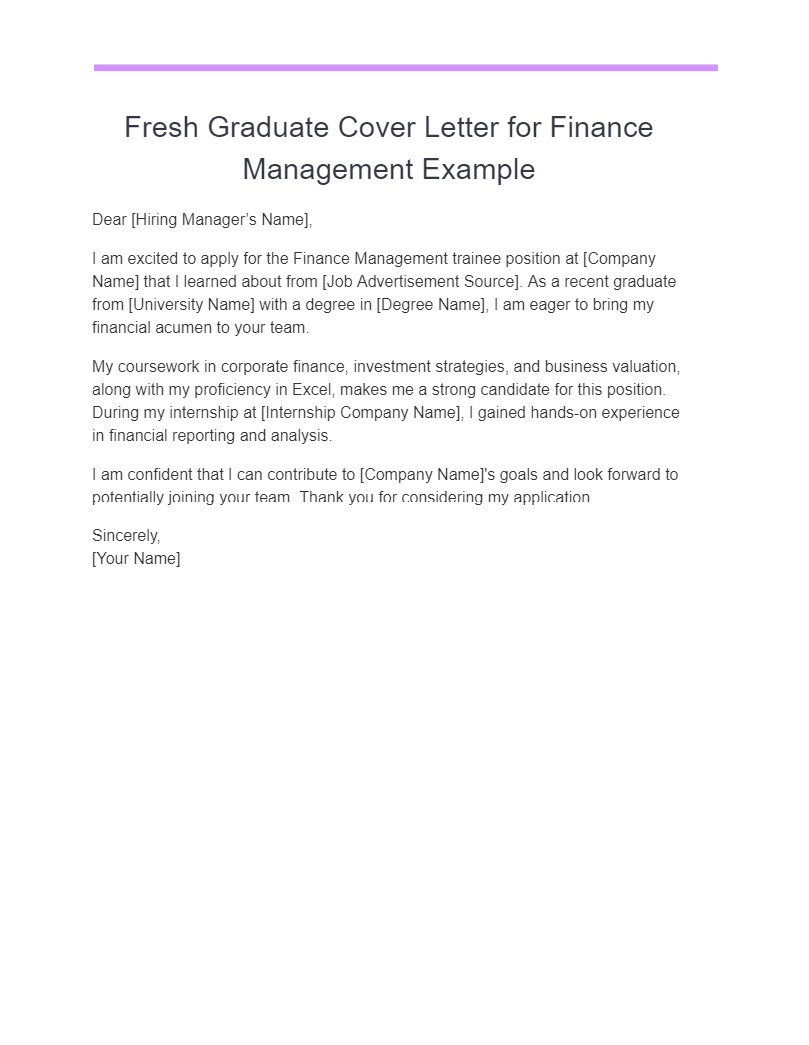
How to Use: Modify this finance cover letter to fit your specific skills and experiences. Highlight academic and internship experiences relevant to finance management.
Fresh Graduate Cover Letter for Job Application Example
For a fresh graduate job application, the cover letter should exhibit transferable skills, academic knowledge, and a willingness to learn. Here is an example:
I am writing to express my interest in the [Job Position] at [Company Name], as advertised on [Job Advertisement Source]. I recently graduated from [University Name] with a degree in [Degree Name] and am eager to apply my academic knowledge in a professional setting.
During my time at [University Name], I excelled in [mention specific courses or projects]. I am confident that these experiences have prepared me well for the responsibilities of the [Job Position].
I am excited about the possibility of joining the [Company Name] team and am confident that I can contribute to your mission. Thank you for considering my application.
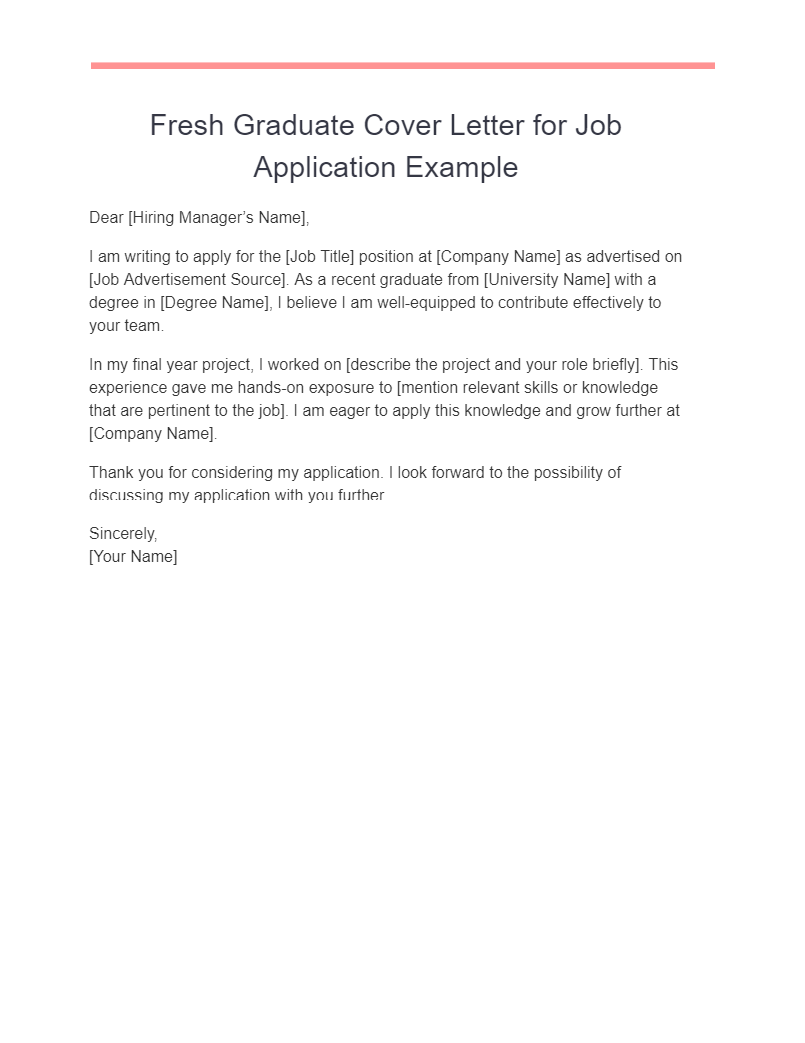
How to Use: This general template can be adapted to any job application. Include specifics about your degree and university experience, and tailor the letter to the job responsibilities.
Fresh Mechanical Engineering Graduate Cover Letter Example
A cover letter for a fresh mechanical engineering graduate should emphasize technical knowledge, hands-on experiences during internships or projects, and problem-solving skills. Here is an example:
I am writing to apply for the Mechanical Engineer position at [Company Name] that was advertised on [Job Advertisement Source]. I recently graduated from [University Name] with a Bachelor’s degree in Mechanical Engineering and I am excited to apply the skills I have acquired in a practical setting.
During my university studies, I undertook a project on [briefly describe a project or achievement], which honed my problem-solving and teamwork skills. My internship at [Internship Company Name] gave me hands-on experience in designing mechanical systems and conducting failure analysis, both of which are critical for the [Job Position].
I am eager to bring my engineering skills to [Company Name] and contribute to your ongoing projects. Thank you for considering my application.
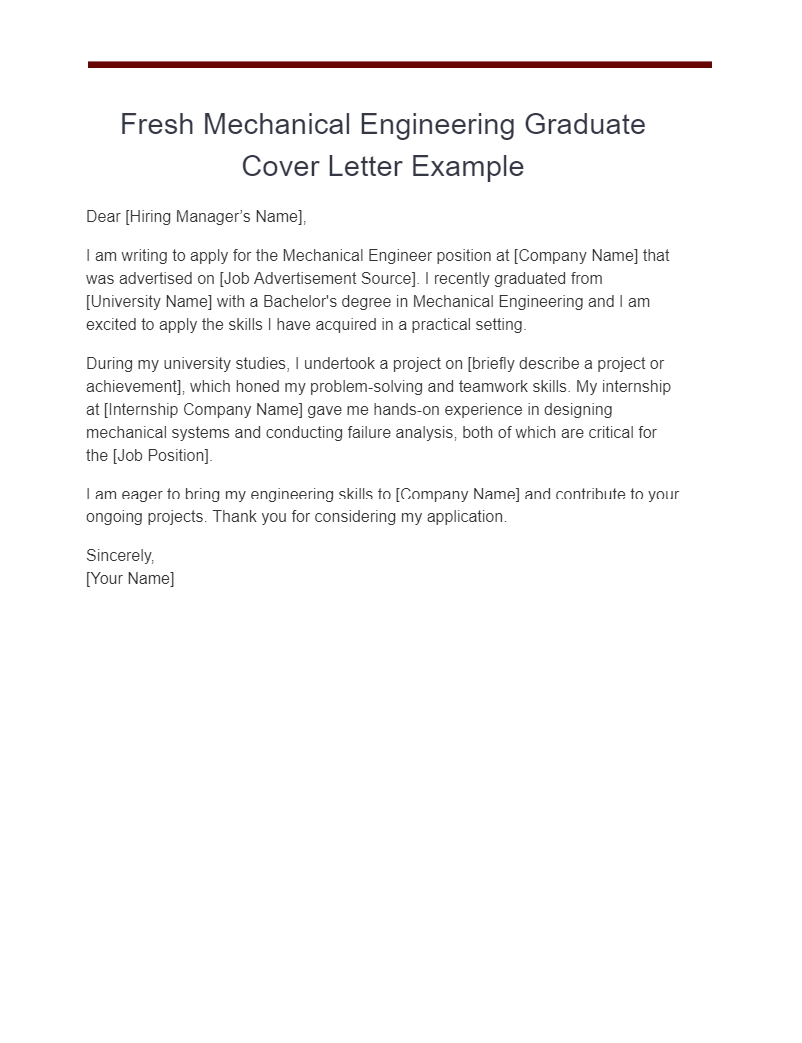
How to Use: Modify this template to fit your specific skills and experiences. Highlight academic and internship experiences relevant to mechanical engineering.
Sample Fresh Graduate Cover Letter Example
A general cover letter sample for fresh graduates across fields may look like this:
I am writing to apply for the position of [Job Position] at [Company Name], as advertised on [Job Advertisement Source]. Having recently graduated from [University Name] with a degree in [Degree Name], I am excited to bring my skills and knowledge to your team.
Throughout my academic career, I have demonstrated [mention specific skills or accomplishments]. These experiences have equipped me with the ability to [describe how these experiences will benefit the job role].
I look forward to the opportunity of discussing my application with you further. Thank you for considering my application.
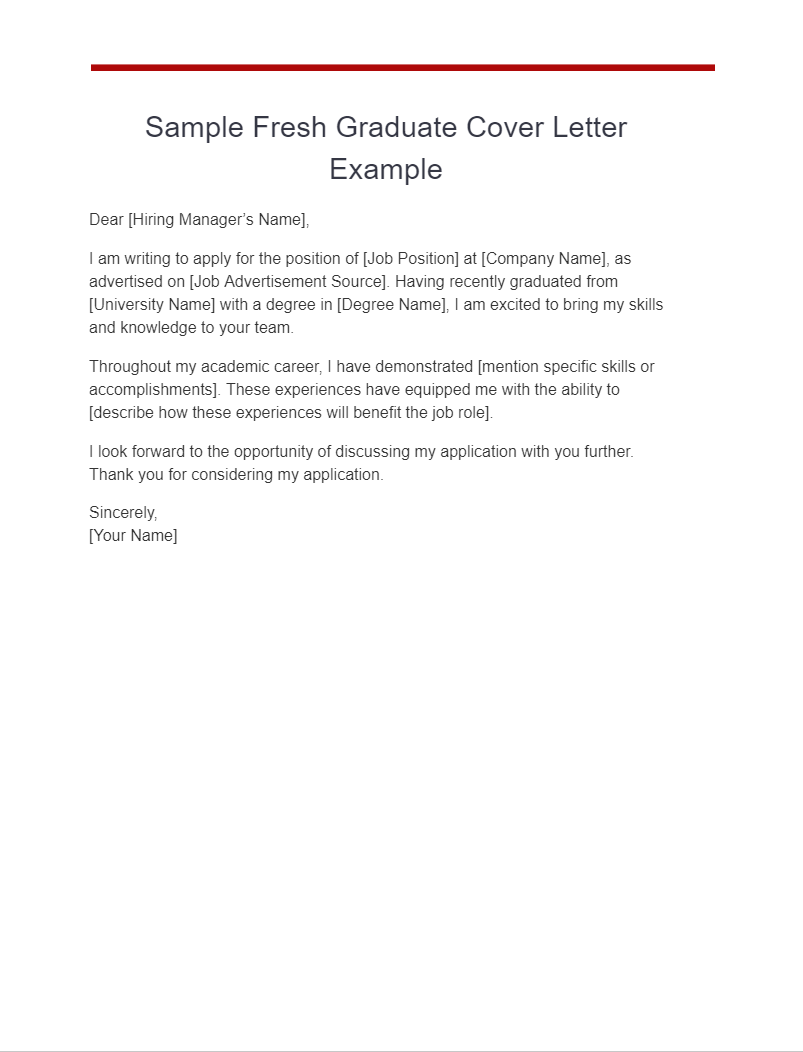
How to Use: This is a broad fresh graduate cover letter template that can be modified to suit any job application. Replace the placeholders with your specific details and tailor the skills and experiences to match the job description.
Fresh Graduate Cover Letter for Human Resource Example
A fresh graduate applying for a position in human resources should highlight their understanding of employee relations, data analysis, and legal regulations. Let’s consider this example:
I am excited to apply for the Human Resource Assistant position at [Company Name] as advertised on [Job Advertisement Source]. I recently graduated from [University Name] with a Bachelor’s degree in Human Resources Management and am eager to start my career in your esteemed organization.
During my final year, I completed an internship with [Company Name], where I gained firsthand experience in employee relations, HR software, and legal compliance. I believe these skills will greatly contribute to your team.
I look forward to the possibility of contributing to [Company Name]. Thank you for considering my application.
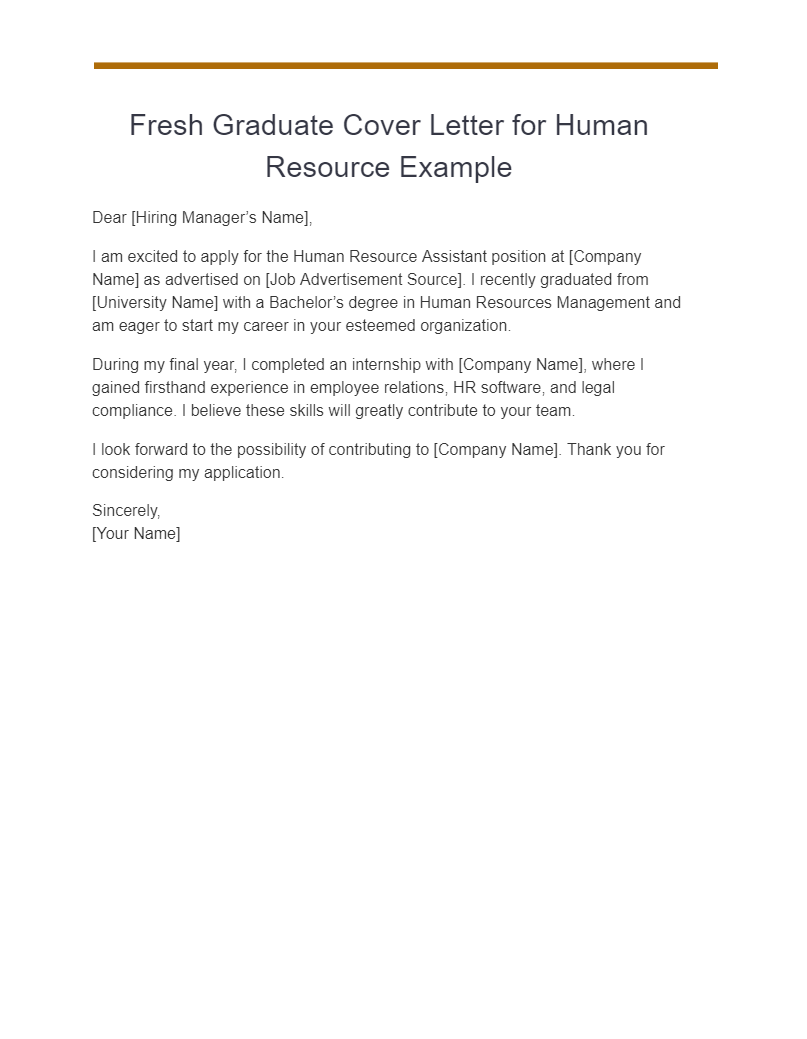
How to Use: Customize this human resource cover letter with your details. Emphasize any internship experiences, HR-related coursework, or capstone projects.
Fresh Graduate Cover Letter for Accounting Example
For an accounting position, a fresh graduate should emphasize their proficiency with accounting software, attention to detail, and understanding of accounting principles. Here’s an example:
I am writing to apply for the Accountant position at [Company Name] advertised on [Job Advertisement Source]. I am a recent graduate from [University Name] with a Bachelor’s degree in Accounting, ready to start my career in the field.
At university, I took part in an intensive Accounting practicum where I developed strong analytical skills and familiarity with popular accounting software, such as QuickBooks and Sage. I am confident that my skills will contribute to [Company Name].
Thank you for considering my application. I look forward to the possibility of discussing it further with you.
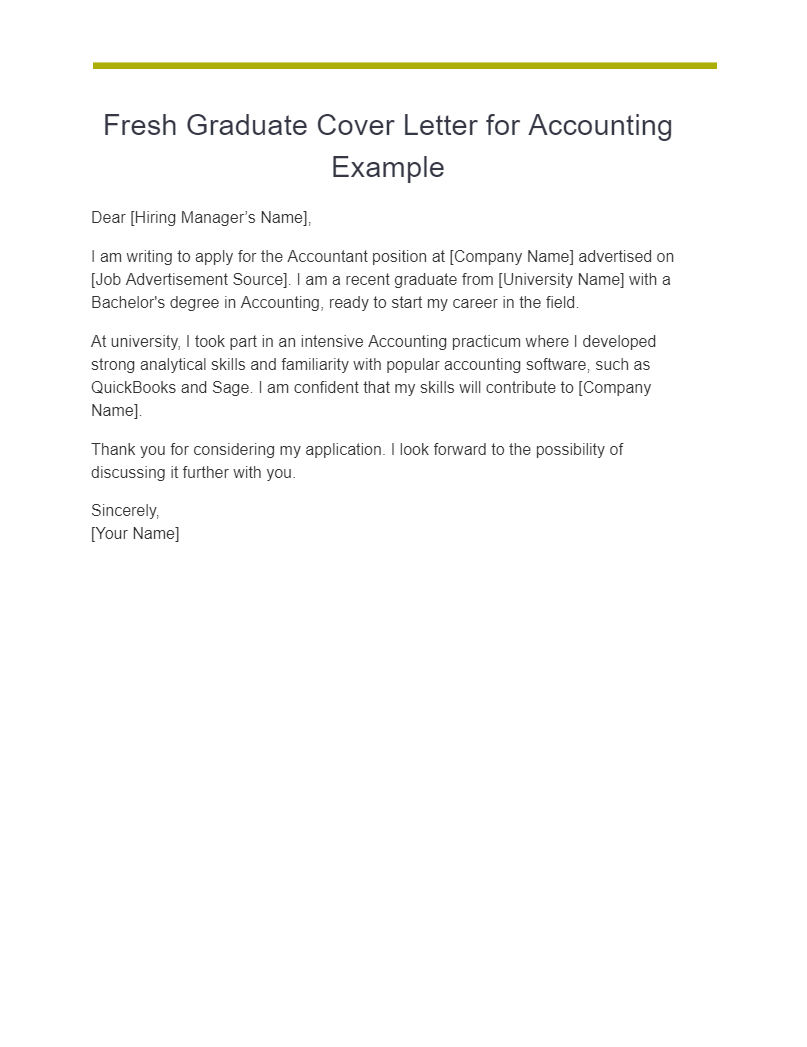
How to Use: Adapt this letter by including specific coursework or projects relevant to the job role. You can also mention certifications (like CPA) if you have any.
Fresh Graduate Cover Letter for Business Administration Example
For a Business Administration role, a fresh graduate can underline their understanding of business processes, organizational behavior, and project management. Here is a great example:
I’m thrilled to apply for the Business Administration Trainee position at [Company Name], as posted on [Job Advertisement Source]. I am a recent graduate from [University Name] with a degree in Business Administration and am keen to apply the knowledge and skills I have acquired in a practical setting.
As part of my course, I have completed projects in areas such as project management, organizational behavior, and business strategy. I believe these experiences will be beneficial to [Company Name] and align with the duties of the position.
I look forward to the opportunity to discuss my application further.
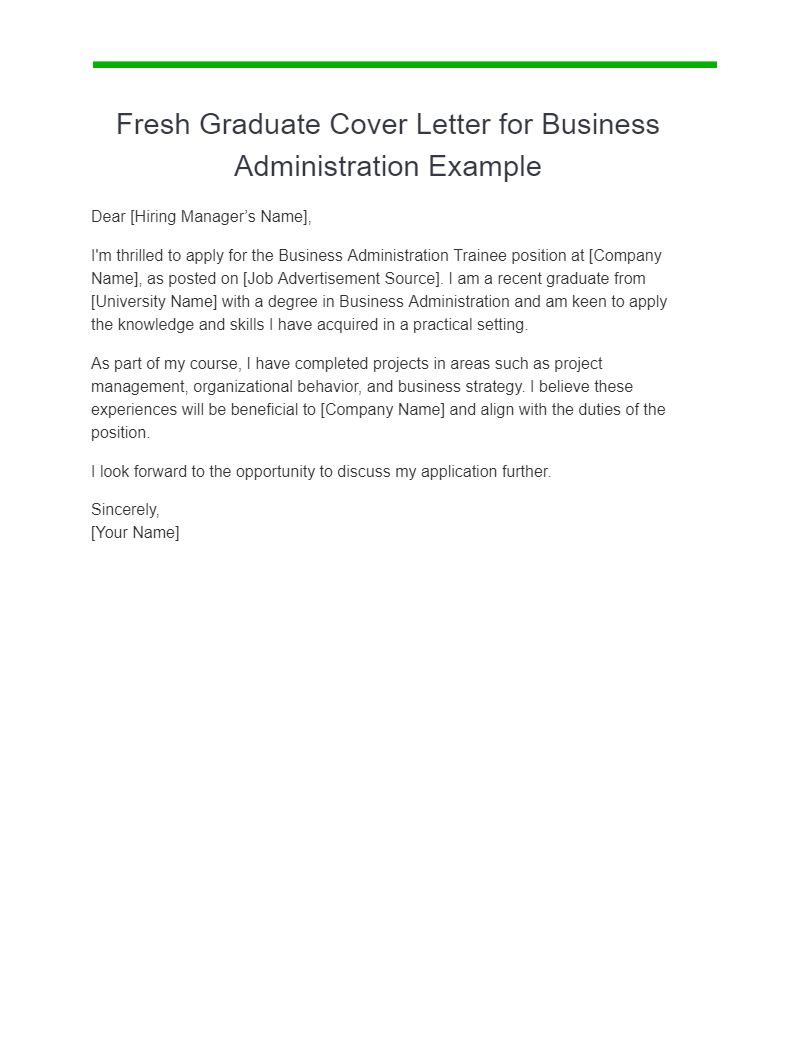
How to Use: Replace the brackets with your own information, and feel free to highlight any specific business administration projects or internships that would make you a strong candidate.
Fresh Graduate Cover Letter for Interior Design Example
A fresh graduate applying for an Interior Design role might want to highlight their creativity, knowledge of design software, and understanding of design principles. Here’s a sample:
I am writing to apply for the Interior Designer position at [Company Name] listed on [Job Advertisement Source]. As a recent graduate from [University Name] with a degree in Interior Design, I am eager to apply my creative skills and education in a practical setting.
I have developed a keen eye for design and a proficiency in [mention design software], which I believe align well with the job description. In addition, my senior year project, which involved redesigning a commercial space, has given me practical experience that I can bring to your team.
Sincerely, [Your Name]
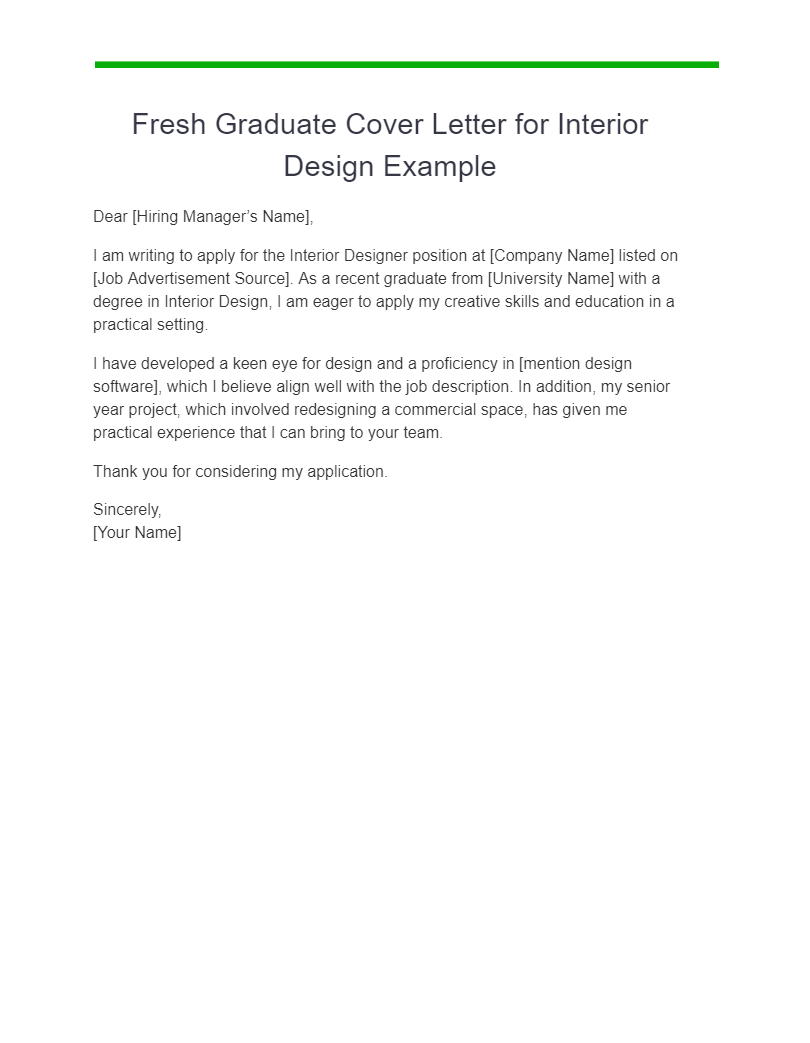
How to Use: Be sure to include details about your design software skills and any hands-on experience from school projects or internships.
Fresh Graduate Cover Letter for Graphic Designer Example
A graphic designer cover letter for fresh graduate can highlight their creative skills, software expertise, and understanding of design principles. Here’s a sample:
I am excited to apply for the Junior Graphic Designer position at [Company Name], as advertised on [Job Advertisement Source]. As a recent graduate from [University Name] with a degree in Graphic Design, I am passionate about visual communication and eager to put my creativity to work.
In my coursework, I honed my skills in Adobe Creative Suite, which I understand is a requirement for this position. My portfolio, which I have included as an attachment, demonstrates a variety of design skills including typography, color theory, and digital illustration.
I look forward to potentially discussing my qualifications further.
How to Use: Replace the placeholders with your details. Make sure to highlight any specific graphic design software skills or projects that you have worked on.
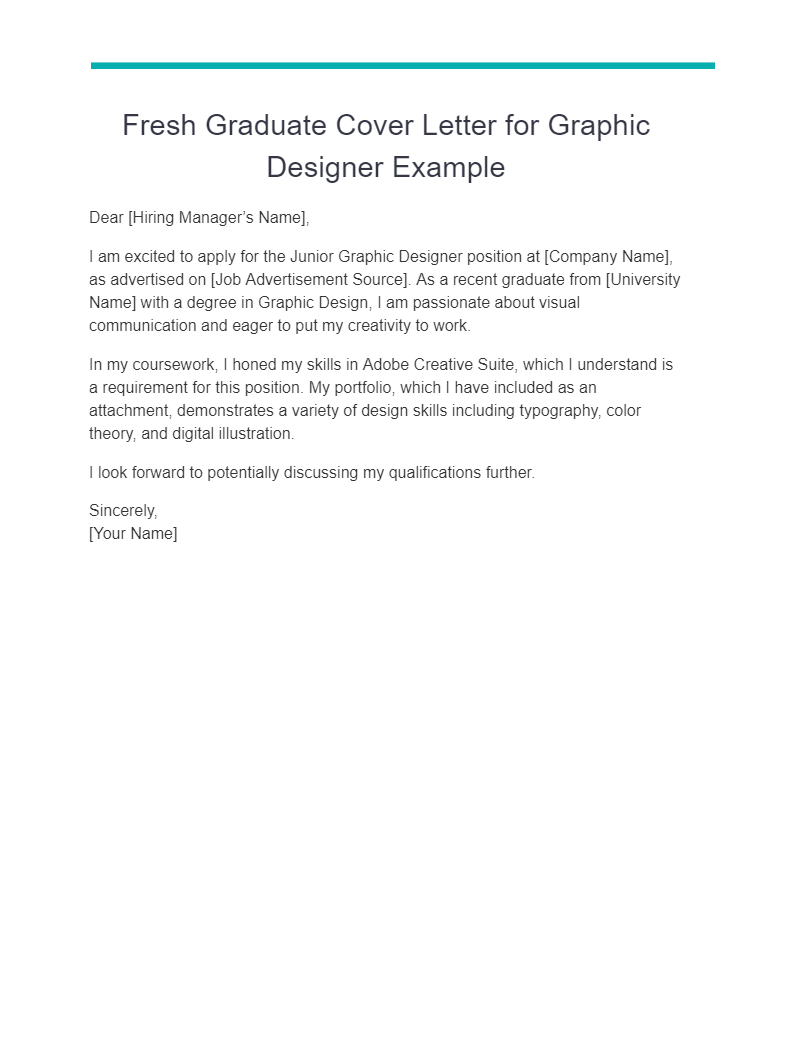
General Fresh Graduate Cover Letter Example
For a more general application, a fresh graduate might highlight transferable skills, academic achievements, and eagerness to learn. Here’s an example:
I am eager to apply for the [Job Title] role at [Company Name], as listed on [Job Advertisement Source]. As a recent graduate from [University Name] with a degree in [Your Degree], I am confident that my academic achievements and passion for learning will make me a strong candidate for this role.
I have honed my skills in research, project management, and teamwork during my time at university and I’m excited to bring these skills to a professional setting.
How to Use: Be sure to include information about your degree and any transferable skills that would be relevant to the role you’re applying for.
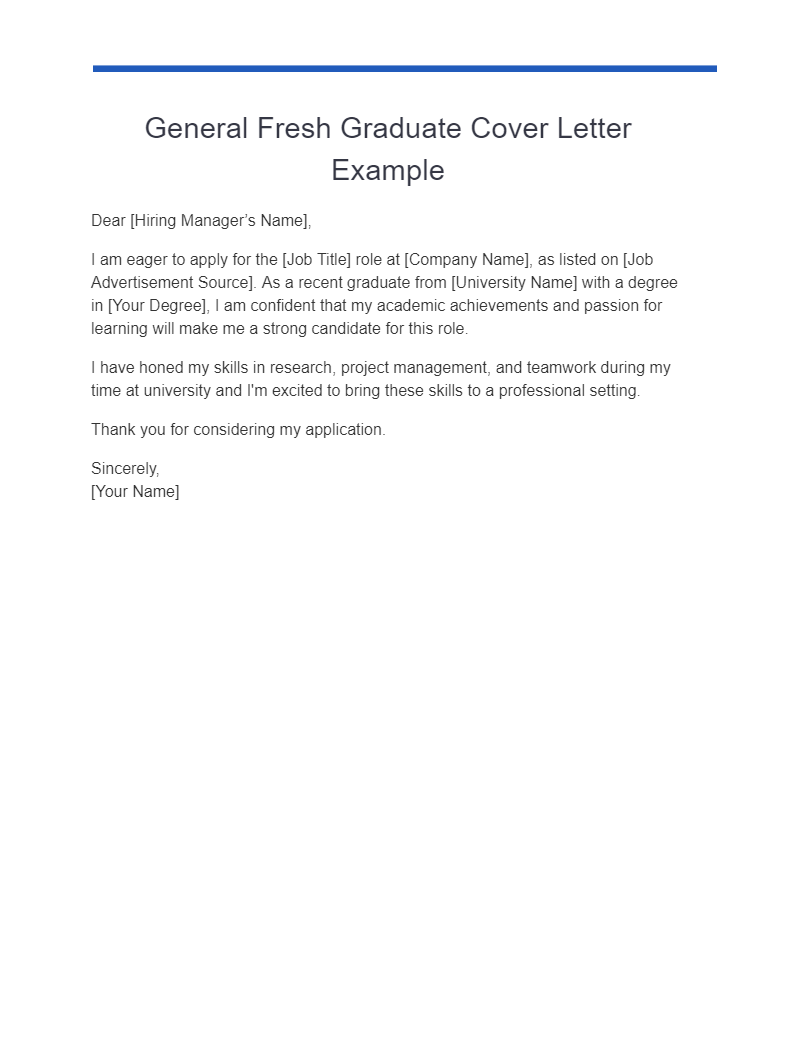
Fresh College Graduate Cover Letter Example
For fresh college graduates, a cover letter might highlight academic accomplishments, internships, and relevant coursework. Here’s a sample:
I’m thrilled to apply for the [Job Title] role at [Company Name] advertised on [Job Advertisement Source]. As a recent graduate from [University Name], I have a strong educational foundation in [Your Major], and I am eager to bring my knowledge and enthusiasm to this role.
During my time in college, I completed an internship at [Internship Company] where I gained experience in [describe what you learned or did]. I believe this experience, coupled with my academic accomplishments, makes me a strong fit for this role.
How to Use: Replace the placeholders with your details. Highlight any internships, relevant coursework, or academic accomplishments that make you a strong candidate for the role.
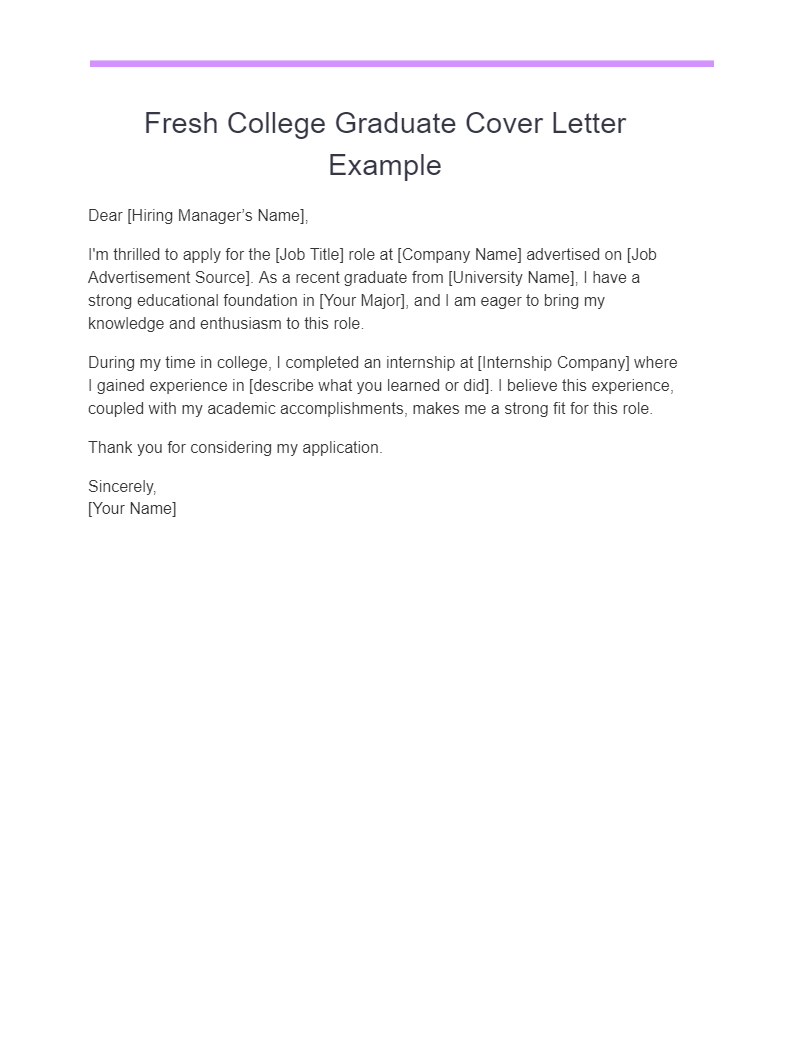
Fresh Graduate Cover Letter for Technician Example
A technician’s cover letter would showcase technical skills, practical experience, and relevant academic knowledge. Here’s a sample:
I am excited to apply for the Technician position at [Company Name], as listed on [Job Advertisement Source]. As a recent graduate of [University/College Name] with a degree in [Your Degree], I am well equipped with the theoretical knowledge and practical training necessary for this role.
During my academic tenure, I gained hands-on experience in troubleshooting, maintaining and repairing various types of equipment, which I believe will serve me well in this role. I am confident in my ability to quickly learn and adapt to new systems and procedures.
How to Use: Personalize this letter by including specific details about the technical skills and experience you possess that align with the job requirements.
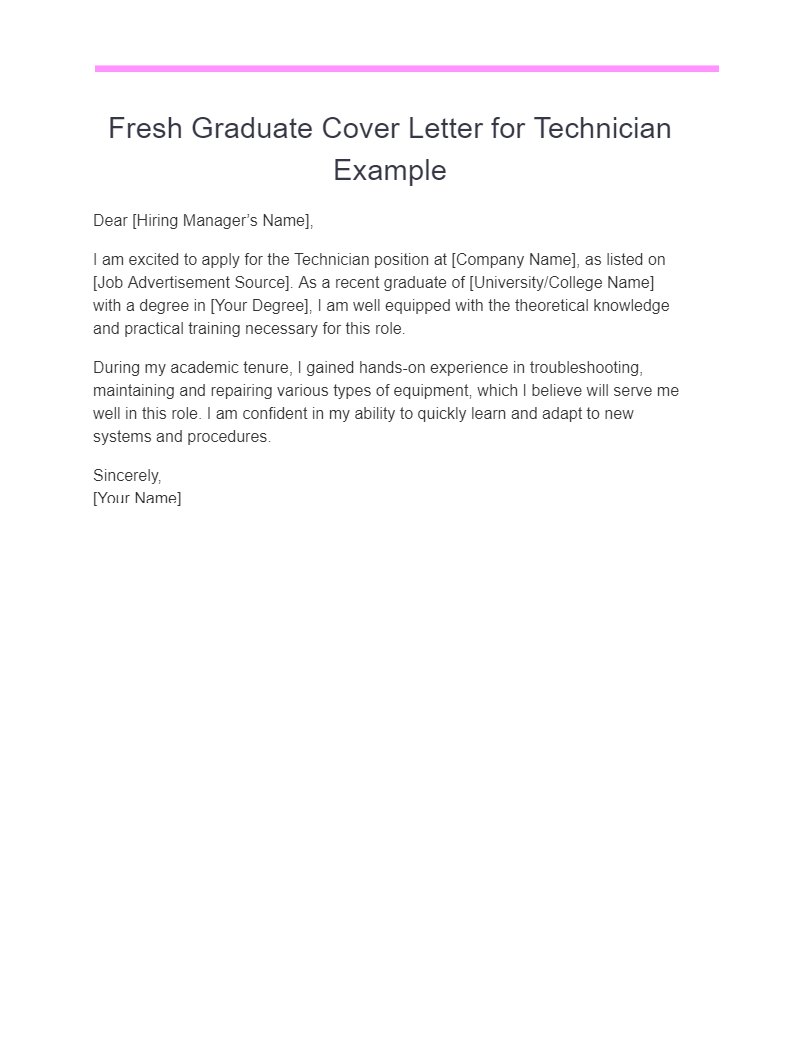
Fresh Graduate Cover Letter for IT Job Example
An IT job cover letter would showcase software and hardware knowledge, problem-solving skills, and relevant academic achievements. Here’s an example:
I am thrilled to apply for the IT Specialist role at [Company Name], as advertised on [Job Advertisement Source]. As a recent graduate of [University Name] with a degree in Information Technology, I am excited to apply my skills in a practical setting.
During my studies, I excelled in my coursework on networks, databases, and user support. I also gained practical experience through an internship at [Company Name], where I honed my problem-solving skills and learned to provide excellent customer service.
How to Use: Replace the placeholders with your specific details. Be sure to emphasize any coursework, internships, or skills that are relevant to the role you’re applying for.
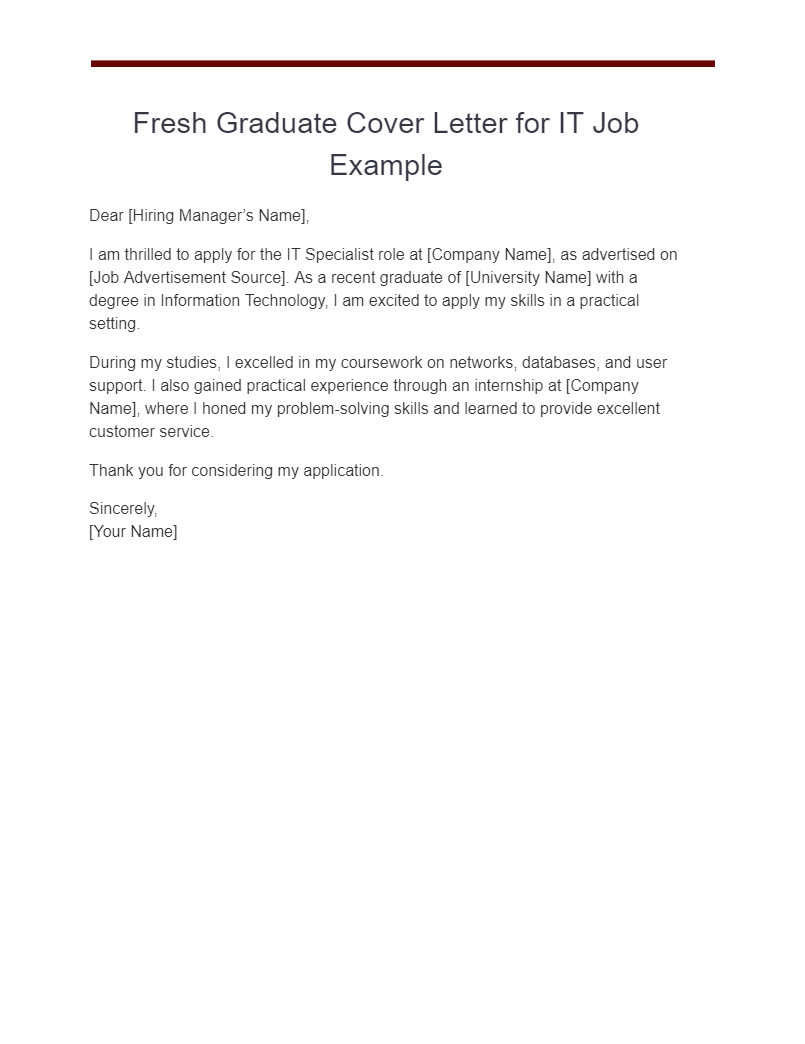
Recent Graduate Cover Letter Example
A recent graduate can highlight their academic achievements, eagerness to contribute, and transferable skills. Here’s an example:
I am excited to apply for the [Job Title] role at [Company Name], as listed on [Job Advertisement Source]. As a recent graduate of [University Name] with a degree in [Your Degree], I am confident in my ability to make a meaningful contribution to your team.
Throughout my academic career, I have consistently demonstrated a strong work ethic, critical thinking skills, and the ability to meet deadlines. I am eager to apply these skills in a professional setting and believe I would make a valuable addition to your team.
How to Use: Fill in the placeholders with your personal details. Be sure to emphasize your strengths and any skills or experiences that make you a strong fit for the role.
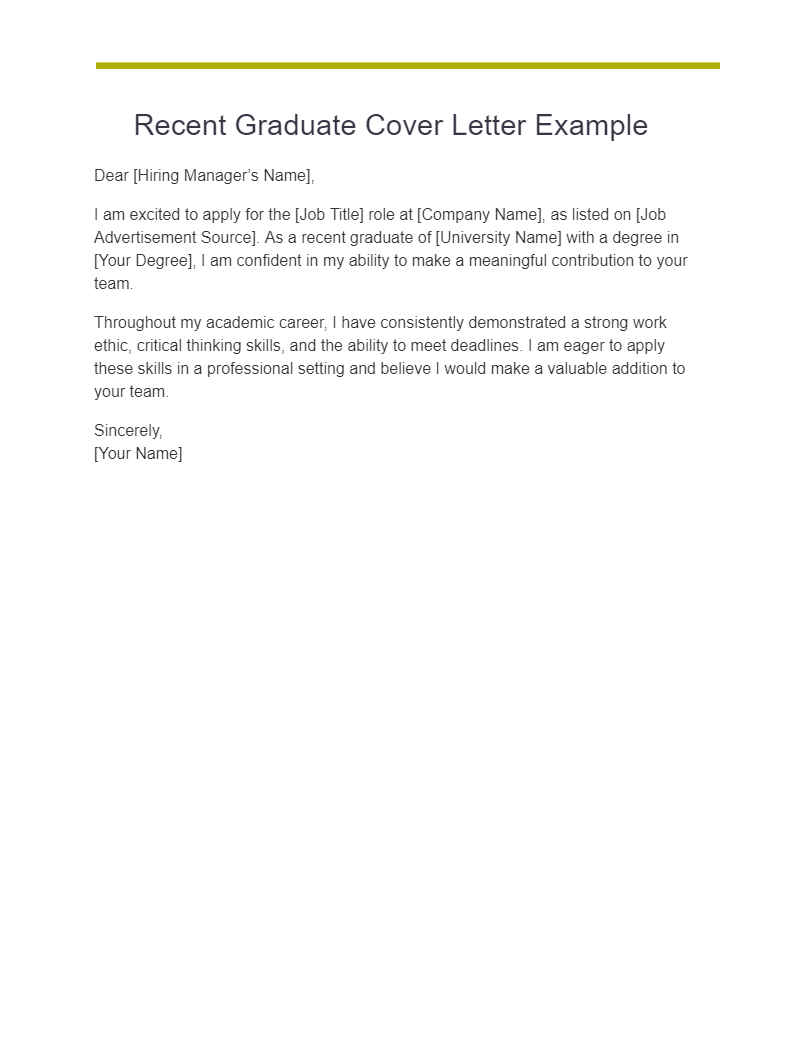
Fresh Computer Science Graduate Cover Letter Example
A cover letter for a Computer Science graduate would highlight programming skills, problem-solving abilities, and project experience. Here’s a sample:
I am writing to apply for the [Job Title] position at [Company Name], as advertised on [Job Advertisement Source]. As a recent Computer Science graduate from [University Name], I have a solid foundation in data structures, algorithms, and software engineering principles.
I have honed my coding skills through a variety of group projects and independent work, using languages like Java, Python, and C++. Additionally, my experience as an intern at [Company Name] allowed me to develop my problem-solving skills and learn to collaborate effectively with a team.
How to Use: Personalize this letter by including the specific programming languages and tools you’re familiar with. Mention any internships or projects that provided practical experience.
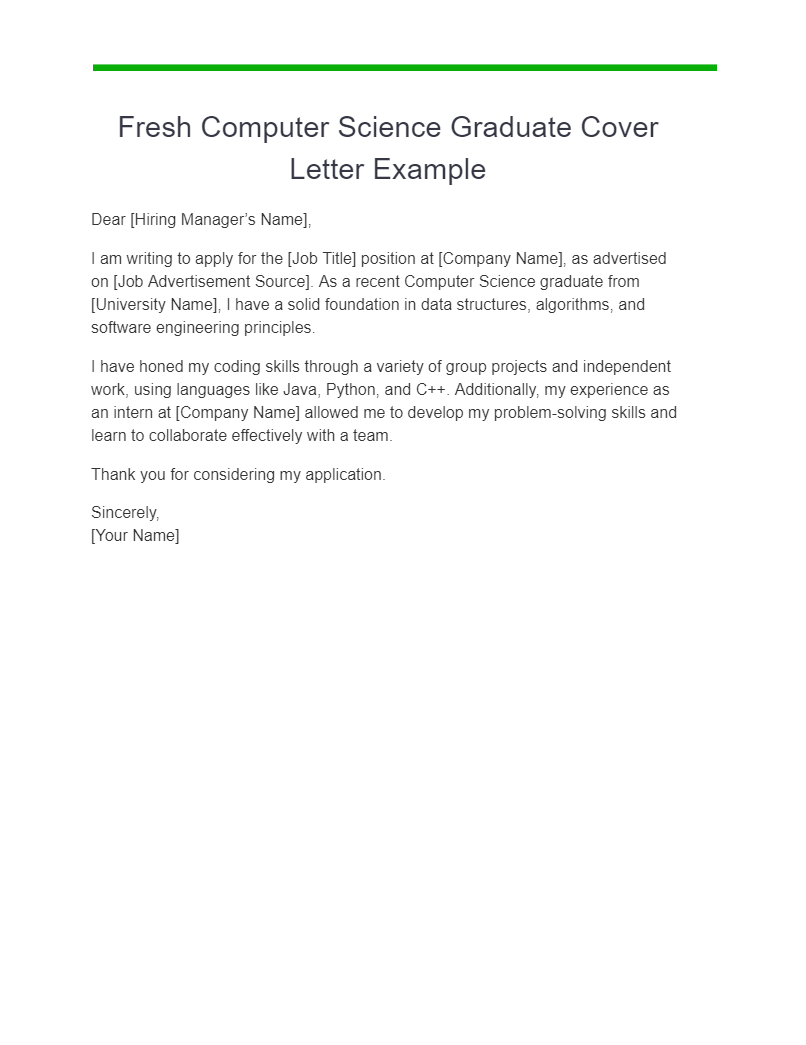
How do you Write a Cover Letter for a Fresh Graduate?
1. Start with a Formal Greeting: Address the hiring manager by their name, if it’s known. Otherwise, use a generic greeting like “Dear Hiring Manager.”
2. Open with Enthusiasm: State the position you’re applying for and express your excitement about the opportunity.
3. Highlight Relevant Skills and Experiences: Discuss your academic achievements, internships, and any skills that make you a good fit for the role.
4. Show Your Knowledge of the Company: Demonstrate that you’ve researched the company and explain why you’re interested in working there.
5. Close with a Call to Action: Thank the hiring manager for considering your application and express your interest in discussing the position further.
Tips for Fresh Graduate Cover Letter Format
1. Keep It Brief: Limit your cover letter to a single page.
2. Use a Professional Tone: Write in a formal, respectful tone. Avoid using slang or overly casual language.
3. Customize Each Letter: Tailor each cover letter to the specific job you’re applying for. Highlight the skills and experiences that are most relevant to the role.
4. Proofread: Ensure your cover letter is free of spelling and grammar mistakes. Consider having someone else read it over as well.
Writing a cover letter as a fresh graduate can be a challenging task. However, by carefully highlighting your academic achievements, skills, and enthusiasm for the role, you can make a strong impression on hiring managers. Remember to tailor each cover letter to the specific job you’re applying for and to proofread carefully.
Text prompt
- Instructive
- Professional
Write a cover letter for a college student applying for an internship at an educational technology company
Form a cover letter for a high school student seeking a part-time job at a local bookstore.
A business journal from the Wharton School of the University of Pennsylvania
Knowledge at Wharton Podcast
What does your writing style say about you, july 23, 2024 • 15 min listen.
Wharton’s Jonah Berger explains how writing style can predict future success.

Listen to the podcast.
Wharton marketing professor Jonah Berger discusses his published study, “ Topography of Thought ,” which was co-authored with Olivier Toubia , business professor at Columbia Business School. The paper examines how someone’s writing style can be indicative of their future success, and where generative AI might come into the picture.
Read an edited transcript below.
Studying How Successful People Think
Angie Basiouny: Give us an overview of this paper by way of explaining your title. What is topography of thought?
Jonah Berger: I don’t have to tell you that we all use language all the time. We write emails, make presentations, and submit job applications. We use language all the time. And language, in some sense, is a fingerprint. It reveals or reflects things about the people who produce it. You can predict how extraverted someone is, for example, based on the words they use.
But beyond the individual words people use, might the pattern of ideas they put out there, the way they organize their ideas, reveal something interesting about them and their likelihood of future success?”
I think it’s important to talk about what I mean about the pattern of ideas. When someone talks about something, they can cover a small amount of ground or a large amount of ground. If you ask someone about their work history, for example, they can talk about a variety of things they’ve done or a smaller set of things they’ve done. They can cover a lot of ground or a little bit of ground.
If you want to use an analogy here, you can almost think about going for a run. Someone can go for a run and go all the way around the city, or they can go for the same number of miles, but just go around the block a number of times. In both cases, they did the same distance, but they covered more ground in one than the other. So, one way we express ideas is the amount of ground we cover. We cover more ground with our ideas, or less. We can talk about more ideas, more topics, more themes, more things that are disparate from one another, or things that are related to one another.
But it’s not just that. It’s also the speed with which we move between adjoining ideas. Imagine a movie. It can cover more or less ground across the course of the movie, but it can also move faster or slower between ideas. If a movie has one scene, for example, that’s at the beginning of a wedding, if the next scene is the later part in a wedding, that’s related to the first part. Different things may happen, but it’s pretty closely related. But if you jump from a wedding to an action scene, that would be really different sorts of ideas. They’re not very related. They’re moving further across those two points.
We wondered if these two ideas, how much ground someone covers, and how quickly they move between ideas, might tell us something about their likelihood of future success.
Basiouny: You’re not talking about the length of the piece of writing. You’re not talking about whether it’s a 500-word essay or 1,000-word essay. It’s really about how they use that space to move through their ideas. Correct?
Berger: Yes, great point. It’s not about the length. It’s about the ground covered. Are they covering a lot of ground in their hundred or thousand words, whatever it is? Or are they covering less ground? Someone talking about their vacation could share 1,000 words, but they could use those words to talk just about the food they ate, or also to talk about the sights they saw and the places they visited. The former would cover less ground while the latter would cover more.
Basiouny: How did you go about studying this?
Berger: The same ideas can be applied to any type of content, but here we looked at college applications. In other work we’ve looked at online reviews, and in related work we looked at books, movies, and TV shows.
We took 40,000 college application essays from a variety of folks who were applying to school, and we looked at what they wrote and the topography of thought of what they wrote — how much ground they covered in that essay. Again, similar length, but how much ground they covered, and how quickly they moved between ideas. And we looked at their future success. How well did they do in school? What was their GPA once they got there? We were interested in seeing whether, not just the individual words they use, but the way they express ideas might that reveal something or predict how likely they are to be successful in the future.
The Essay Writing Style That’s Linked to Greater Success
Basiouny: What did you find?
Berger: We found two very important things. First, covering more ground, that notion of covering a broad range of things in the same amount of length, was linked to greater success. But doing so while moving rather slowly, was also important.
Think about the numbers arrayed on a circular clock. You could cover a lot of ground by moving in a circle, (e.g., going from 12 to 1 to 2 to 3 to 4) or by traversing the same ground but going from like 12 to 6 to 1 to 7 to 3 to 11. You’ve covered the same amount of ground, but you’ve taken a much longer route between each individual point.
What we found is that folks who are successful in school are able to blend these two things that might seem mutually exclusive. It might seem like covering a lot of ground requires moving really quickly between points to get there. But folks that end up doing well in school figure out a way to cover that ground really efficiently. They’re able to do so by moving slowly between these points, and they don’t have to take a lot of big jumps along the way.
Basiouny: In this paper, you controlled for some socioeconomic factors. Can you talk about that a little bit?
Berger: Yes, so someone could wonder, “OK, so you’ve found that people did well in school, and you’re using writing as a way to indicate how they think. But does it indicate something else?” Maybe it’s just that people who do better on the SAT also have higher grades and also tend to write a certain way. Maybe it’s that people who have parents who are more educated tend to write a certain way and also do better in school. Or maybe people who have parents who are more educated can afford to pay for an essay consultant who helps them write a certain way and also helps them do better in school.
So, we controlled for a variety of different things. We controlled for what they wrote about. Maybe certain types of people tend to write about certain types of things, rather than other types of things. Maybe it’s not about how they write, it’s about what they wrote about — the topics or themes they discussed. No, it wasn’t that.
Maybe it’s parents’ education. No, we controlled for that. Maybe it’s SAT scores. No, we can control for that. What this suggests is that the topography of thought goes beyond things related to just socioeconomic factors or family background. It’s not just that people who might have had wealthier families, for example, tend to write a certain way or have application consultants and do better in school because they get tutoring. No, it really suggests that writing reveals something about the way we think, which can reveal or predict our likelihood of being successful in the future.
Implications Beyond College Essay Writing
Basiouny: There are other critical forms of writing that we do every day in business, like cover letters, resumes, a press release, communications to the C-suite. Can you take this research and translate it into a business context?
Berger: What I find fascinating about these ideas is yes, we looked at the case of college application essays, but it doesn’t have to be only about application essays. These same ideas should apply more broadly to a variety of contexts, whether it’s a cover letter that someone writes, whether it’s an online review that someone puts together, whether it’s the emails they write at the office — all these things provide insight into who people are and what they’re likely to do in the future. I think on a previous episode that you had me on, I talked about a paper I loved recently, where they can tell whether someone is going to default on the loan or not by the language they use in their application. Similarly, you can predict whether someone is going to get promoted or fired or leave a job for a better opportunity elsewhere based on the language they use in their email.
Most of this work that I just mentioned is using individual words, but I think what our work suggests beyond the individual words someone used, you can get insight into who they are, how they think, and how well they’re going to do in the future, based on the pattern of ideas that they have or their topography of thought.
Basiouny: As a manager, it gives you an indication of how they might move through their physical work or their knowledge work, right?
Berger: Yes, one thing we’re looking at right now is, as people learn more, does that change the way their topography of thought looks? Obviously, as we gain more knowledge in a given domain, we may talk differently. We may think about ideas differently. One thought we have is, “Hey, if people who are able to cover a lot of ground really efficiently by moving slowly between points, how did they get there? Are they naturally that way?” Probably not. They may have gained more knowledge along the way that allows them to represent their ideas differently.
One thing we’re doing right now is looking at online forums where people write multiple reviews over time. Someone, for example, might write hundreds of wine reviews over the years. They’ve learned more about wine years later. We’re looking at how do they represent ideas differently as they gain knowledge? And that may help us understand why people who represent ideas certain ways end up doing better.
Humans Still Write Better than ChatGPT and Gen AI — For Now
Basiouny: ChatGPT and artificial intelligence have entered the conversation. People have access to these free tools that can help them perfect their cover letters and written business communication. How does this change things? We can’t really tell how good someone’s topography of thought is if they have an AI-assisted piece of writing. What do we do?
Berger: Yes, so I’d say a couple of things. I agree with much of what you said, except one word. I’m not sure they allow you to “perfect” your writing. At least at the moment. What they do is allow you to write something pretty good quickly and easily. You give it a prompt, and it produces content that’s pretty interesting, does a pretty good job of doing something that might have been difficult for you to do.
And to a degree it uses your own content somehow. Like you could say, “Take my CV and use it to put together a cover letter based on my past experiences.” So that is based on you, and someone else’s might look different, to the degree that their CV is different, but I wouldn’t say it necessarily perfects anything. At least at the moment.
Certainly, tools like ChatGPT and others have made the production of content much easier, and I can imagine a time down the road where we do use them for many tasks, rather than writing ourselves. But I still think there is a lot to be understood about how language reflects the people that produce it and how to write more effective content, based on understanding what makes language impactful.
More From Knowledge at Wharton

Vera Bradley CEO: Company Rebrands Need to Reset the Brand Health

Ciara Dilley, VP of Marketing for Global Brands at PepsiCo

Marketplace Dignity: The Hidden Driver of Customer Engagement
Looking for more insights.
Sign up to stay informed about our latest article releases.

IMAGES
VIDEO
COMMENTS
Use a proper salutation. Begin your college application letter with a formal salutation. The standard, in this case, is "Dear". Be sure to avoid informal salutations such as "Hey", "Hi", and "Hello". 💡 Tip: Do your best to personalize your university application letter in every way that you can.
How to Write University Admission Application Letter. Some writing tips to help you craft a better application: Start with your personal information including your full name, address, the date, and the recipient's address. Open the letter with a formal salutation, addressing the admissions committee or specific admission officer, if known.
University Application Letter Example Template. Dear Admissions Committee, I am writing to express my enthusiastic application for the [Program Name] at [University Name]. My interest in [Subject or Field of Study] was sparked by [brief personal anecdote or experience that ignited your passion in the field].
Example 3: Dear Admissions Committee, I am applying to [Name of University] to pursue a degree in [Field of Study]. I have a genuine interest in [Field of Study] and am looking forward to gaining knowledge and hands-on experience through the [Name of Program] program.
1. Write your name and street address. At the top of your cover letter, write your first and last name. On a separate line include your street address, followed by your city, state and zip code on another line. 2. Include the date. Below your contact information, write the date you plan on sending the cover letter.
The motivation letter is an excellent medium for speaking directly to the university committee and making a solid case for getting their thumbs up. That's why you have to put in the extra work and be sure to: Write simply, concisely, and from your heart. Exhibit all your strengths and skills related to your desired studies.
Tips for writing an application request letter for admission. Be focussed: Take your cue first from the prompts given in the application form; also research the program widely, looking for hints about its values and identity. What is the main stated question (e.g., why you will be a good researcher or lawyer, what experience you can bring to ...
1. School Name and Address. You college application letter should follow formal letter formatting guidelines, which include writing the full name of the college or university you are applying to in the upper left hand corner of the letter. Try to be as specific as possible with the address you choose to use. 2.
Key Takeaways. Purpose: Understand the role of a letter of interest in the university admission process.; Structure: Learn the essential components of a well-crafted letter.; Tips: Gain insights from personal experiences to enhance your letter.; Templates: Access three unique templates to guide your writing.
The motivation letter usually refers to an application letter you would write when applying for a university. ... You might also find motivation letters for university applications being called personal statement letters. But a motivation letter is not the same as a personal statement. The difference is in how long the letter is supposed to be ...
A successful cover letter for a university application should contain specific elements that demonstrate the applicant's qualifications, achievements, and passion for the program. These elements include: Addressing the letter to the appropriate recipient. Crafting an engaging introduction that captures the reader's attention.
Make sure the first couple sentences of your letter are interesting and engaging. Revise as necessary to capture the attention of the admissions board. First impressions matter a lot when you are competing with other qualified applicants. Next. slowly read every line of your letter paying close attention to grammar, punctuation and capitalization.
Edit the content and structure of your letter. Start by reading the letter aloud and having another person do the same. Make sure your letter addresses the topic or questions and then spell and grammar check your letter. Write the final draft and complete another spell and grammar check before you submit it. According to Indiana University, a ...
The letter of application is essentially a sales letter. In it, you are trying to sell your services and, in most cases, you will be competing with other applicants. Your immediate objective is to have your letter read by someone in the organization who has authority to screen job applicants; your ultimate goal is to obtain an interview.
Follow these tips to write an impactful essay that can work in your favor. 1. Start Early. Few people write well under pressure. Try to complete your first draft a few weeks before you have to turn it in. Many advisers recommend starting as early as the summer before your senior year in high school.
Follow these steps to compose a compelling application letter: 1. Research the company and job opening. Thoroughly research the company you're applying to and the specifications of the open position. The more you know about the job, the better you can customize your application letter. Look for details like:
At their most basic level, academic cover letters accomplish three things: one, they express your interest in the job; two, they provide a brief synopsis of your research and teaching; and three, they summarize your past experiences and achievements to illustrate your competence for the job. For early-career scholars, cover letters are ...
The header usually includes your name, occupation, address, phone number and email . 2. Greeting. The greeting line of a university application letter, also known as a salutation, is where you say your greetings. In a university application letter, don't go too inventive. A simple "Hey" is obviously ineffective.
Write down your personal information. Identify yourself at the beginning of your admissions letter. This means writing down your full name and address. Use the conventionally accepted address format, whereby you indicate the street address, state, city, and zip code. This way, the admissions officers reading your letter will have an idea of who ...
Options for Organizing an Admissions Letter. Judge by the clues on the application form and by the nature of the profession or discipline what kind of logical structure you could use to tie your points together into a coherent whole. You may see indications you are expected to demonstrate your personality, or be self-analytical, or enter into ...
Click on the choices section and enter the universities and courses you've decided to apply to. Once you've added them all, click on the 'confirm choices' button on the bottom left to mark the section as complete. Your application will be linked to your college, so if your referee is one of your teachers they'll enter their reference into ...
Use a formal closing. When you get to the end of your letter, add a space, then include a closing, like "Sincerely" and sign your name. [11] Sometimes, it's appropriate to type your name, then print out the letter and sign it in pen. That can be a nice touch. 5. Put your contact information in the header.
write a letter about your academic success. ii. Recommender type 2: you took a class with this professor, you speak regularly in class, went to their office hours, and have a good academic relationship with them. They can write a letter about your academics and your commitment to the subject. iii. Recommender type 3
Writing an essay is your chance to share your unique strengths, personal history, journey of growth, and any additional qualities that show you are a strong candidate. Preparing to write your essay Prior to starting your essay, read all prompts carefully. Take a moment to reflect on your reasons for pursuing a graduate business degree.
If you're applying for a job, you'll most likely need to prepare a polished résumé, to practice common interview questions, to request recommendations and references, and to write a cover letter.There are many types of cover letters out there. These include the application cover letter, the prospecting cover letter, and the career change cover letter.
To write an effective MBA recommendation letter, always introduce yourself and your relationship with the candidate. To strengthen the recommendation letter, it is always a good idea to use concrete examples to highlight their leadership, teamwork, problem-solving, and strategic thinking skills.
5. Is it necessary to address the letter to a specific person? If possible, address the letter to the scholarship committee or the person in charge of the selection process. It adds a personal touch to your application and shows that you have taken the time to research the scholarship provider. 6. How should I structure my motivation letter?
When our admission staff review your application, we are looking for solid writing skills to demonstrate your learning in your many years of English and writing classes. You do not need to write a novel, but do submit your best work! Good luck as you complete your application!
How to Use: Remember to replace the placeholders with your information and tailor the content to match the job requirements and the company's culture. Fresh Engineering Graduate Cover Letter Example. As a fresh engineering graduate, your cover letter should highlight technical skills, academic projects, and engineering internships.
These same ideas should apply more broadly to a variety of contexts, whether it's a cover letter that someone writes, whether it's an online review that someone puts together, whether it's ...